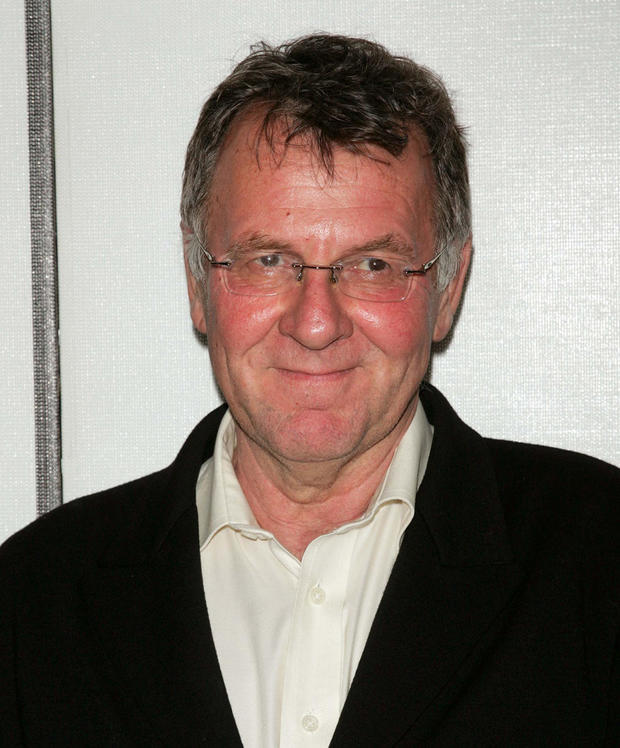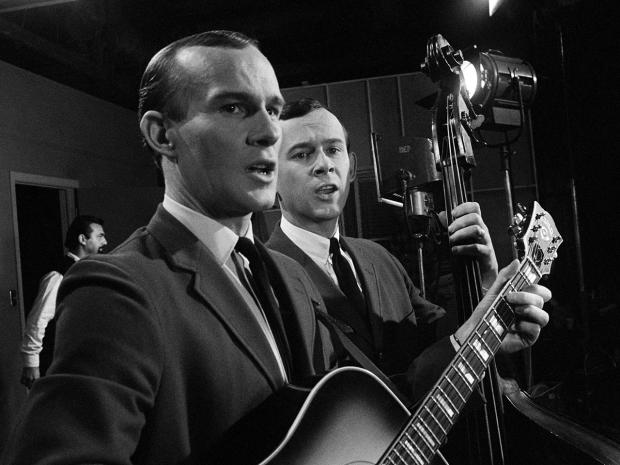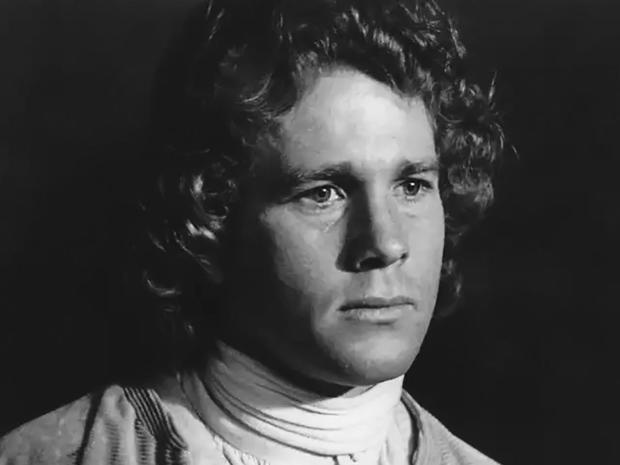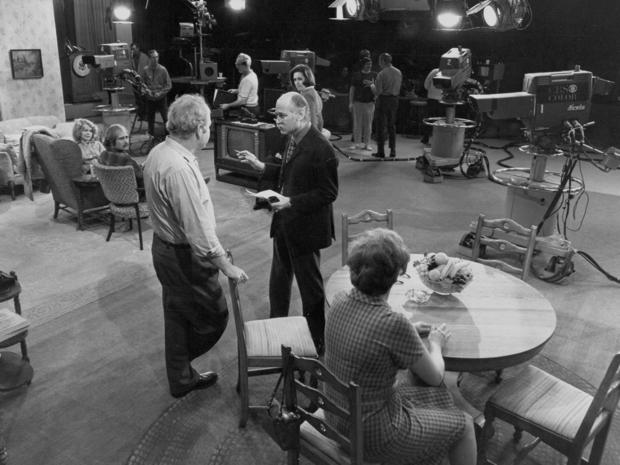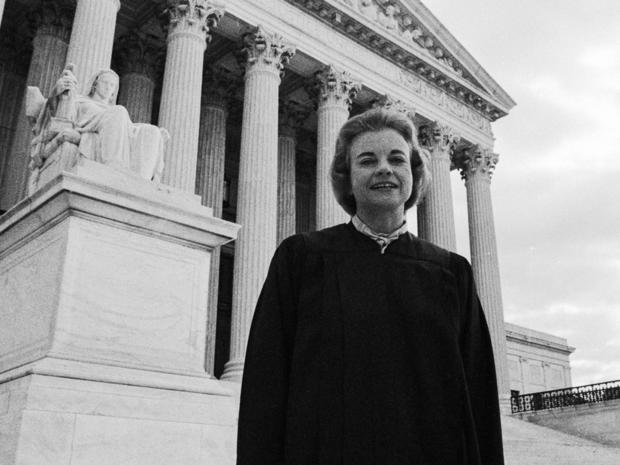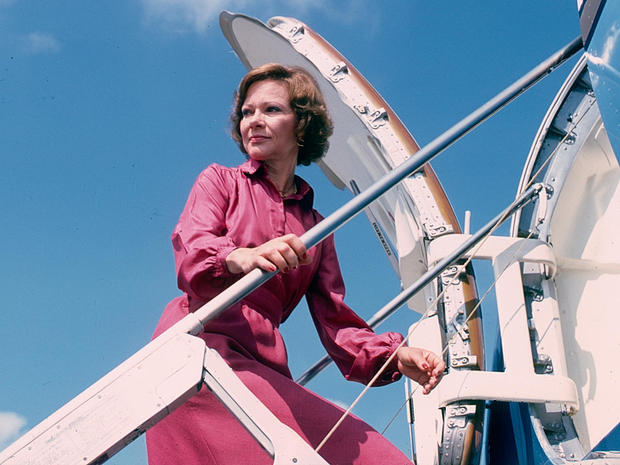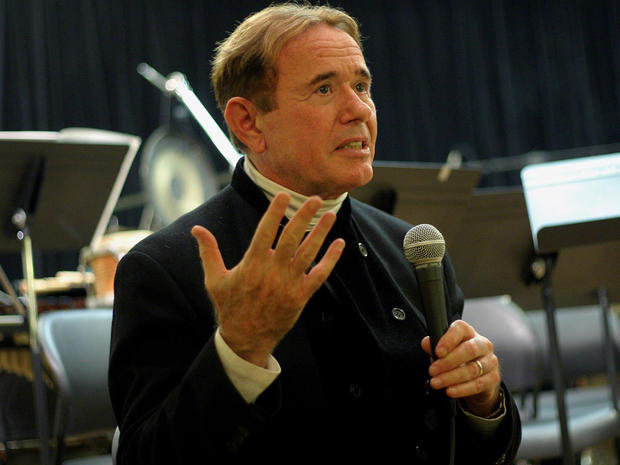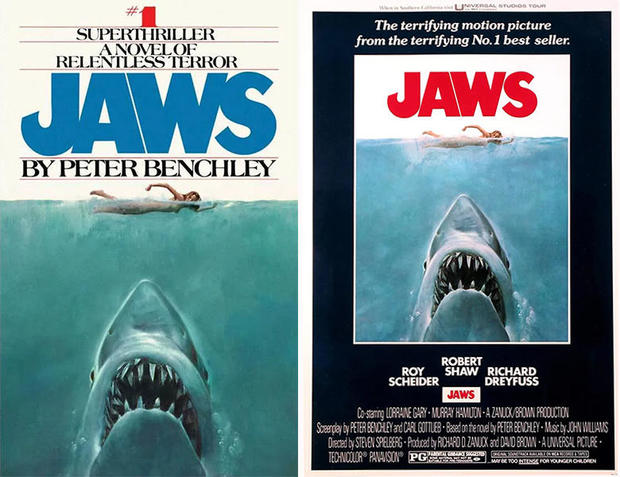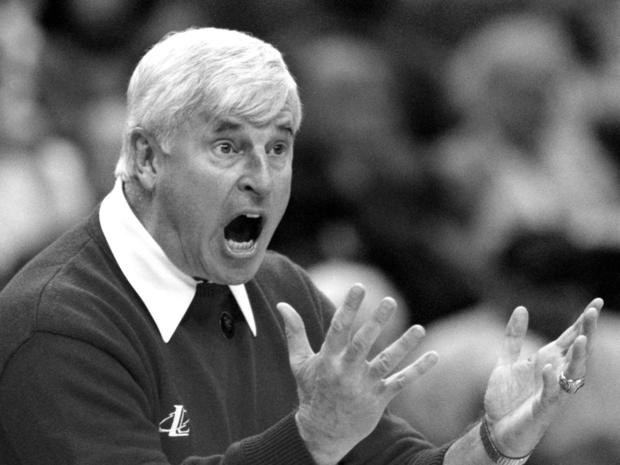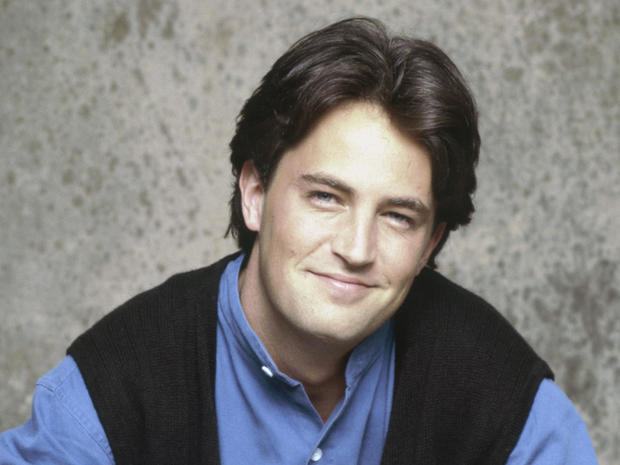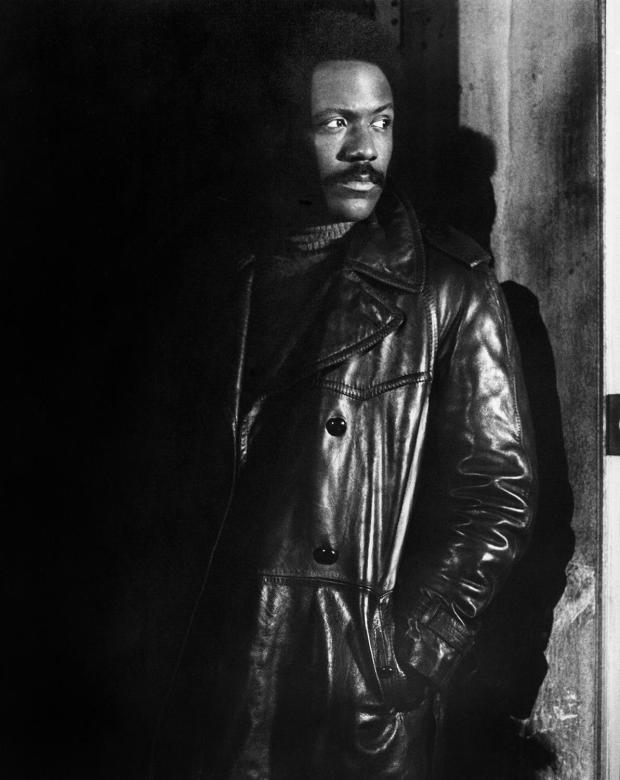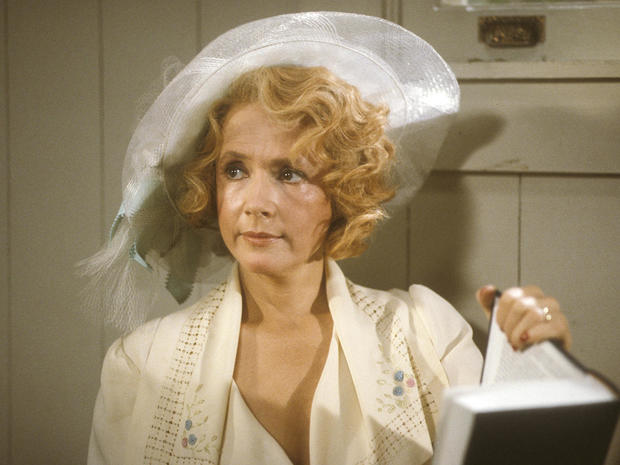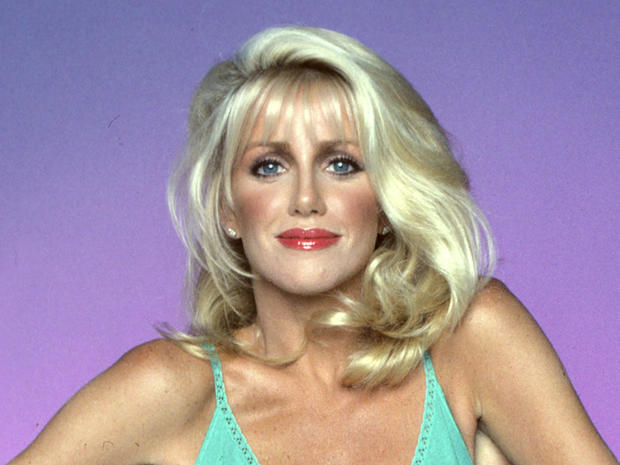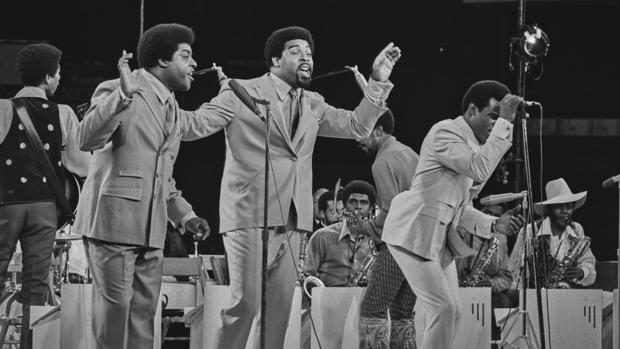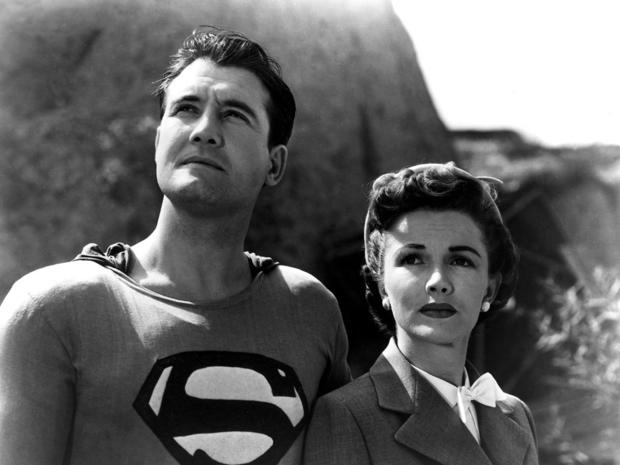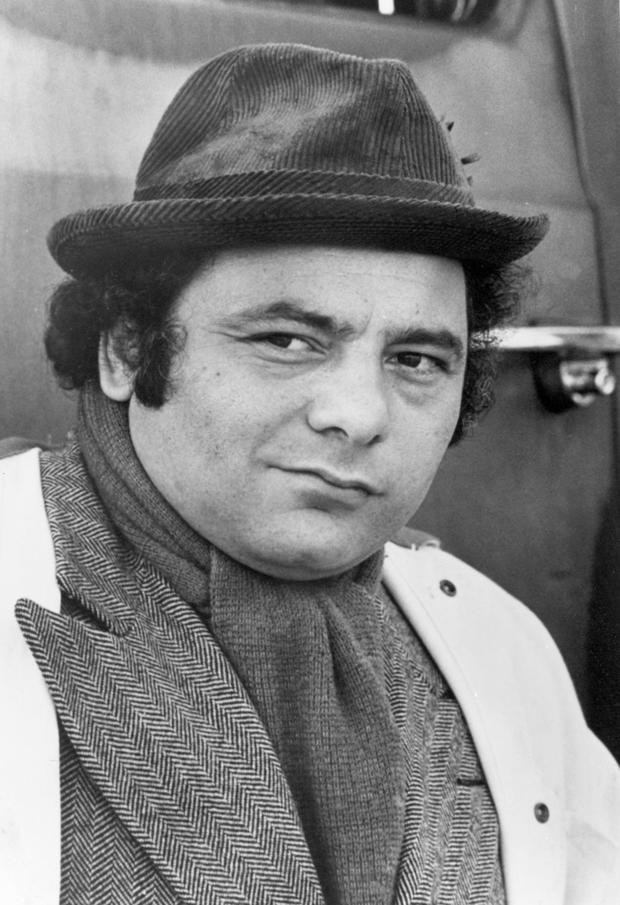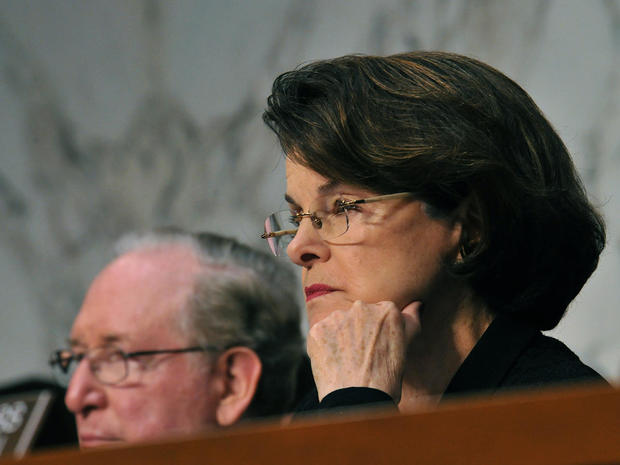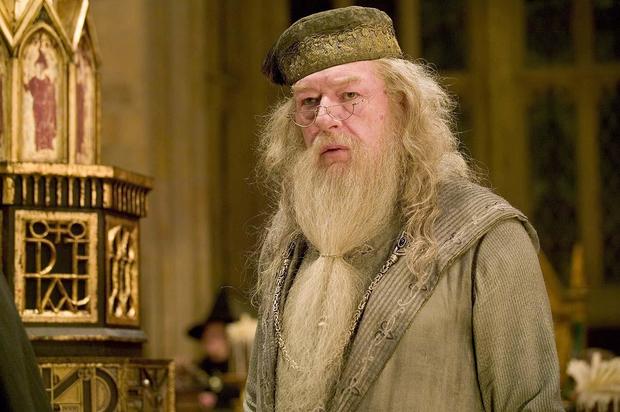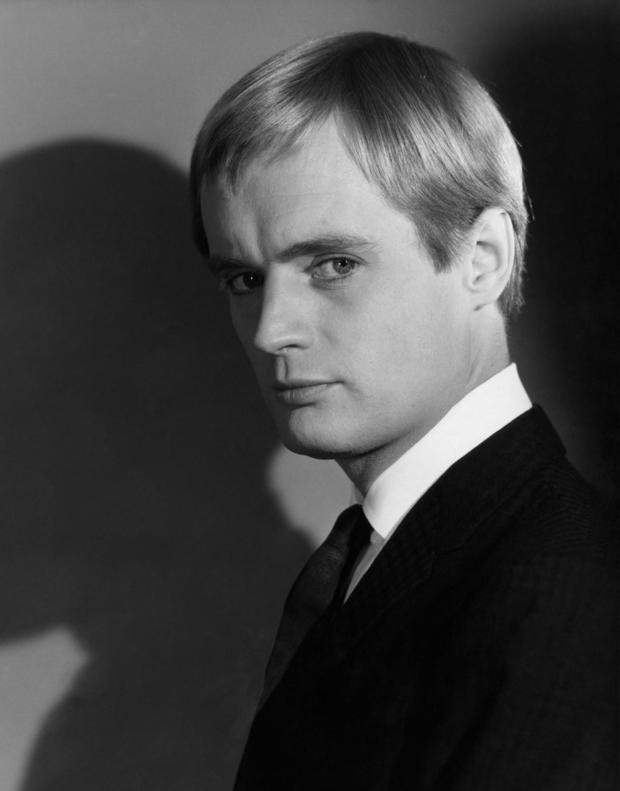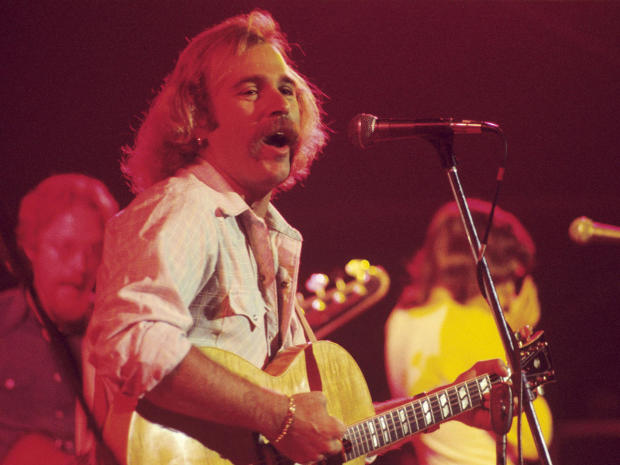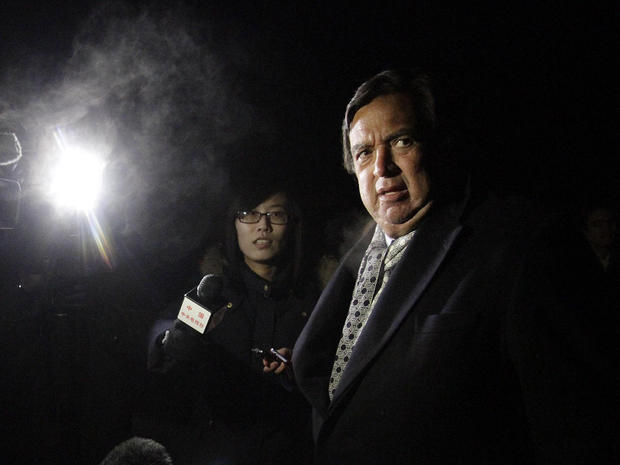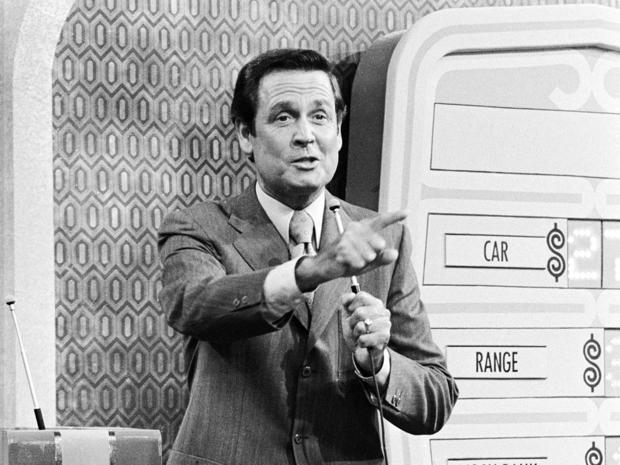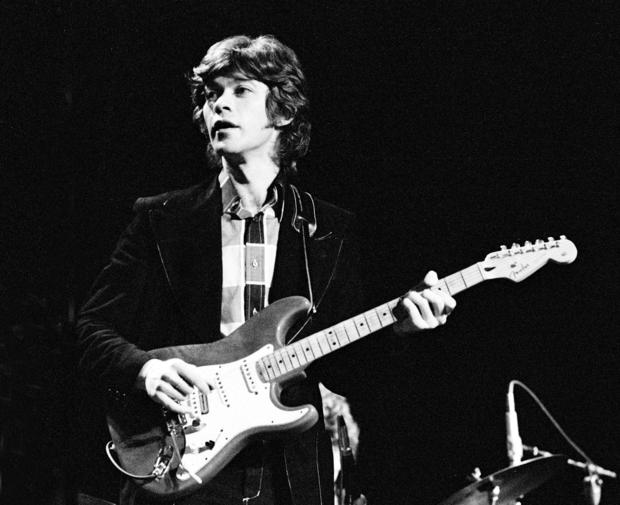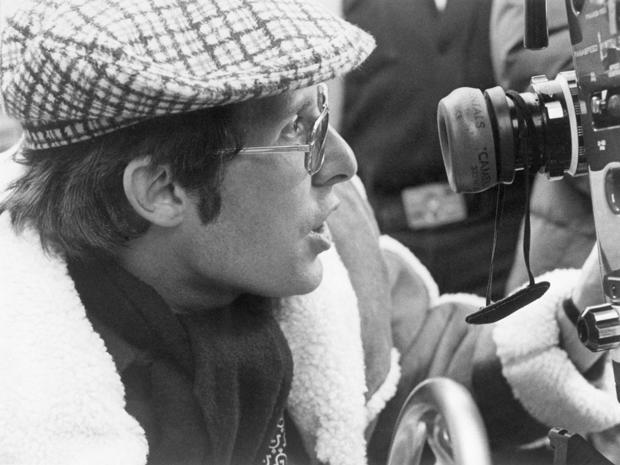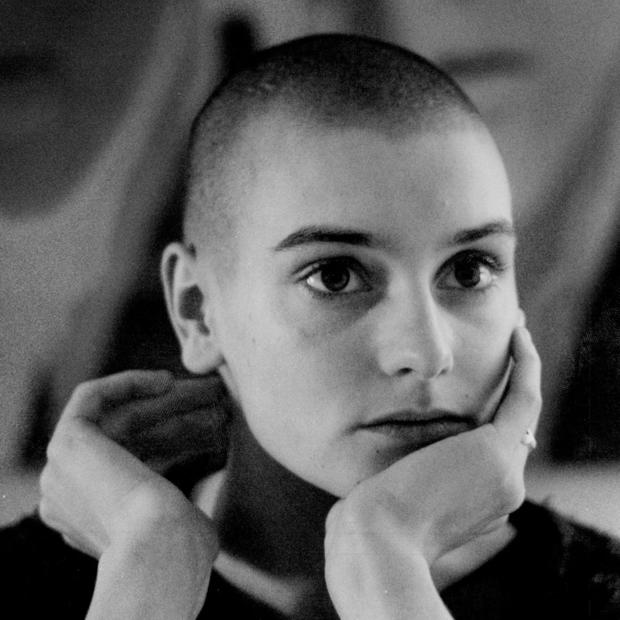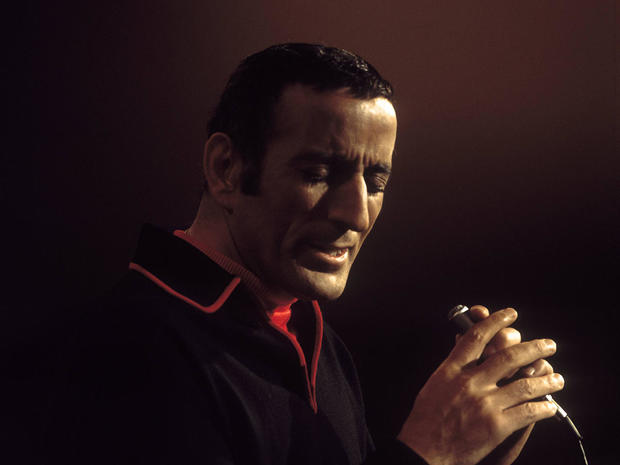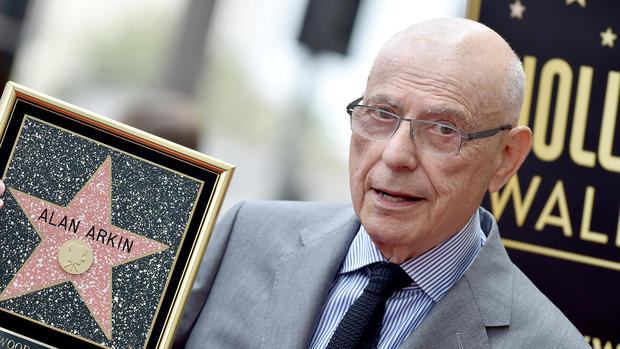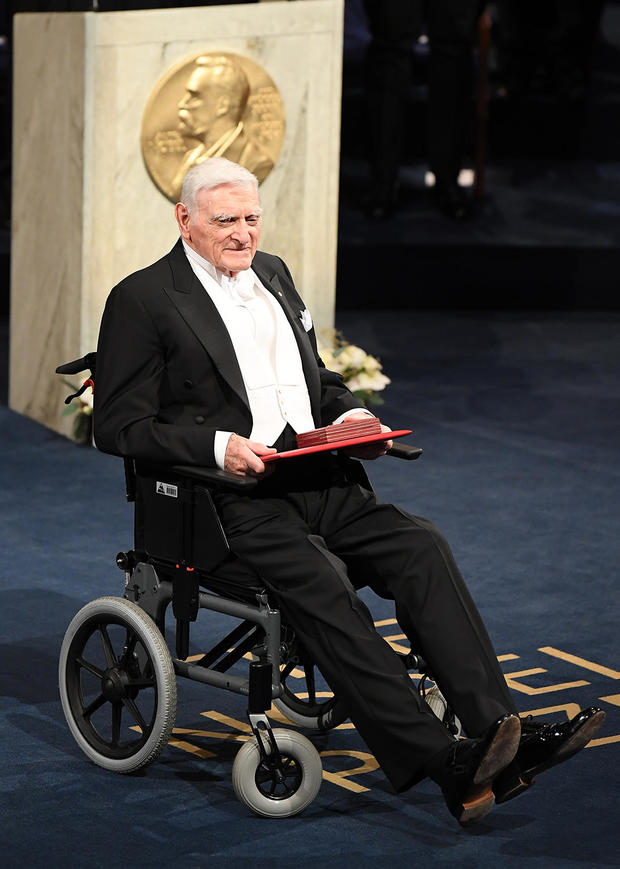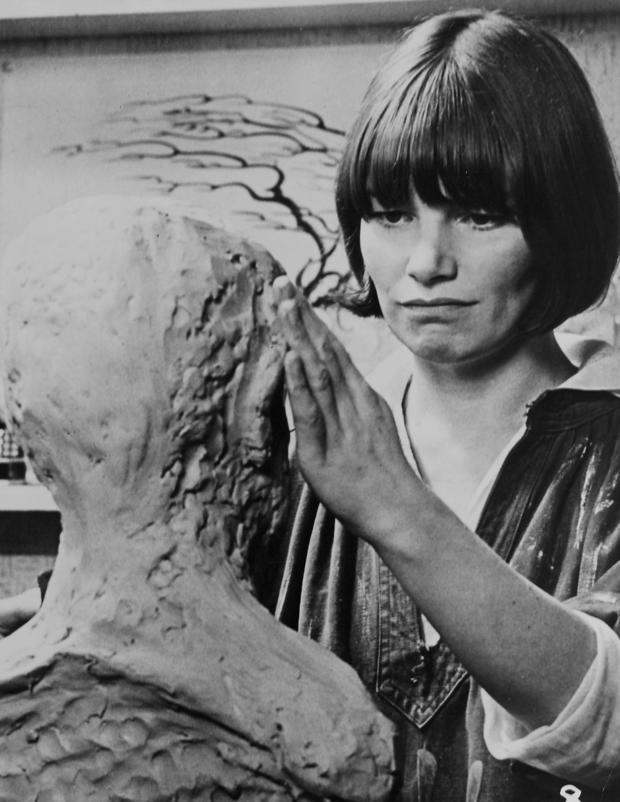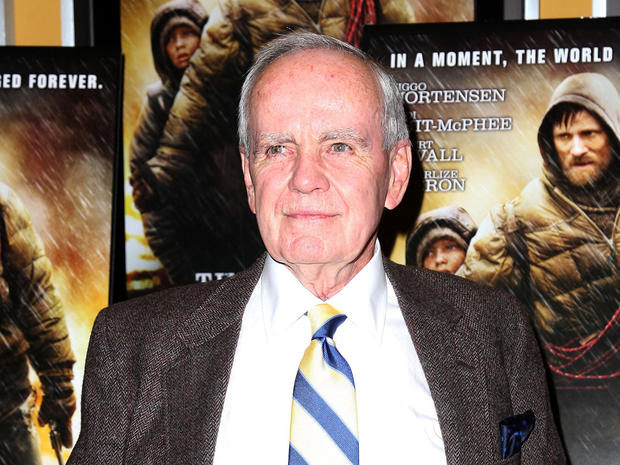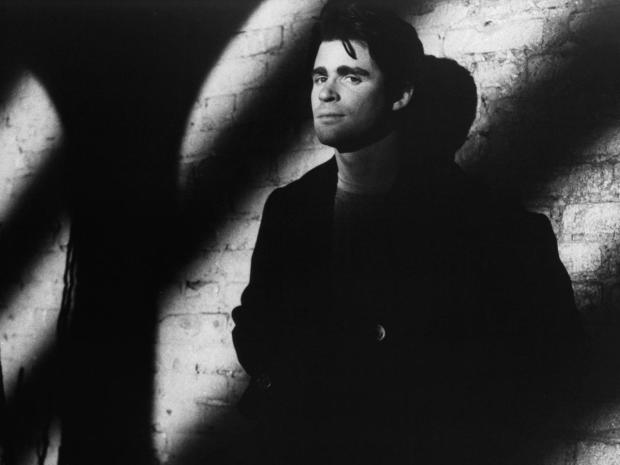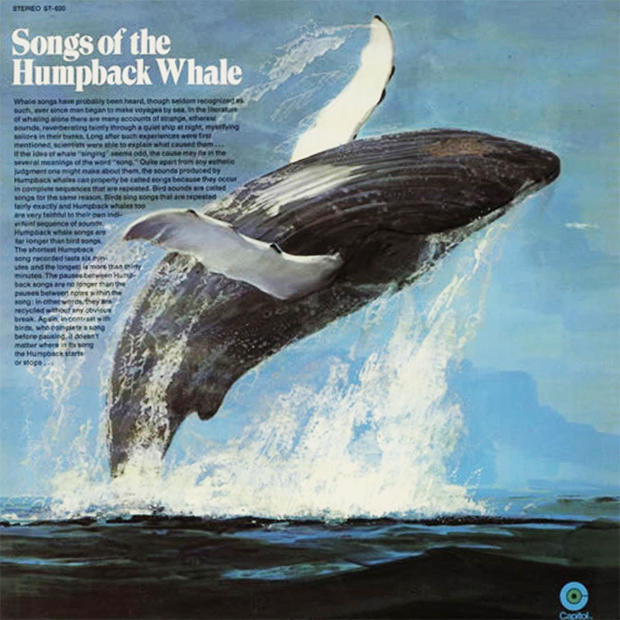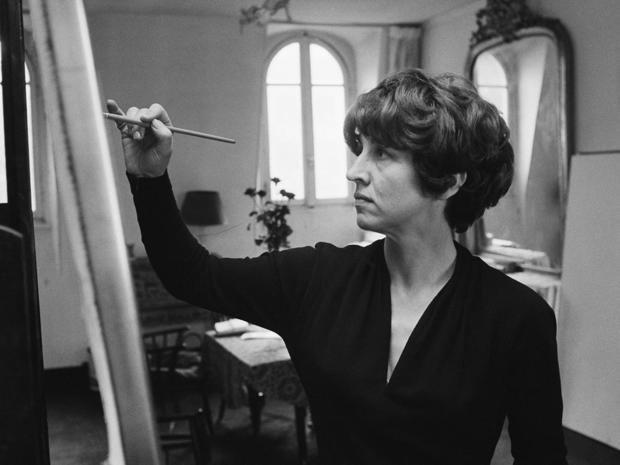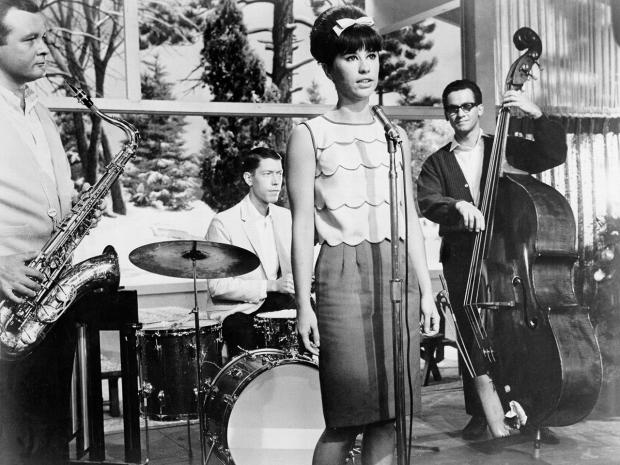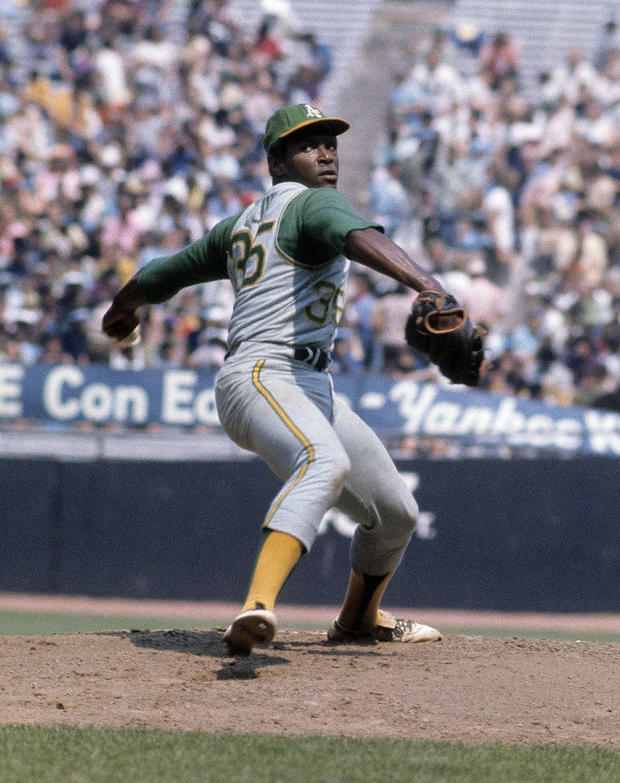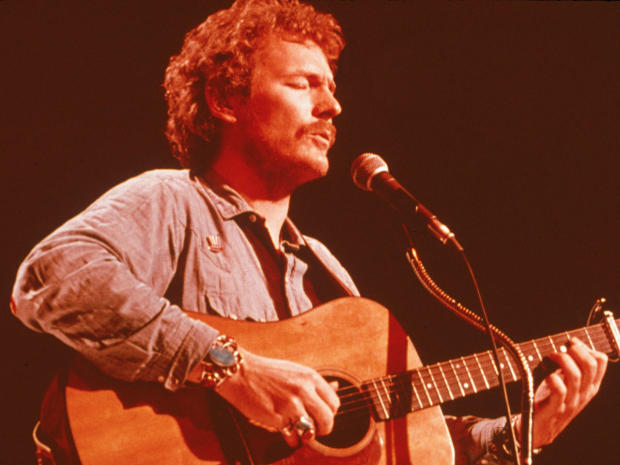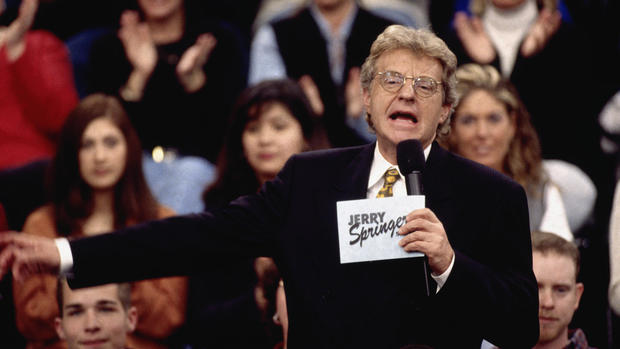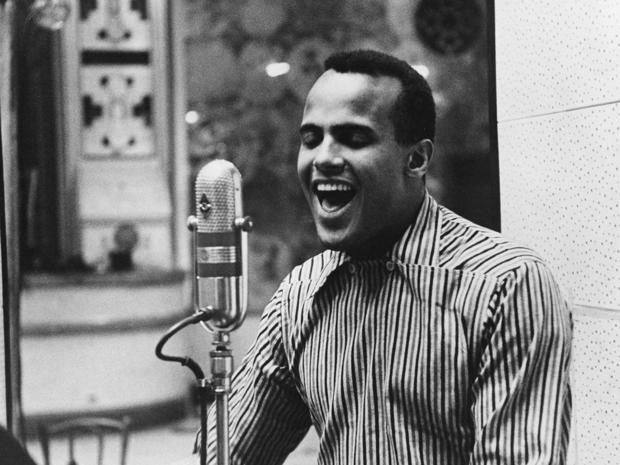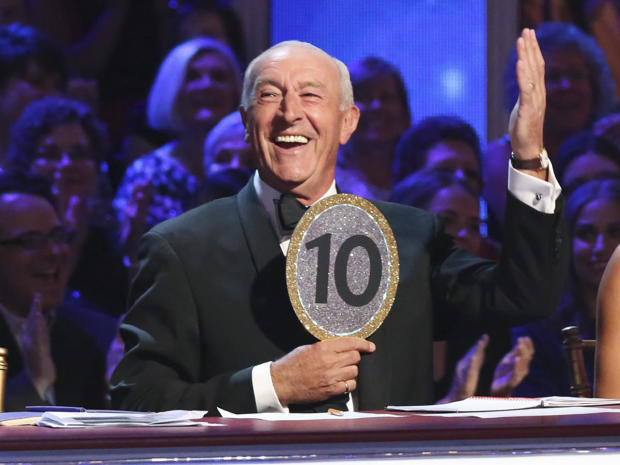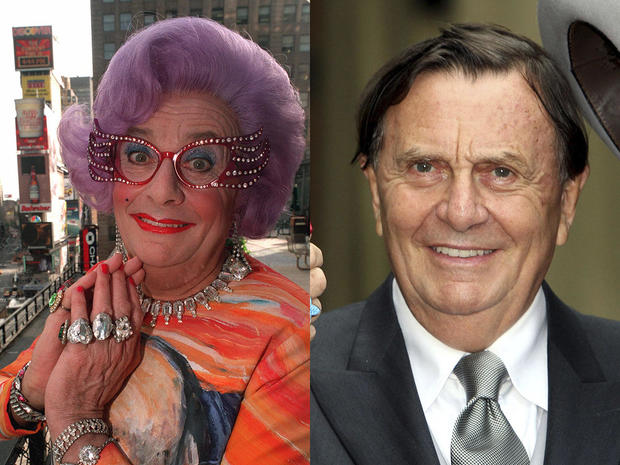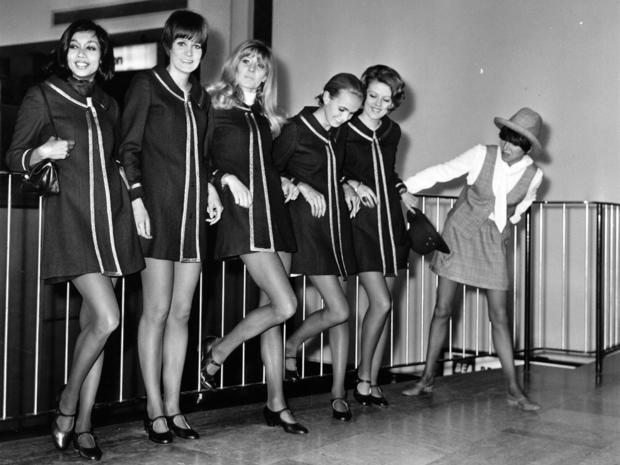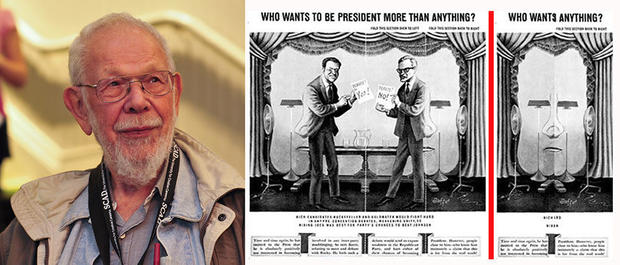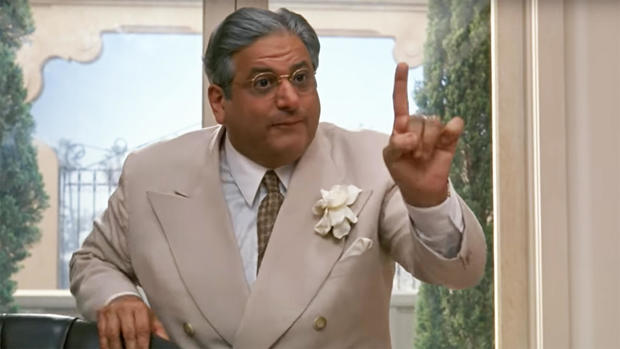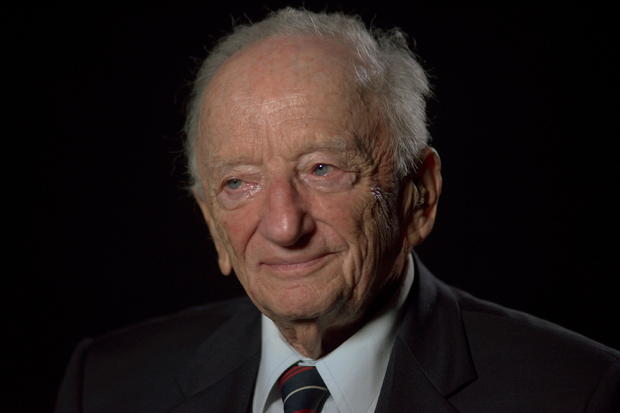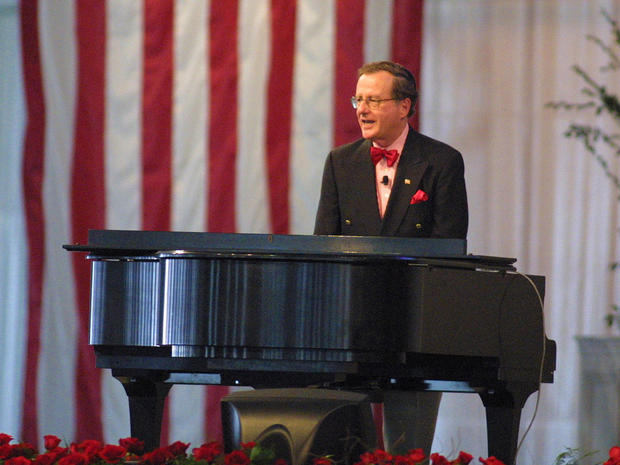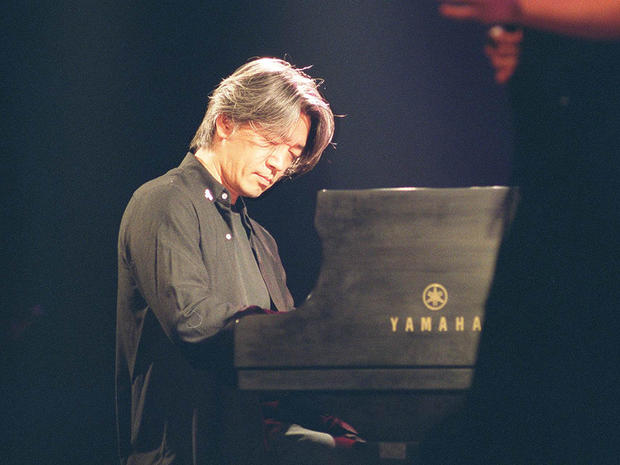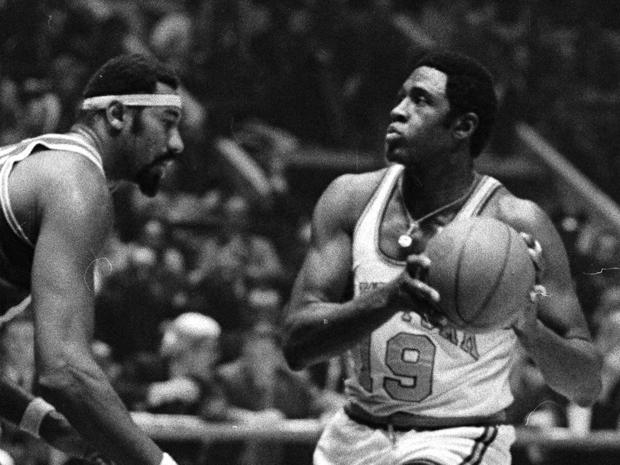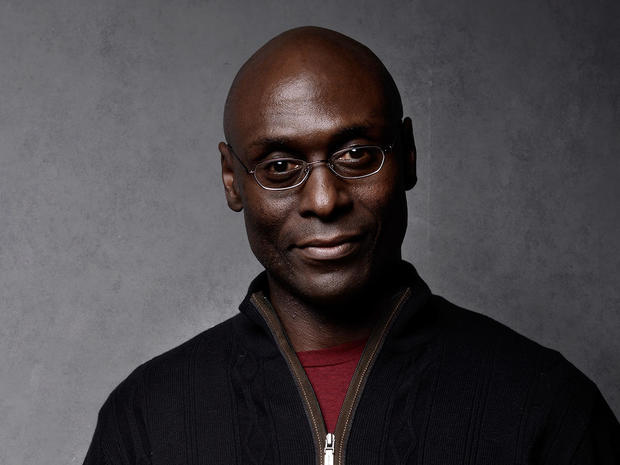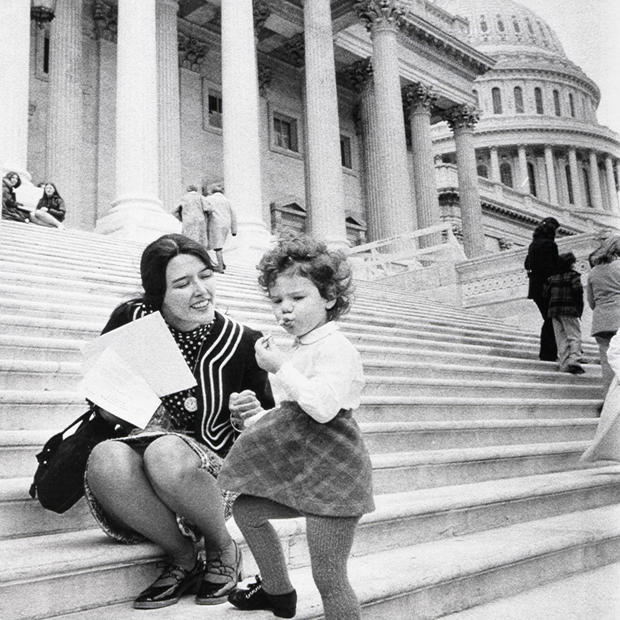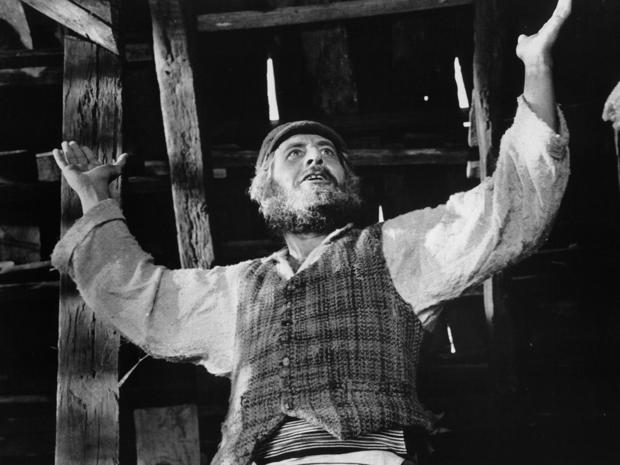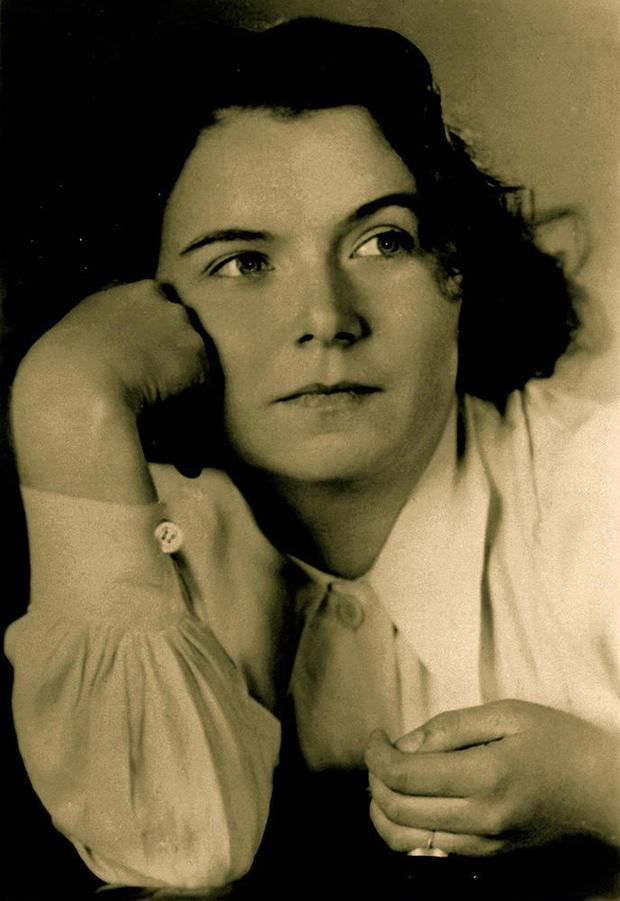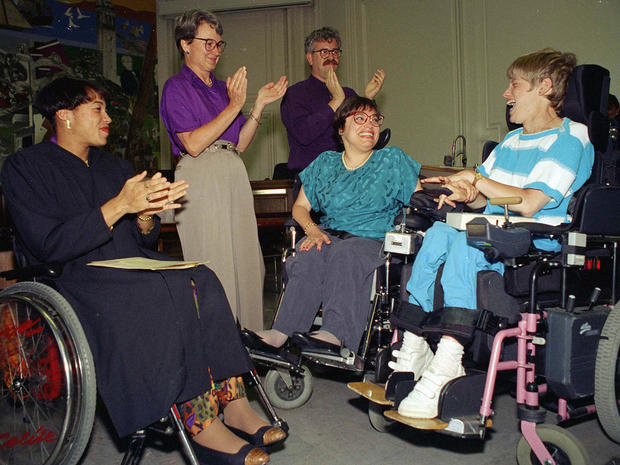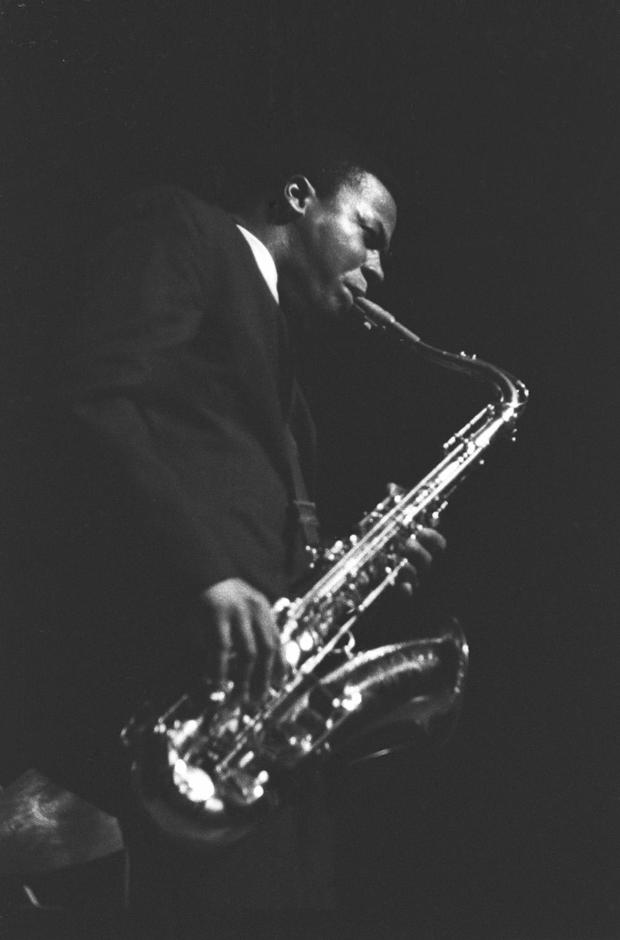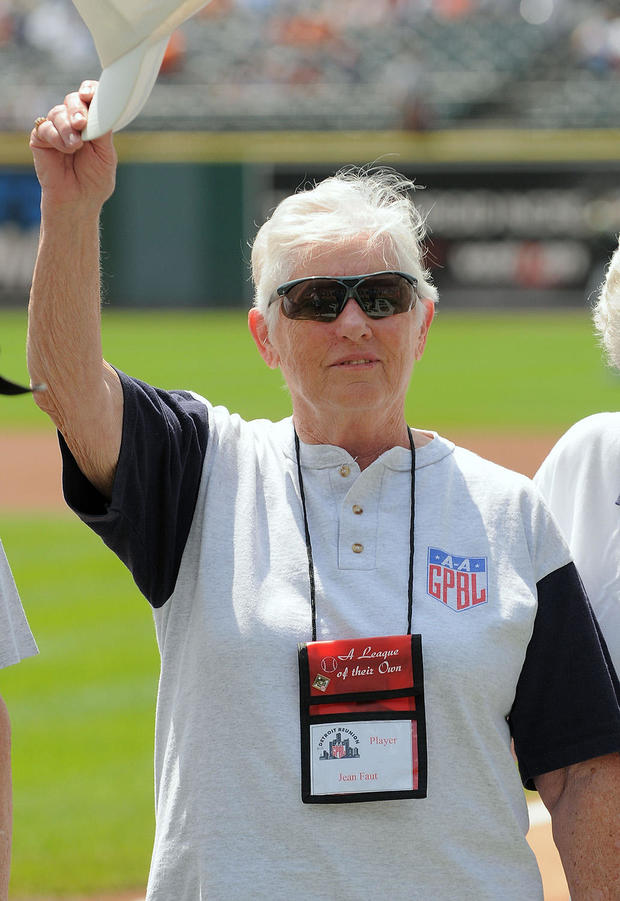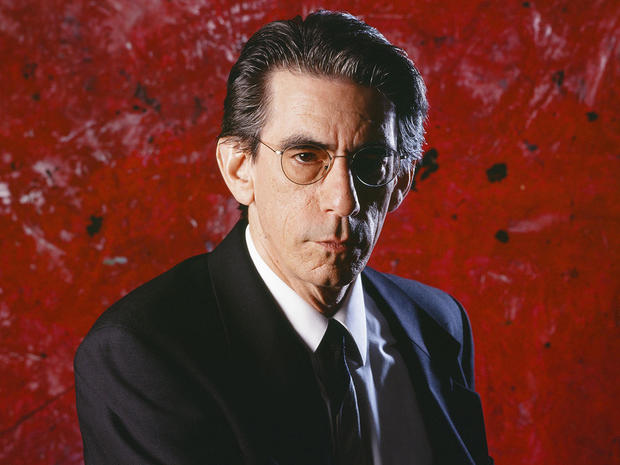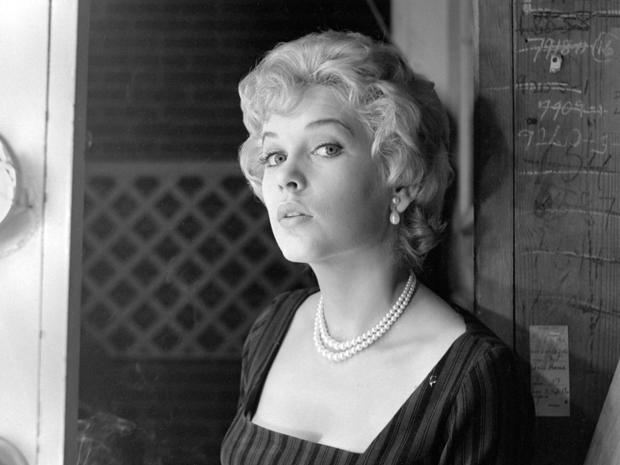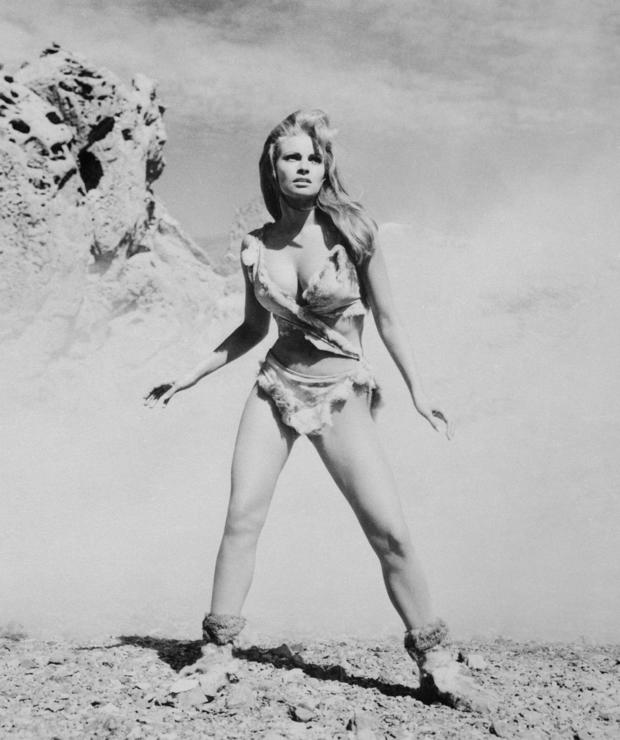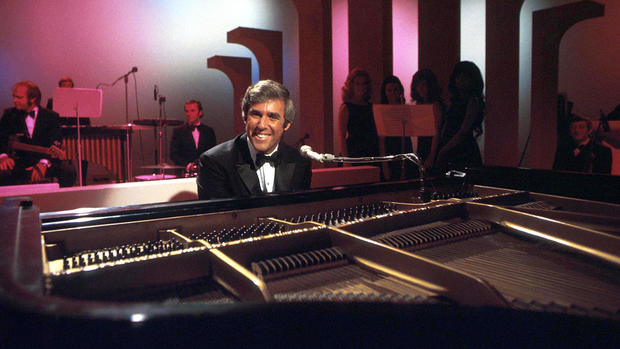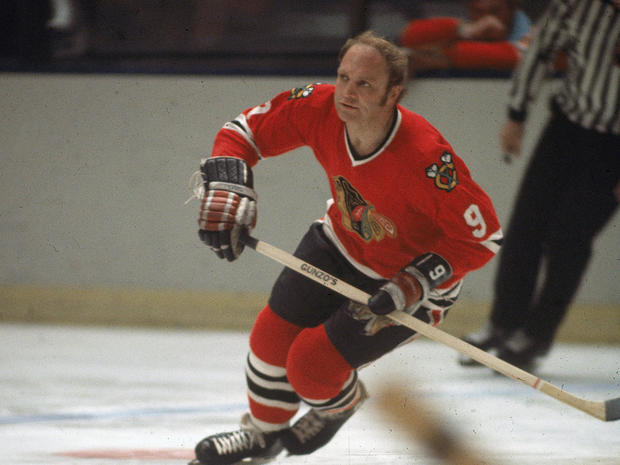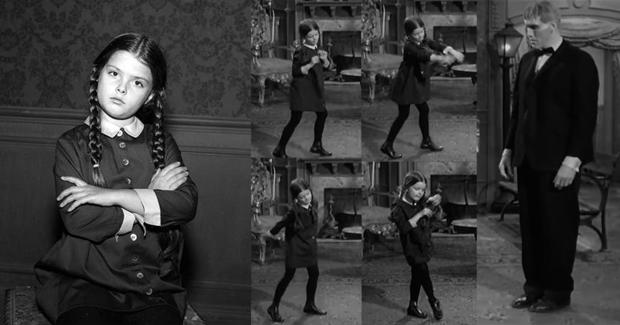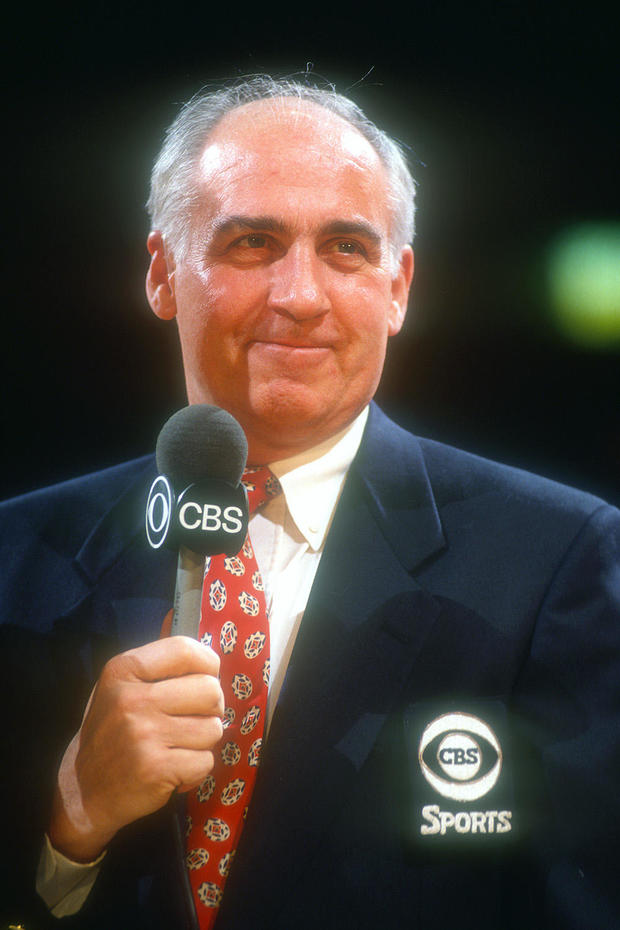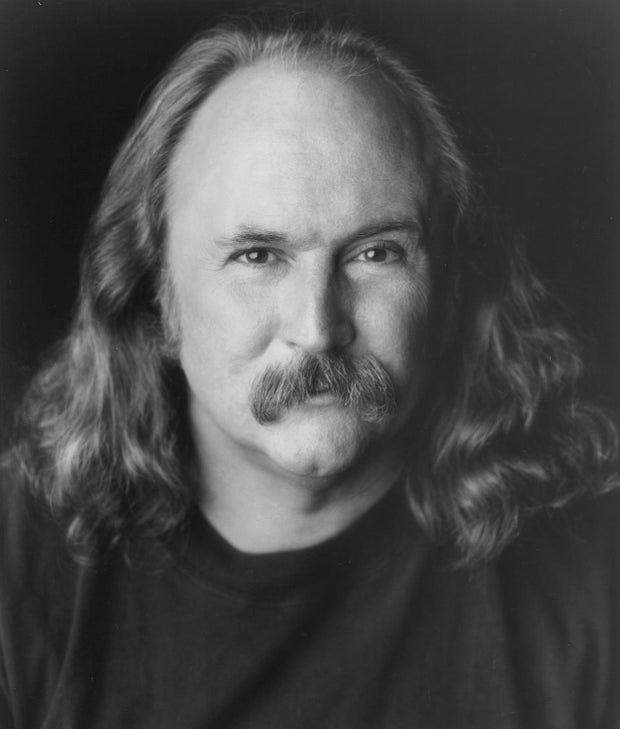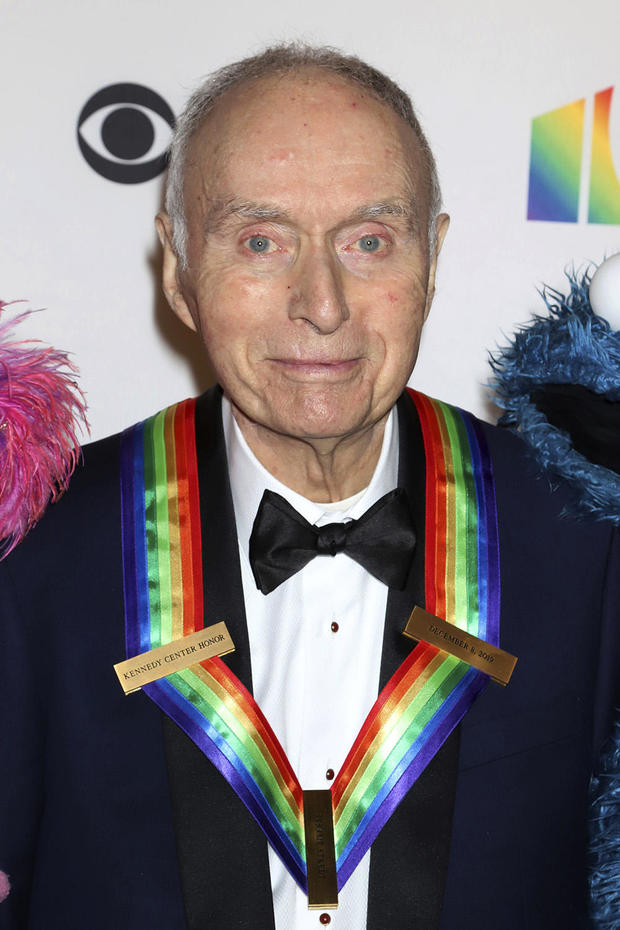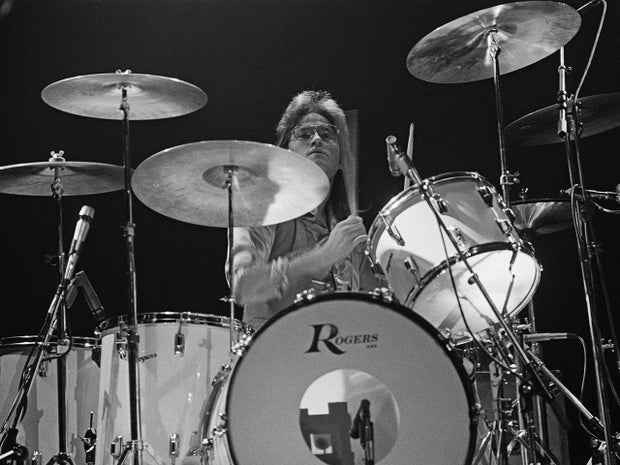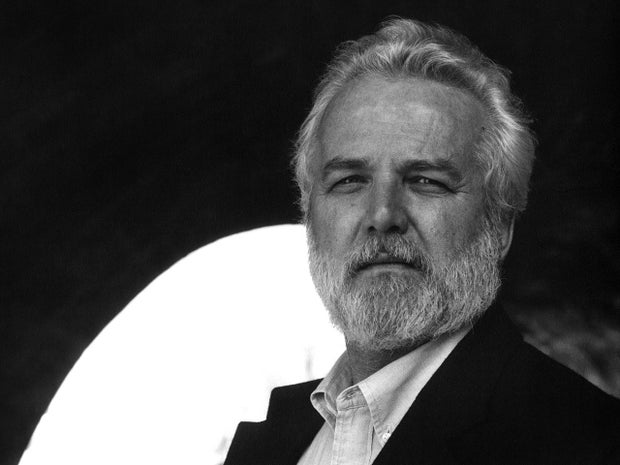Notable Deaths in 2023
A look back at the esteemed personalities who left us this year, who'd touched us with their innovation, creativity and humanity.
By CBSNews.com senior producer David Morgan. The Associated Press contributed to this gallery.
British actor Tom Wilkinson (February 5, 1948-December 30, 2023) was a scene-stealer of the highest order. Rarely playing a lead role, his characters infused the films he was in with gravity, tragedy and sardonic humor. He won an Emmy and a Golden Globe for his performance as Benjamin Franklin in the HBO series "John Adams."
Wilkinson earned a best supporting actor Oscar nomination for his performance in "Michael Clayton" (2007), as an attorney who appears to fall apart owing to his experience litigating a multi-billion-dollar class action lawsuit over a carcinogenic weed killer. His come-to-Jesus moment of clarity about his complicity sets off a chain reaction that threatens the high-priced law firm hired to clean up the chemical company's mess.
Edens (Tom Wilkinson): "I have blood on my hands."
Clayton (George Clooney): "You are the senior litigating partner of one of the largest, most respected law firms in the world. You are a legend."
Edens: "I'm an accomplice!"
Clayton: "You're a manic-depressive!"
Edens: "I am Shiva, the god of death."
He also earned a best actor Academy Award nomination for Todd Field's 2001 drama "In the Bedroom," playing a father grieving over the murder of his son.
A Yorkshire native born into a farming family, Wilkinson attended the Royal Academy of Dramatic Art, and appeared on stage and in such films and TV programs as "Sylvia," "Prime Suspect," "In the Name of the Father," "Sense and Sensibility," "The Ghost and the Darkness," "Oscar and Lucinda," "Martin Chuzzlewit" and "Rush Hour,"
Then came his breakout role, in the 1997 comedy "The Full Monty," as an unemployed steel mill foreman who seeks a new career as a male stripper. It was followed by "Shakespeare in Love," "The Patriot," "Girl with a Pearl Earring," "Eternal Sunshine of the Spotless Mind," "Batman Begins," "The Exorcism of Emily Rose," "Valkyrie," "The Debt," "The Kennedys," "The Best Exotic Marigold Hotel," "Mission: Impossible – Ghost Protocol," "Belle," "The Grand Budapest Hotel" and "Selma."
He recently reunited with "Full Monty" co-stars Robert Carlyle and Mark Addy in a Disney+ series of the same name.
Tom Smothers
Tom Smothers (February 2, 1937-December 26, 2023), one-half of the duo The Smothers Brothers, said they didn't think of themselves as comedians. "No, we thought of ourselves as folk singers," Tom told "Sunday Morning" in 2022.
But the pair – Dick playing bass and straight man, Tom (two years older) on guitar and cracking wise – were a hit with their late '60s variety show, "The Smothers Brothers Comedy Hour." With guest stars like comedian George Carlin and anti-war activist Pete Seeger, and a writing staff that included Steve Martin and Rob Reiner, the show was a counterculture hit that tweaked the powers-that-be, whether in the White House or at CBS' headquarters at Black Rock. With their charm and light banter of sibling rivalry ("Mom liked you best!"), they lampooned politicians, decried the war in Vietnam, and made fun of network censors. They were a hit almost instantly; within two weeks, they were beating the venerable "Bonanza" in the ratings.
As their humor got sharper, censors sharpened their scissors, cutting out controversial content, sometimes entire skits, which put Tom on the defensive, willing to continue poking the bear: "I was offended; 'What do you mean I can't say that?'" he said. CBS finally cancelled the show after 72 episodes. The brothers sued the network for breach of contract and won, but the show was over.
Tom recognized that, by the end of their run, anger was getting in the way of humor: "I was doing material, it was kind of mean comedy," he said. "I needed to be fired. If we would have gotten another year, it'd have been strident!"
They didn't give up performing, though; they did a few more TV and stage shows, including a '90s reboot of their "Comedy Hour" (on CBS, no less), and starred on Broadway.
The two had started while Tom was a student at San Jose State College, part of a music group, The Casual Quintet. Tom encouraged Dick to join, and the two continued as a duo after other players dropped out. Mixing comedy with folk music, The Smothers Brothers made numerous appearances on TV variety shows, records, and college venues. They played brothers – one a fledgling guardian angel – in a 1965 sitcom, "The Smothers Brothers Show," which failed to showcase their musical talents. The year after that ended, their "Comedy Hour" took off.
In 2008, as he received a lifetime Emmy Award, Tom said, "It's hard for me to stay silent when I keep hearing that peace is only attainable through war." He dedicated his award to those "who feel compelled to speak out and are not afraid to speak to power and won't shut up."
They retired in 2010, but returned in 2021 with a series of stage shows.
"People laughing is holy," Tom told "Sunday Morning," as they prepared for another tour. "And if you can be part of that, and control it, and create it, it's the best thing ever."
Ryan O'Neal
Ryan O'Neal (April 20, 1941-December 8, 2023) transitioned from an actor on TV's "Peyton Place" to an Oscar-nominated role in "Love Story," the blockbuster tear-jerker that catapulted him into the front ranks of Hollywood stars in the 1970s. O'Neal and Ali MacGraw starred as college students from disparate backgrounds who fall in love, marry, and then discover she is dying of cancer. It was nominated for seven Academy Awards, including best picture.
Appearing in a wide range of comedies and dramas, O'Neal cleverly used his boyish good looks to play men who hid sinister backgrounds behind clean-cut images. He starred in Stanley Kubrick's historical epic "Barry Lyndon," playing a roguish opportunist whose life cascades between poverty and wealth, from the battlefields of Europe to an aristocratic estate.
O'Neal's gift for comedy shone opposite Barbra Streisand in Peter Bogdanovich's "What's Up, Doc?"; and he shared the screen with his daughter, Tatum, as a pair of confidence tricksters in "Paper Moon," for which the 10-year-old won an Oscar for best supporting actress.
His other film credits included "The Big Bounce" (in which he appeared with his second wife, Leigh Taylor-Young), "Wild Rovers," "Nickelodeon," "A Bridge Too Far," "The Driver," "Oliver's Story" (a poorly-received sequel to "Love Story"), "The Main Event," "Irreconcilable Differences," "Tough Guys Don't Dance," and "Knight of Cups."
O'Neal continued acting into his 70s, appearing on TV's "90210," "Bull," "Bones," "Malibu's Most Wanted," and "Desperate Housewives."
Talented but troubled, O'Neal's boy-next-door image was sometimes at odds with his personal life, marked by a hot temper, drugs and alcohol. Twice divorced, he had strained relationships with three of his four children. In her autobiography Tatum O'Neal wrote of suffering physical and emotional abuse from her dad. They tried to patch things up by participating in a reality TV series, "Ryan and Tatum: The O'Neals."
In 2007 Ryan was arrested for firing a gun at his son Griffin, but charges were dropped. The following year, he was arrested along with his son Redmond on drug charges. In 2009 he told Vanity Fair magazine, "I'm a hopeless father. I don't know why. I don't think I was supposed to be a father."
The one constant in his life was Farrah Fawcett. Their relationship was an on-again/off-again affair, which was rekindled in 2001, when O'Neal was diagnosed with leukemia; Fawcett was at his side. Five years later, when Fawcett was diagnosed with cancer, he was there for her until the end, when she died in 2009. He even suggested that the hospital chaplain marry the two. "She said, 'Okay, let's get married,'" O'Neal told "CBS This Morning" in 2012. "But by then, she was so weak that he was only able to give her the last rites."
In 2021, O'Neal and MacGraw spoke with "Sunday Morning" about the making of "Love Story," and noted that over the years they'd been asked frequently to explain the movie's most famous quote: "Love means never having to say you're sorry." "Neither of us knew at the time," said O'Neal. "But over the years, we have come up with answers that … I don't know. I had to say 'I'm sorry' a lot in my life, that's all I know!"
Norman Lear
Legendary TV producer Norman Lear (July 27, 1922-December 5, 2023) was responsible for such groundbreaking situation comedies as "All in the Family," "Maude," "The Jeffersons," "Sanford & Son," and "One Day at a Time" – shows that broke taboos on broadcast entertainment and helped define a generation. His comedies routinely tackled serious social issues, some rarely seen on TV before, from racism, rape and abortion to menopause, homosexuality and religion, all viewed through the prism of laughter.
Nowhere was this more effective than in the debates pitting arch conservative Archie Bunker (played by Carroll O'Connor) and his liberal son-in-law Mike (Rob Reiner) in "All in the Family." In a 2021 interview on "Sunday Morning," Lear said people on both ends of the political spectrum found something to connect with in the show. "I like to think what they saw was the foolishness of the human condition," he said.
"The intention was to show there's humor in everything," he told "CBS This Morning" in 2017. "And I never thought of [Archie] as a hater so much as a man fearful of progress."
Lear, a World War II veteran, got his start as a writer for radio and TV in the post-war years. It was "All in the Family," which premiered on CBS in 1971, that put him on the map. The show ran for nine seasons, won 22 Emmy Awards, and was No. 1 in the ratings for five consecutive years.
Even when the subject matter was divisive, the audience would be bonded by humor. "To be able to laugh in a rehearsal at something you hadn't expected, and then to stand to the side or behind an audience laughing, and watch them, their bodies – a couple of hundred people as one – when something makes them laugh, I don't think I've ever seen a more spiritual moment than an audience in a belly laugh!" Lear said. "The soundtrack of my life has been laughter."
"All in the Family" was followed by the popular and provocative spin-offs "Maude" (starring Bea Arthur), and "The Jeffersons" (starring Isabel Sanford and Sherman Hemsley), which brought storylines about women's liberation and race into millions of living rooms across the country.
"Sanford and Son" (starring comedian Redd Foxx) and "Good Times" broke ground with mostly Black casts. In "One Day at a Time," Bonnie Franklin starred as a divorcee struggling against sexism, chauvinistic bosses and cheating boyfriends, while raising two teenage daughters.
Lear also created the syndicated "Mary Hartman, Marty Hartman," a parody of soap operas, and was executive producer of "Hot l Baltimore" (based on the Lanford Wilson stage comedy), set in a run-down hotel populated by prostitutes, undocumented immigrants, and a gay couple.
The political and social issues he explored on screen also inspired his own activism. In 1981, he co-founded the nonprofit group People For the American Way to advocate for progressive causes and counter anti-democratic or divisive politics.
In a 2022 conversation with Ted Koppel for "Sunday Morning," Lear discussed the state of a world that closely monitors discrimination towards minorities, women, gays or other groups. Koppel said, "Every office now has a department of someone who is there to make sure that others in the department don't go around offending one another. We didn't have that 50 years ago. Is that a good thing?"
"Oh my God, my sense is there's something wrong, that we're living in a culture where that has to exist," said Lear, "that there is a role for a person to make sure that other people are being decent humans. It says something about the culture we live in."
"I'm getting the impression that what you're saying is we shouldn't need a department to make us be nice to one another?" Koppel asked.
"Yes. Yes, yes, yes," Lear replied. And the key to achieving that, he said, was to be able to laugh at ourselves.
Justice Sandra Day O'Connor
In 1981, Sandra Day O'Connor (March 26, 1930-December 1, 2023), a conservative judge and elected official from Arizona, was named by President Ronald Reagan to the U.S. Supreme Court, becoming the first female justice in the high court's 191-year history. A moderate conservative, O'Connor wasted little time building a reputation as a hard worker who wielded considerable political clout on the nine-member court.
O'Connor had a tenacious, independent spirit that came naturally. As a child growing up in the Arizona outback, on a ranch founded by her pioneer grandfather, she learned early to ride horses, round up cattle and drive trucks and tractors. "I didn't do all the things the boys did," she said in a 1981 Time magazine interview, "but I fixed windmills and repaired fences."
Her most influential votes came in 1989, when she refused to join four other justices ready to reverse the landmark 1973 Roe v. Wade decision that said women have a constitutional right to abortion; and in 1992, in Planned Parenthood v. Casey, when she led a five-justice majority that reaffirmed the core holding of Roe. Reading a summary of her decision in court, O'Connor said, "Some of us as individuals find abortion offensive to our most basic principles of morality, but that can't control our decision. Our obligation is to define the liberty of all, not to mandate our own moral code." [Thirty years later, the justice who replaced O'Connor upon her retirement, Samuel Alito, wrote the decision in Dobbs v. Jackson Women's Health Organization that overturned Roe, allowing states to ban abortions with few or no exemptions.]
In 2000, O'Connor was part of the 5-4 majority that effectively halted the counting of ballots in Florida, thus deciding the disputed presidential election in favor of Republican George W. Bush over Democrat Al Gore.
O'Connor was regarded with great fondness by many of her colleagues. When she retired in 2006, Justice Clarence Thomas, a consistent conservative, called her "an outstanding colleague, civil in dissent and gracious when in the majority."
She could, nonetheless, express her views tartly. In one of her final actions as a justice, a dissent to a 5-4 ruling to allow local governments to condemn and seize personal property to allow private developers to build shopping plazas, office buildings and other facilities, she warned the majority had unwisely ceded yet more power to the powerful. "The specter of condemnation hangs over all property," O'Connor wrote. "Nothing is to prevent the state from replacing ... any home with a shopping mall, or any farm with a factory."
Once called the nation's most powerful woman, O'Connor remained the court's only woman until 1993, when President Bill Clinton nominated Justice Ruth Bader Ginsburg. [The current court includes four women.]
In a 2006 interview with CBS News, in which she was described as "charmingly feisty," O'Connor said she was not comfortable with some of the labels used about her during her tenure, such as "swing vote." "I'm not OK with that," she said. "I think that's a term the press developed, and it has no appeal for me."
When asked how reporters could do a better job covering the judicial branch, O'Connor replied: "Oh, give the Court credit for not making political decisions. Give them credit for trying to resolve the issues fairly sometimes."
Rosalynn Carter
Former first lady Rosalynn Carter (August 18, 1927-November 19, 2023) was the closest adviser to Jimmy Carter during his presidency. Both said she was the more political of the pair. Unlike many previous first ladies, Rosalynn sat in on Cabinet meetings and spoke out on controversial issues. The president even sent her on a trip to Latin America to tell dictators he meant what he said about denying military aid and other support to violators of human rights.
Fiercely loyal and politically astute, Rosalynn prided herself on being an activist first lady, whose support for projects was often enlisted by White House aides before they discussed it with the president. She acted to address mental health and problems of the elderly as her signature policy emphasis, and criticized reporters who neglected to cover those issues. She became the first first lady since Eleanor Roosevelt to address a congressional panel when, as honorary chairwoman of the President's Commission on Mental Health, she testified before a Senate subcommittee.
After losing reelection in 1980 and leaving Washington, Jimmy and Rosalynn co-founded The Carter Center in Atlanta to continue their humanitarian work. They built homes with Habitat for Humanity, promoted public health initiatives (such as eradicating Guinea worm) in the developing world, and monitored elections across the globe.
She also wrote several books, including an autobiography, "First Lady From Plains," and (with Susan K. Golant) "Helping Someone with Mental Illness: A Compassionate Guide for Family, Friends, and Caregivers." She co-authored a book with her husband "Everything to Gain: Making the Most of the Rest of Your Life," a collaboration they both agreed had tested their marriage like no White House crisis ever did.
In a 2013 interview with C-Span, Rosalynn Carter said, "I hope my legacy continues more than just first lady. The Carter Center has been an integral part of our lives and our motto is 'Waging peace, fighting disease and building hope.'"
"I get tired," she once said of her travels. "But something so wonderful always happens. To go to a village where they have Guinea worm and go back a year or two later and there's no Guinea worm, I mean the people dance and sing - it's so wonderful."
David Del Tredici
Pulitzer Prize-winning composer David Del Tredici (March 16, 1937-November 18, 2023) was a proponent of a concert hall movement dubbed Neo-Romanticism – lushly detailed orchestral and vocal works, which in the case of Del Tredici served as melodic interpretations of the writings of Lewis Carroll, specifically his "Alice" books.
Trained as a pianist, Del Tredici shifted to writing music after experiencing the withering criticism of an instructor, followed by composition studies at Berkeley and Princeton. He set the words of James Joyce to music ("Sysygy"), and then found inspiration in Carroll's books (and in the English writer's infatuation with young Alice Liddell).
In a 2012 interview by his publisher, Boosey & Hawkes, Del Tredici recalled his earlier dissonant pieces: "In those days it was so exciting to be atonal because it was so new. We were happy with our kind of wholesome, heartfelt, woodland music which in a way was what my generation had been fed on, but to have this totally horrifying aesthetic, which was atonal, was thrilling. When you're a composer, you want to be different, you want to have something special to say, you want to be shocking, you want to get attention. And this filled the bill."
But for Carroll, and the theme of suppressed love, he said, "I needed another language. Somehow atonality didn't do it."
His earlier experimental and minimalist music would become overshadowed by such pieces as "Final Alice," a brash and melodic 1975 work for soprano and orchestra.
Similarly, "In Memory of a Summer Day" – a meditation on love and death for soprano and orchestra – takes the title from Carroll's dedication in his original manuscript. In the composer's notes he wrote: "Like many of my pieces, this movement began chastely, but grew (Wonderland-style) to alarming proportions." It won the Pulitzer Prize in 1980, and became the basis of a dance work by the National Ballet of Canada.
Roger Kastel
Artist Roger Kastel (June 11,1931-November 8, 2023) created more than 1,000 illustrations used in magazines, comics, book covers and movie posters, none more recognizable than his artwork for Peter Benchley's bestseller "Jaws."
The image of a great white shark rising up towards a naked female swimmer was created for the paperback edition, for which Kastel went to the American Museum of Natural History to photograph closeup views of a shark's teeth. He also had a model pretend to swim while stretched out on a stool.
So striking was Kastel's illustration (and successful – the Bantam Books paperback edition initially sold three million copies) that Universal Pictures used it to market Steven Spielberg's 1975 movie version. It became one of the most iconic movie posters of all time, and was featured in the anthologies "200 Years of American Illustration" and "The Illustrator in America."
The whereabouts of Kastel's original artwork – oil on masonite – became a mystery. Kastel last saw it at a museum exhibition in the '70s, after which it allegedly was shipped to Hollywood. (In 1993 it was spotted by this writer hanging on a wall at Bantam Books in New York City, prior to the publisher moving its offices to Times Square.) To date efforts to locate it have failed.
Other movie posters featuring Kastel's work include "The Great Train Robbery" and the "Star Wars" sequel, "The Empire Strikes Back."
In the 2012 documentary "The Shark Is Still Working," Kastel recalled his seven-year-old grandson asking him, "'Did you ever do a Mona Lisa?' That really threw me. I said, 'I don't think I've done the Mona Lisa.' And he said, 'Well, the shark will just have to be your Mona Lisa.'"
Frank Borman
A U.S. Air Force fighter pilot and instructor at West Point, astronaut Frank Borman (March 14, 1928-November 7, 2023) commanded Apollo 8's historic 1968 flight – the first manned mission to the moon. Borman, James Lovell and William Anders circled the moon 10 times beginning on December 24, paving the way for Apollo 11's lunar landing the following year.
In 2018 Borman told "Sunday Morning" that his goal was to "go to the moon and come back alive, because I knew that would beat the Russians."
Leaving low-Earth orbit, the crew of Apollo 8 traveled further than any humans ever had. In his 1988 book, "Countdown: An Autobiography," Borman wrote of the "intensely emotional" experience of being among the first to see Earth from the depths of space. "We said nothing to each other, but I was sure our thoughts were identical - of our families on that spinning globe. And maybe we shared another thought I had, This must be what God sees."
On Christmas Eve, in a live broadcast from lunar orbit, the astronauts read from the Book of Genesis. "We were told that we would have the largest audience that ever listened to a human voice before," said Borman.
When asked if he knew at the time what kind of impact their Bible reading would have, Borman replied, "No, but as we flew and as we contemplated it afterwards, we all agreed that we couldn't have done anything more appropriate."
Borman ended the broadcast with, "And from the crew of Apollo 8, we close with good night, good luck, a Merry Christmas, and God bless all of you - all of you on the good Earth."
At the end of one of America's most turbulent years – rocked by war, riots, political assassinations and generational clashes – Borman said, "We got thousands of telegrams after the flight, but the one that struck me the most said, 'Thank you Apollo 8. You saved 1968.' And I think in a way we helped to heal it."
After leaving NASA, Borman joined Eastern Airlines (then the fourth-largest airline in the U.S.) as a special adviser, eventually becoming its president, CEO and, in 1976, chairman of the board. He retired in 1986.
Having begun flying at age 15 with flight lessons paid for by money he earned pumping gas, Borman continued flying into his 90s.
Bob Knight
College basketball coach Bob Knight (October 25, 1940-November 1, 2023) became famous as much for his legendary temper as for his success on the court. He played on a national championship team at Ohio State, and as a coach won three NCAA titles at Indiana. He also coached the U.S. Olympic team to a medal in 1984 – the last amateur American team to win gold in men's basketball.
Nicknamed "The General," and at 6'5" an intimidating presence, Knight was among the winningest and most controversial coaches in the sport, finishing his career with 902 victories in 42 seasons at Army, Indiana and Texas Tech, while also mentoring some of America's best coaches.
His trademark temper cost him his job at Indiana in 2000. His behavior included throwing a chair across the court, hitting a police officer in Puerto Rico during the 1979 Pan American Games, and firing a blank from a starter's pistol at a reporter during a 1980 news conference. He was also accused of wrapping his hands around a player's neck.
Hired by Texas Tech (its president described the decision as a "no-brainer"), Knight turned the Red Raisers' fortunes around.
He told "Sunday Morning" in 2002 that the words of his mother, an elementary school teacher, continued to ring in his ears: "I can close my eyes and see my mom saying it as I left the house. It didn't make any difference what I was going to do, whether it was football or basketball or baseball that I was going to play: 'But now just remember, somebody has to lose.' And I didn't want it to be me, no." So, Bob Knight pretty much won.
He also wrote a book, "Knight: My Story," in order to counter the press' fascination with Knight's uncourtly behavior on court. "Everybody has tried to tell my story over the years," he said. "And the only guy that knows – it's like bullfight critics, row on row, crowd the enormous plaza full, and there's only one man there who knows, and he's the one who fights the bull. So, this is a bullfighter's story right here."
Matthew Perry
As Chandler Bing, a quick-witted, sarcastic member of the coterie of "Friends," Matthew Perry (August 19, 1969-October 28, 2023) was one of TV's most beloved actors, with success that stretched from the 10 seasons that the show was on the air (from 1994 to 2004), to the following it gained among a younger generation as a streaming staple on Netflix. In 2015 he told "CBS This Morning," "People come up to me that I know were not born while we shot the show for sure, and they're just surprised at how elderly I look."
Starring alongside Jennifer Aniston, Courteney Cox, Matt LeBlanc, Lisa Kudrow and David Schwimmer, Perry earned an Emmy nomination as Bing, a man with commitment issues, but who winds up marrying Cox's character.
In his 2022 memoir, "Friends, Lovers and the Big Terrible Thing" (which became a #1 New York Times bestseller), Perry described reading the "Friends" script for the first time: "It was as if someone had followed me around for a year, stealing my jokes, copying my mannerisms, photocopying my world-weary yet witty view of life. … it wasn't that I thought I could 'play' Chandler. I 'was' Chandler."
Unknown at the time that "Friends" was one of TV's biggest hits was the struggle Perry had with addiction: "'Friends' was huge. I couldn't jeopardize that," he wrote. "I loved my co-actors. I loved the scripts. I loved everything about the show but I was struggling with my addictions which only added to my sense of shame. … I had a secret and no one could know."
He recalled in his memoir that Aniston confronted him about being inebriated while filming. "I know you're drinking," he remembered her telling him once. "We can smell it," she said, in what Perry called a "kind of weird but loving way, and the plural 'we' hit me like a sledgehammer."
He made repeated trips to rehab, for prescription pill addiction, and in 2011 checked in for what (he said in a statement to TMZ) was preventive reasons: "Please enjoy making fun of me on the world wide web," he noted.
Perry was very open about his recovery from alcohol and drug addiction, and in 2015, Perry told CBS he was supportive of other recovering addicts. He also operated a sober living facility out of his former home in Malibu, called the Perry House.
"I think people don't understand it's a disease," Perry said. "It was declared a disease in 1955 by the American Medical Association and even people in trouble with this thing don't kind of realize that they're suffering with a disease, so they blame themselves. It's important to get it out there and not have it be a secret, so you can get the help you need."
Prior to "Friends," Perry appeared on shows such as "Charles in Charles," "Silver Spoons," "The Tracey Ullman Show," "Highway to Heaven," "Empty Nest," "Growing Pains," "Who's the Boss," "Dream On," "Sydney," and "Boys Will Be Boys." His films roles included "A Night in the Life of Jimmy Reardon" with River Phoenix.
After "Friends," Perry received two more Emmy nominations as White House counsel Joe Quincy on "The West Wing." He starred in the rom-com "Fools Rush In" opposite Salma Hayek, and the Bruce Willis crime comedy "The Whole Nine Yards." He also starred in the short-lived series "Go On," as one member of a support group.
In 2015, he played Oscar Madison in a CBS reboot of Neil Simon's "The Odd Couple." He told "CBS This Morning" that he is better in front of an audience: "I like hamming it up in front of an audience, and you get an instant reaction. You get to find out right away if a joke works or if a joke doesn't work, and if a joke doesn't work, they all fix it."
He also earned Emmy nominations for the TV movie "The Ron Clark Story," and for the 2021 "Friends" reunion special for HBO Max.
But it wasn't acting that was most gratifying to him. In 2015 he told the Hollywood Reporter, "I've had a lot of ups and downs in my life and a lot of wonderful accolades, but the best thing about me is that if an alcoholic comes up to me and says, 'Will you help me stop drinking?' I will say, 'Yes. I know how to do that.'"
Richard Roundtree
As the star of the trailblazing 1971 action movie "Shaft," Richard Roundtree (July 9, 1942-October 24, 2023) transitioned, at age 28, from a model to the first Black action hero. He tore up the screen as the street smart, ultra-smooth New York City detective John Shaft, a nemesis to drug pushers in Harlem and a magnet for women. "What we were doing was a good old, Saturday afternoon shoot 'em up," Roundtree said in a 2000 Associated Press interview.
Directed by Gordon Parks, "Shaft" was part of a wave of blaxploitation films marketed primarily to Black audiences, but its success helped Roundtree break through, and he became the shoulders on which other Black actors rose. He returned to the character in the sequels "Shaft's Big Score" and "Shaft in Africa," as well as a short-lived CBS TV series. Proving you couldn't keep a good detective down, he also played "Uncle John Shaft" in a 2000 reboot starring Samuel L. Jackson, and "John Shaft Sr." in a 2019 film with Jessie T. Usher.
Roundtree's other film and TV credits included "Earthquake," "Man Friday," "Roots," "The Love Boat," "Magnum, P.I.," "A.D.," "Generations," "Maniac Cop," "L.A. Law," "Se7en," "The Fresh Prince of Bel-Air," "George of the Jungle," "Rescue 77," "Alias," "Desperate Housewives," "Speed Racer," "Diary of a Single Mom," "Chicago Fire," "What Men Want," "Haunting of the Marie Celeste," and "Family Reunion."
Piper Laurie
Actress Piper Laurie (January 22, 1932-October 14, 2023) earned three Academy Award nominations, for the 1961 poolroom drama "The Hustler"; the 1976 film version of Stephen King's horror classic "Carrie" (as the hellfire-breathing mother of Sissy Spacek); and the 1986 drama "Children of a Lesser God." Those roles came after she had given up on Hollywood, more than once.
Rosetta Jacobs arrived in Los Angeles in 1949 and quickly signed a contract with Universal-International, acquiring a new name (which she hated), and a string of roles opposite such stars as Ronald Reagan, Rock Hudson, Tony Curtis, and Francis the Talking Mule. Frustrated with the quality of scripts, in 1955 she walked out on her contract, vowing not to work in Hollywood until she was offered a decent part.
In her 2011 memoir "Learning to Live Out Loud," she wrote about a script being offered for what she dismissed as a "C" western: "The woman's part was a prop and just barely that, possibly the worst part they had ever handed me. I suddenly felt so deeply insulted, so unappreciated, so mortally wounded. This time they had gone too far. I calmly got up, walked over to the fireplace, and dropped their script into the flames. With it went a little of the humiliation I had endured in the last five years. Something was coming alive in me."
Moving to New York, she found work in theater and live television. Emmy nominations for "The Deaf Heart" and "Days of Wine and Roses" led to her starring opposite Paul Newman in "The Hustler."
She earned her first Oscar nomination for best supporting actress for that movie, but didn't appear in another film for 15 years. Apart from a spate of '60s TV roles, she turned her back on acting. She married, had a daughter, and moved to a farmhouse in Woodstock, New York. Her baking recipes appeared in The New York Times. "I was disenchanted and looking for an existence more meaningful for me," she recalled.
She was coaxed back for Brian DePalma's film version of "Carrie," to play Sissy Spacek's mother, whose religious fervor leads to tragedy. (Both she and Spacek were nominated for Oscars.) The burst of film and TV roles that followed included David Lynch's "Twin Peaks" (as the duplicitous Catherine Martell), and playing George Clooney's mother on "ER."
Suzanne Somers
Actress Suzanne Somers (October 16, 1946-October 15, 2023) was best known for playing Chrissy Snow on the 1970s sitcom "Three's Company." A ditzy blonde, Chrissy was one of two young women who shared an apartment with a man (played by John Ritter) on condition that he pretend to be gay, in order to assuage their nosy landlord.
"Creating her was actually intellectual," she told CBS Station KCAL in 2020. "How do I make her likable and loveable ... dumb blondes are annoying. I gave her a moral code. I imagined it was the childhood I would've liked to have had."
Born in San Bruno, California, to a gardener father and a medical secretary mother, Her father was an alcoholic and abusive. She married young, at 19, to Bruce Somers, after becoming pregnant with her son, Bruce. The couple divorced three years later, and she began working as a model to support herself in the 1960s and early '70s.
Her breakout part was a wordless cameo as a stunning blonde in a Thunderbird, in George Lucas' "American Graffiti." Her small but striking role earned her a guest spot on "The Tonight Show," which led to her being signed up by the producers of "Three's Company," who were recasting for their third attempt at a pilot episode.
The show was a major hit for ABC, but after four seasons Somers asked for a raise from $30,000 an episode to $150,000, so that she'd earn as much as her male costar. The producers fired her, replacing her character with two different roommates for the remaining years that the show aired. The pay fight led to a rift with her co-stars that lasted for years. Somers would later reconcile with Ritter before his death, and then with Joyce DeWitt.
But Somers took the break from "Three's Company" as an opportunity to pursue new avenues, including a Las Vegas act, hosting talk shows (online and on the Lifetime channel), and becoming an entrepreneur. In the 1990s, she became the spokesperson for the ThighMaster. She promoted health and beauty products, and wrote nearly two dozen books, including several New York Times bestsellers, on such topics as aging, menopause, beauty, wellness, sex and cancer.
Her tumultuous early years were dramatized in a 1991 TV movie, "Keeping Secrets," in which Somers played herself.
Cancer colored much of her life. First diagnosed with breast cancer in 2000, she had previously battled malignant melanoma, and also suffered severe hyperplasia in her uterus. In 2008 she was even misdiagnosed with "full-body cancer." She wrote about alternative treatments, and received backlash from doctors for arguing against the use of chemotherapy.
In 2020 she told CBS, "I thought that when I turned 73 that I would be old, chronologically old. But I'm not old, and I believe it's because of the way I've been taking care of myself. I've really thought of [my body] as a Maserati, and I feed it right and put the highest octane fuel I can put in there and it pays off."
Rudolph Isley
Singer-songwriter Rudolph Isley (April 1, 1939-October 11, 2023) was a founding member of the R&B group The Isley Brothers, who recorded such hits as "Shout," "Twist & Shout," "That Lady" and "It's Your Thing."
Raised in Cincinnati, Rudolph began singing in church with brothers Ronald and O'Kelly, and was still in his teens when they broke through in the late 1950s with "Shout" (a secularized gospel rave later immortalized in the film "Animal House"). The Isleys scored again in the early 1960s with "Twist & Shout," which the Beatles covered on their debut album.
Other Isley hits included "This Old Heart of Mine (Is Weak for You)," and the Grammy-winning "It's Your Thing."
In the 1970s, after younger brothers Ernest and Marvin Isley and brother-in-law Chris Jasper joined the group, they had even greater success with "That Lady" and "Fight the Power (Part 1)," and such million-selling albums as "The Heat Is On" and "Go for Your Guns."
In 1989, three years after the sudden death of O'Kelly Isley, Rudolph left the group to become a Christian minister. He was among the Isleys inducted into the Rock and Roll Hall of Fame in 1992.
Phyllis Coates
Actress Phyllis Coates (January 15, 1927-October 11, 2023) played opposite George Reeves in the 1951 film "Superman and the Mole Men," and continued as the first Lois Lane in the 1950s TV series, "Adventures of Superman." (Noel Neill took over the role in the second season.)
A native of Wichita Falls, Texas, Coates was a dancer performing in burlesque shows before being featured in a series of B movies, such as the westerns "Outlaws of Texas" and "Nevada Badmen." She had scores of appearances on television, including "The Cisco Kid," "The Adventures of Kit Carson," "The Millionaire," "Lassie," "The Lone Ranger," "Death Valley Days," "Perry Mason," "Rawhide," "The Untouchables" "Death Valley Days" and "Gunsmoke." She continued acting into the 1990s when she appeared in "Dr. Quinn, Medicine Woman."
One of her last roles was as Lois Lane's mother, Ellen Lane, in "Lois & Clark: The New Adventures of Superman."
Burt Young
Character actor Burt Young (April 30, 1940-October 8, 2023) was best known as Paulie Pennino, best friend of Sylvester Stallone's Rocky Balboa, and brother of Rocky's girlfriend/wife, Adrian. Young earned an Oscar nomination for best supporting actor for the 1976 film, and reprised his role in five "Rocky" sequels.
"I'm not Paulie," Young told New York Newsday in 2007, "but there's a part of Paulie in all of us ... cowardice, bravado, false bravado. And I knew how to beat the drum to make the guy interesting and ugly and pathetic."
A veteran of more than 160 film and TV roles, Young was born Richard Morea and raised in Queens, New York. He served in the Marine Corps, was a professional boxer, and worked laying carpets before he took up acting. He studied with Lee Strasberg at the Actors Studio. Small roles in films like "The Gang That Couldn't Shoot Straight" and "Across 110th Street" led to "Chinatown" (as a fisherman who throws a fit when Jack Nicholson's private detective shows him pictures proving his wife's infidelity), "The Gambler," "Serpico," and then "Rocky."
Other films included "Once Upon a Time in America," "Back to School," "The Pope of Greenwich Village," "Last Exit to Brooklyn," and "Bright Angel." He also wrote and starred in "Uncle Joe Shannon."
His TV credits included "MASH," "Miami Vice," "The Equalizer," "Law & Order," and "The Sopranos."
He made his Broadway debut in 1986 opposite Robert De Niro and Ralph Macchio in "Cuba & His Teddy Bear."
Dianne Feinstein
Democratic Senator Dianne Feinstein (June 22, 1933-September 28, 2023) broke gender barriers throughout her long career in local and national politics. The oldest sitting U.S. senator, she was a passionate advocate for issues important to her home state of California, including environmental protection, reproductive rights and gun control. But she was also a pragmatic lawmaker who reached out to Republicans and sought middle ground.
She was elected to the San Francisco Board of Supervisors in 1969 and became its first female board president in 1978, the year Mayor George Moscone was gunned down at City Hall alongside Supervisor Harvey Milk. Feinstein remembered finding Milk's body, her finger slipping into a bullet hole as she felt for a pulse. It was a story she would retell often in the years ahead as she pushed for stricter gun control measures. (In 1993, during a debate on the assault weapons ban, Republican Senator Larry Craig accused Feinstein of having insufficient knowledge of guns. She retorted, ''Senator, I know something about what firearms can do.")
After Moscone's death, Feinstein became San Francisco's first female mayor. Even her critics credited her with a calming influence during a turbulent period, and she won reelection twice. In 1990 she won the Democratic nomination for California governor, but narrowly lost to Republican Pete Wilson. Two years later she ran for the Senate seat Wilson had vacated. Feinstein campaigned jointly with Barbara Boxer (who was running for the state's other Senate seat), and both won, benefiting from positive news coverage and excitement over their historic race, boosted by voters galvanized by the Supreme Court hearings for nominee Clarence Thomas and the questioning of Anita Hill.
One of Feinstein's most significant legislative accomplishments was early in her career, when the Senate approved her amendment to ban the manufacture and sales of certain types of assault weapons, part of a crime bill that President Bill Clinton signed in 1994. (The assault weapons ban expired 10 years later and was never renewed or replaced.)
Feinstein was appointed to the Judiciary panel and eventually the Senate Intelligence Committee, becoming the chairperson in 2009 – the first woman to lead the intelligence panel. Under her leadership, the intelligence committee conducted a wide-ranging, five-year investigation into CIA interrogation techniques during President George W. Bush's administration, including waterboarding of terrorism suspects at secret overseas prisons. The resulting 6,300-page "torture report" concluded among other things that waterboarding and other "enhanced interrogation techniques" did not provide key evidence in the hunt for bin Laden. A 525-page executive summary was released in late 2014, but the rest of the report remains classified.
Feinstein's experiences colored her outlook through her five decades in politics, telling the Associated Press in 2005 that she recognized "women have had to fight for everything they have gotten, every right." But she also changed her views on some issues, such as same-sex marriage, which she initially opposed.
In 2008 she told "Sunday Morning" that in the harsh world of politics, what people want often goes beyond rights that are written into law. "There is a right to happiness, too," she said. "And happiness is an ethereal quality, but by golly, it sure is important."
Michael Gambon
Irish-English actor Sir Michael Gambon (October 19, 1940-September 27, 2023) earned fame for his stage work, films such as "Gosford Park" and "The Cook, the Thief, His Wife and Her Lover," and his starring role in the 1986 BBC miniseries "The Singing Detective." But he is warmly remembered by younger audiences for his portrayal of Albus Dumbledore in six "Harry Potter" films.
Gambon took over the role of the Hogwarts headmaster from Richard Harris, who died in 2002, beginning with "Harry Potter and the Prisoner of Azkaban."
Born in Dublin and raised in London, Gambon originally trained to be an engineer, like his father. He started work in the theater as a set builder, then made his stage debut in a production of "Othello." In 1963 he got a small part in "Hamlet" at the National Theatre Company.
He won three Olivier Awards (for "A Chorus of Disapproval," "A View from the Bridge," and "Man of the Moment"), and was nominated for a Tony (for "Skylight").
Gambon became a household name in Britain by starring in Dennis Potter's TV drama "The Singing Detective," in which a Raymond Chanderesque writer, suffering from a debilitating disease, falls into surreal reveries of childhood reminiscences and a musical fantasy about a private eye, "Philip Marlow." Gambon won the BAFTA for best actor for his performance.
He also won two Screen Actors Guild Awards (for "Gosford Park," and "The King's Speech" as King George V), and earned two Emmy nominations (for "Path to War," playing President Lyndon B. Johnson, and "Emma").
Gambon once told the BBC he preferred to play "villainous characters," such as gangster Eddie Temple in the crime thriller "Layer Cake." He recently appeared in the Judy Garland biopic "Judy."
In a 2014 interview with The Guardian, Gambon demurred from analyzing the actor's craft: "You just do it," he said. "That's what acting is."
But he offered a more thoughtful explanation for how he accomplished crying on cue: "I admit I try and summon up a powerful image. The one I often think of is that of a little girl in uniform, taken during the Vietnam war, with her clothes and body on fire because of an aerial bomb. I believe she recovered and is now a doctor, which makes me feel I'm not simply exploiting someone else's tragedy."
Brooks Robinson
Hall of Famer Brooks Robinson (May 18, 1937-September 26, 2023) was one of the most gifted third basemen to play the game, with 16 consecutive Gold Glove Awards earned during his 23-year career with the Baltimore Orioles. Robinson was the American League's MVP in 1964, homered in Game 1 of the Orioles' 1966 sweep of the Los Angeles Dodgers for their first World Series win, and almost single-handedly helped Baltimore defeat the Cincinnati Reds in the 1970 World Series.
Dubbed "Mr. Oriole," his glovework made him the finest fielding third baseman in MLB history. In 2,870 career games (more than anyone else at that position), he established major league records for his position for fielding percentage, putouts, assists and double plays. He became known as "the human vacuum cleaner." He also swatted 268 homers, with 1,357 RBIs, and had a lifetime batting average of .267.
Robinson's most memorable performance came in the 1970 World Series, when he was MVP. He hit .429, homered twice, and drove in six runs, while deftly making numerous striking defensive plays that stifled the Reds' bats. The Orioles won the series 4 games to 1.
"I tell people that I played 23 seasons and I never did have five games in a row like I did in that World Series," Robinson said. "It was a once-in-a-lifetime five-game series for me, and it just happened to be in a World Series."
David McCallum
Actor David McCallum (September 19, 1933-September 25, 2023) was responsible for two endearing and enduring TV characters: first, as secret agent Illya Kuryakin in the hit 1960s spy series "The Man From U.N.C.L.E.," and then, forty years later, as eccentric medical examiner Dr. Donald "Ducky" Mallard in CBS' "NCIS."
McCallum's work on "U.N.C.L.E." earned him two Emmy nominations; he received a third as an educator struggling with alcoholism in the 1969 drama, "Teacher, Teacher."
The Scottish-born McCallum appeared in the Titanic drama "A Night to Remember," "Billy Budd," "The Great Escape" (as Ashley-Pitt, a.k.a. "Dispersal"), and "The Greatest Story Ever Told" (as Judas).
"The Man From U.N.C.L.E.," about an international agency of crimefighters, debuted in 1964, and starred Robert Vaughn as Napoleon Solo, with McCallum as his Russian sidekick. The series ran for three years, and in 1983 Vaughn and McCallum were reunited for a TV movie sequel, "The Return of the Man From U.N.C.L.E."
In 2003 McCallum began a 20-year run as pathologist "Ducky" Mallard on "NCIS." McCallum said he thought Ducky "looked a little silly, but it was great fun to do." In addition to "NCIS," McCallum also appeared as Ducky on "NCIS: New Orleans" and "JAG."
He also starred in the sci-fi series "The Invisible Man" and "Sapphire and Steel," and has guest roles in such shows as "Perry Mason," "The Outer Limits," "Marcus Welby, M.D.," "Murder, She Wrote," "Hart to Hart," "Law & Order," and "Sex and the City." His other film and TV movie credits included "Freud," "Around the World Under the Sea," and "Frankenstein: The True Story."
In 2007, while he was working on "NCIS," McCallum told a reporter: "I've always felt the harder I work, the luckier I get. I believe in serendipitous things happening, but at the same time, dedicating yourself to what you do is the best way to get along in this life."
Jimmy Buffett
The songs of Jimmy Buffett (December 25, 1946-September 1, 2023) spoke to anyone who'd ever dreamed of getting away from it all. Best known for his wistful but tunefully chirpy "Margaritaville," Buffett's brand of Key West music was an intoxicating blend – a margarita glass filled with country, rock and Calypso, served with an umbrella and, of course, a shaker of salt.
Raised in Alabama, Buffett tried to break into the music business in Nashville, and drifted to New Orleans in the early '70s, playing for tourists in the clubs and the streets as one of the city's sidewalk musicians. The experience, he told "Sunday Morning" in 2018, was formative: "It made me a better professional player … This was my training ground for all of that."
In the years that followed, he moved to Key West, Florida, refining that country-meets-Caribbean sound, and his career took off. Over the course of 29 studio albums, he sang songs of regrets and hopes, his most famous being the 1977 hit "Margaritaville," in which the narrator drowns his sorrows over a failed romance. The song seemed to launch a new genre, one he owned exclusively.
But somewhere along the way Buffett realized that he might be having a little too much fun, and cut down on the partying that was the subject matter of songs like "Livingston Saturday Night," "Why Don't We Get Drunk," "Boat Drinks," and "Changes In Latitudes, Changes In Attitudes." "Hangovers became, like, surgical recovery," he said. "And I didn't want to be one of those statistics. And I owed it to my parents, who had worked hard, you know, to give all of us kids what they could. I thought I owed it to them to not be that."
And he also wanted to be in charge of a band, rather than simply be in one. "I guess it kind of goes back to being raised in a seafaring family where there was ship captains and people in charge. Somehow I figured I'd rather be that than in the crew. I wanted to be the captain."
By the early 1990s Buffett, touring with his Coral Reefer Band, was one of the biggest acts in the business, with hordes of adoring fans who called themselves "Parrotheads." At the same time, Buffett, a married father of three, also exercised his business sense, starting his own record label, and running a chain of Margaritaville bars, restaurants, hotels, tequila brands, margarita mixes, and clothing lines that made him a half-billionaire. He wrote New York Times bestselling books, including "Tales of Margaritaville," "Where Is Joe Merchant?," and "A Pirate Looks at Fifty," and co-authored two children's books with his daughter, Savannah Jane. And in 2018, a jukebox musical, "Escape to Margaritaville," opened on Broadway, replete with Buffett standards like "Cheeseburger in Paradise," "License to Chill," "Son of a Son of a Sailor," "One Particular Harbour," and "It's Five O'Clock Somewhere."
It was all in the service, he told "Sunday Morning" in 1992, of helping audiences relax with a virtual vacation: "I think that the biggest problem with 20th century life is we've all taken ourselves much too seriously. When we come to town, all of a sudden we're an excuse to go crazy. I think that's an essential part of life in the 20th century, and I'm glad it's my job."
All those years of touring were put on hold, for a time, during the COVID-19 pandemic. Even then, Buffett couldn't stop giving fans a chance to head out to the beach for a spell; he performed online concerts, often for first responders. "You know, historically you think about it, in times like this you still have to have a little fun," Buffett told "Sunday Morning" in 2020. "You still have to have a rest from what's going on. And I knew that that was the case, because a lot of healthcare workers and doctors I've known for a long time have used my music in operating rooms and emergency rooms to calm down."
Bill Richardson
Bill Richardson (November 15, 1947-September 1, 2023), a two-term Democratic governor of New Mexico and an American ambassador to the United Nations, worked for years to secure the release of Americans held by foreign adversaries
Born in Pasadena, Calif., Richardson grew up in Mexico City with a Mexican mother and an American father, a U.S. bank executive. He attended prep school in Massachusetts and later went to Tufts University and its graduate school in international relations, earning a master's degree in international affairs. After working as a Capitol Hill staffer, in 1978 Richardson moved to New Mexico, to run for political office. He won a congressional seat in 1982.
It was while he was a Congressman in December 1994, during a visit to North Korean nuclear sites, that he received word an American helicopter pilot had been downed and his co-pilot killed. The White House enlisted Richardson's help and, after days of tough negotiations, he accompanied the remains of Chief Warrant Officer David Hilemon, while paving the way for Chief Warrant Officer Bobby Hall to return home. The following year, after a personal appeal from Richardson, Saddam Hussein freed two Americans who had been imprisoned for four months, charged with illegally crossing into Iraq from Kuwait.
Richardson left Congress after 14 years, in 1997, to join the Clinton administration as U.N. ambassador. He later became secretary of energy.
Richardson was elected Governor of New Mexico in 2002. During the campaign, he reportedly shook 13,392 hands in an eight-hour period, setting a world record (at one point held by Theodore Roosevelt). During his two terms he was the nation's only Hispanic governor. He described being governor as "the most fun. You can get the most done. You set the agenda."
As governor, Richardson raised teachers' salaries, increased the minimum wage, expanded pre-K, pushed renewable energy requirements for utilities, and financed large-scale infrastructure projects, including a commuter rail system and a commercial spaceport. Once a supporter of capital punishment, he also signed legislation that repealed the state's death penalty.
Richardson continued his freelance diplomacy while serving as governor, recovering the remains of American servicemen killed in the Korean War. He helped secure the 2021 release of American journalist Danny Fenster from a Myanmar prison, and also helped in the release of Americans detained in Russia and Iran. It was a role – bargaining with America's adversaries – that Richardson relished, once describing himself as "the informal undersecretary for thugs."
"I plead guilty to photo-ops and getting human beings rescued and improving the lives of human beings," he once told reporters.
Bob Barker
The genial host of "The Price Is Right" for 35 years, Bob Barker (December 12, 1923-August 26, 2023) started each program, he told "Sunday Morning" in 2008," by "looking for someone with whom I could create laughter and have fun." And he ended each program with a plea that spoke to his passion for animal rights, by calling upon viewers to spay or neuter their pets.
Barker grew up on the Rosebud Indian Reservation in South Dakota, where his mom taught school after Barker's father died. He married his high school sweetheart, Dorothy Jo Gideon; served in the Navy as a pilot; and then tried his hand at broadcasting. After hosting a live audience participation program on radio, his wife told him, "That's what you should do. You did that better than you've ever done anything else."
Barker moved to Los Angeles, where he was called in for an interview with TV game show impresario Ralph Edwards. The result: "Truth or Consequences," in which contestants engaged in crazy stunts. Barker hosted the show for 18 years, before going on to host a 1972 reboot of "The Price Is Right" on CBS. Welcoming contestants to vie for prizes by correctly guessing prices, Barker invited players to have a hand at a variety of challenges: Plinko, Dice Game, Hole in One, Master Key, Cliff Hangers (featuring a yodeling mountain climber), and of course the giant spinning wheel. The show's longevity was directly tied into Barker's effusive personality and ability to blend comfort television with high-stakes gamesmanship, topped by his authentic joy when a contestant won a car or appliance.
As Barker's fame grew, so did his commitment to animals, a passion he shared with his wife (who died in 1981). He donated millions for animal protection, including sponsoring programs to spay and neuter animals, to counter the problem of pet overpopulation. He angered the fur industry when he quit hosting the Miss Universe pageant in 1987 because sponsors refused to stop giving away fur coats as prizes. When asked if he feared hurting his career, Barker said no. "My accountant had feelings about it, but I didn't," he told "Sunday Morning." "I've always loved animals, and I always had animals."
Over the course of his career, during which he taped more than 5,000 shows, Barker earned 19 Emmys, including a lifetime achievement award in 1999; he also won awards for protecting animals. He even played off his dapper, affable TV aura with a memorable cameo appearance in the 1996 comedy "Happy Gilmore," in which he got to beat up Adam Sandler on a golf course.
In his 2009 memoir, "Priceless Memories," he summed up his joy from hosting "Price Is Right" as the opportunity "to watch people reveal themselves and to watch the excitement and humor unfold."
Sometimes the contestants were very revealing. On one occasion, a young woman wearing a tube top jumped up and down for joy at being called upon to "come on down," so much so that both her breasts popped out. Barker, off-stage during the wardrobe malfunction, read the room wrong when he walked out: "The audience was screaming. And I thought, 'They love me. They love me.' And then I came to terms with the fact that no audience had ever loved me this much!"
Robbie Robertson
Robbie Robertson (July 5, 1943-August 9, 2023), for many years the lead guitarist for Bob Dylan and the principal songwriter for The Band, was part of a revolution in music. His most famous songs include "The Night They Drove Old Dixie Down" and "The Weight."
Raised in Toronto, Robertson (half-Mohawk, half-Jewish) started playing guitar at age 10, and by 16 was on the road full-time. He joined Arkansas rockabilly singer Ronnie Hawkins' band, where he met a young drummer, Levon Helm. The two clicked right away, and after Garth Hudson, Richard Manuel and Rick Danko also joined the group, they split off from Hawkins to form their own band. Originally called Levon and The Hawks, they would eventually become known as, simply, The Band.
In New York, they became Bob Dylan's backing musicians for his new tour. And when Dylan retreated to Woodstock, N.Y., in 1967, The Band rented a small house in nearby West Saugerties and turned its basement into a studio. They'd call the place The Big Pink. "And it was like Valhalla," Robertson told "Sunday Morning" correspondent Anthony Mason in 2016. "We're in our own world. We're making music that nobody is supposed to ever hear."
Drawing from folk, blues, gospel and country, The Band's groundbreaking debut album, "Music From Big Pink," was released in 1968. They played at Woodstock, and for eight years were one of rock's most influential groups. But by the mid-seventies, drug problems were taking their toll on the group. The friction led to their final concert together, on Thanksgiving Day 1976, at San Francisco's Winterland. Dylan, Eric Clapton, Joni Mitchell, Neil Young and Van Morrison all showed up. Documented by director Martin Scorsese in the film "The Last Waltz," it was rock's most famous farewell concert.
Robertson said he expected that, after taking a break, the band would eventually regroup, as he told The Guardian in 2019: "And then, as I said in the film, when I realized everybody forgot to come back, I had to read the writing on the wall."
The other members did eventually regroup, in 1983, but without Robertson. They recorded three albums. Manuel died in 1986, Danko in 1999, and Helm in 2012.
Robertson wrote an autobiography, "Testimony," published in 2016, and released several solo albums (including "Robbie Robertson," "Storyville," and "How to Become Clairvoyant"). He also collaborated with Scorsese on the music for several of his films, including the upcoming "Killers of the Flower Moon."
William Friedkin
He was one of the mythic directors who helped usher in a glorious chapter of Hollywood in the late 1960s and early '70s, making innovative and thought-provoking films that pushed the envelope of technique and heralded a daring new approach to challenging material. William Friedkin (August 29, 1935-August 7, 2023) won an Academy Award for the police thriller "The French Connection" (whose highlight was the greatest car chase ever filmed), and shocked audiences with the horror classic "The Exorcist."
Friedkin started out directing live television and documentaries, including a 1966 film about police, "The Thin Blue Line." His early movies reflect an eclectic mix of subject matter: "Good Times," a knockabout farce starring Sonny & Cher; a filming of Harold Pinter's "The Birthday Party" starring Robert Shaw; the comedy "The Night They Raided Minsky's"; and "The Boys in the Band," a film version of Mart Crowley's groundbreaking off-Broadway play about gay men.
Based on a true story, "The French Connection" dramatized the efforts of a maverick New York City police detective to hunt down the criminal mastermind of a ring of heroin smugglers. Gene Hackman earned an Oscar for his performance as "Popeye" Doyle, a cop who abided by few rules. But as riveting as Hackman was, he could not compete for sheer bravado against the chase sequence in which Doyle, in a car, pursues an assassin fleeing aboard a subway train.
Friedkin had to orchestrate the chase with no city permits (the movie's advisers from the NYPD knew how to get around that), and even filmed some of it himself from the backseat using a handheld camera as stunt driver Bill Hickman propelled his Pontiac LeMans, equipped with a police siren, through the streets of Brooklyn at up to 90 mph. Doyle car's collided with several vehicles along the way, and narrowly avoided a woman pushing a baby carriage. (Hackman as well crashed into a wall when he was driving himself.) The fact that many of the people seen in background had no idea they were in a movie only heightened the guerilla techniques used. "There was absolutely no control," Friedkin admitted in a 2009 behind-the-scenes documentary. "We didn't stop cross traffic, we didn't stop pedestrians from crossing the street. … People heard a siren and tried to get out of the way, but they didn't see a police car."
Friedkin described the chase as a metaphor that reflected the obsession of Doyle, "who would stop at nothing to get the guy he was looking for." But he acknowledged that he wouldn't replicate that experience today. "We'd find another way of doing it … Thank God no one was hurt."
In addition to Hackman's win, "The French Connection" took Oscars for best picture, director, adapted screenplay and editing.
Friedkin followed with a harrowing film version of William Peter Blatty's bestselling novel, "The Exorcist," about Catholic priests trying to free a little girl possessed by the devil. Starring Jason Miller, Ellen Burstyn, Max Von Sydow and Linda Blair as young Regan, the movie was a tale of a crisis of faith, wrapped in the horror trappings of a young girl who undergoes terrifying physical transformations.
In a 2018 interview with New York magazine, Friedkin noted how, prior to Blatty's novel, there had been no public familiarity with exorcisms. When Friedkin, a non-Catholic, was granted permission to film a real exorcism led by the Vatican's exorcist in 2016, and later showed the footage to psychiatrists (who had added "possession trance disorder" to the DSM-IV), he was surprised by their reaction: "'It looks authentic, but it doesn't have the classical symptoms.' And I said, 'What are the classical symptoms?' And they each said, 'Well, the head spinning, and levitation.' And I remember saying, 'Doctor, we invented that. Mr. Blatty wrote that, and I had to find a way to film it.' But I never heard of it. I never heard of that happening."
"The Exorcist" received 10 Oscar nominations, and won two, for Blatty's script and for sound.
Friedkin's later films and TV movies would not reach the box office heights of "The Exorcist," but they demonstrated his willingness to tackle uncommercial material. His 1977 film "Sorcerer," a remake of the French thriller "The Wages of Fear," about men driving a truck of nitroglycerin though the jungle, failed with critics and ticket buyers but has since acquired a following. His next film was criticized even more: "Cruising," a police drama starring Al Pacino as a detective going undercover to investigate the murders of gay men.
But he was back in the driver's seat with "To Live and Die in L.A.," about law enforcement agents on the trail of a counterfeiter. It also featured a memorable chase, in which cars drive against traffic on a crowded Los Angeles highway.
He authored a candid memoir, "The Friedkin Connection," and directed well-received movies adapted from Tracy Letts plays, including "Bug" and "Killer Joe." Other credits included "The Brink's Job," "Jade," "Rules of Engagement," a TV remake of "12 Angry Men," and episodes of "The Twilight Zone," "Tales From the Crypt," "Rebel Highway," and "CSI: Crime Scene Investigation."
His last film, "The Caine Mutiny Court-Martial," starring Kiefer Sutherland, is set to premiere at the Venice Film Festival next month.
Paul Reubens
Friends of actor and comedian Paul Reubens (August 27, 1952-July 30, 2023) remarked that he was a quiet, unassuming personality off-stage. So, it's ironic that he was best known for the character he created who was entirely the opposite: Pee-wee Herman, a boisterous, fun-loving child-man whose whimsical adventures and anarchic humor – not to mention his propensity to invite people to SCREAM REAL LOUD! – made him a 1980s pop cultural phenomenon.
Pee-wee was born when Reubens was part of the Groundlings, a Los Angeles improv group, in the 1970s. His 1981 live stage show, "The Pee-wee Herman Show," modeled after a typical Saturday morning TV program, featured Reubens and a supporting cast that included Phil Hartman, John Paragon, Edie McClurg and Lynne Marie Stewart. The show was recorded as an HBO special.
Reubens took Pee-wee to the big screen with 1985's "Pee-wee's Big Adventure," in which Pee-wee travels the country on the trail of his beloved stolen bicycle. Directed by Tim Burton and co-written by Hartman, the movie grossed $40 million, and led to "Pee-wee's Playhouse," his actual Saturday morning TV series on CBS. Pee-wee's surreal playhouse was shared with a talking chair, a pterodactyl, a genie's disembodied head, and a magic screen that could transport Pee-wee to animated landscapes. The show, which ran for five seasons, won 15 Emmys, and attracted both children and adults with its anarchic humor.
"There's not really a good answer to how it was allowed to happen," Reubens told GQ magazine in 2016. "It was all kind of a fluke."
He followed with a big-screen sequel, "Big Top Pee-wee," set in a circus. But Reubens faced a real-life media circus after he was arrested in an adult movie theater in Sarasota, Florida, for indecent exposure. He was handed a small fine, but the damage was incalculable. CBS cancelled his show, and his Pee-wee character all but disappeared.
Yet, Reubens continued to work apart from his alter-ego. He had roles in "Batman Returns," "Buffy the Vampire Slayer," "Matilda," the Johnny Depp drama "Blow," "Mystery Men," and the TV series "Murphy Brown," "30 Rock," "The Blacklist" and "Gotham."
Reubens slowly re-introduced Pee-wee, and eventually performed his show on Broadway in 2010. Judd Apatow produced a new Pee-wee movie in 2016 for Netflix, "Pee-wee's Big Holiday."
In his GQ interview Reubens resisted analyzing the connections between himself and the larger-than-life character he created: "It's not because I'm being coy. I just don't think about it. And when I do think about it, it ruins it for me. It takes all the joy out of what I do. And I'm afraid it would change what I do."
Sinéad O'Connor
Irish singer-songwriter Sinéad O'Connor (Dec. 8, 1966-July 26, 2023), a gifted rebel whose powerful voice was matched with provocative statements, became a superstar in her mid-20s with her shattering 1990 cover of the Prince ballad "Nothing Compares 2 U." The song topped charts around the world, aided by a music video in which O'Connor – with shaved head and piercing grey eyes – was featured in extreme closeup.
Growing up in an abusive household, as a teenager she spent time in a church-sponsored institution for girls. A nun gave O'Connor her first guitar, and soon she was singing and performing on the streets of Dublin, her influences ranging from Bob Dylan to Siouxsie and the Banshees.
"I suppose I've got to say that music saved me," she said in an interview with the Independent newspaper in 2013. "I didn't have any other abilities, and there was no learning support for girls like me, not in Ireland at that time. It was either jail or music. I got lucky."
Her 1987 debut album, "The Lion and the Cobra," was followed by 1990's "I Do Not Want What I Haven't Got." Rolling Stone magazine would name her 1991's artist of the year. The album, which went platinum, was nominated for four Grammys, winning one. (She skipped the Grammy ceremony, criticizing the music industry for its "false and destructive materialistic values.")
A critic of the Roman Catholic Church well before allegations of sexual abuse were widely reported, O'Connor made headlines in October 1992 when she tore up a photo of Pope John Paul II while appearing on NBC's "Saturday Night Live" and denounced the church as the enemy. Shortly after, she appeared at an all-star tribute for Bob Dylan at Madison Square Garden and was immediately booed. Although consoled and encouraged by fellow musician Kris Kristofferson, she left the stage and broke down. Her performance was kept off the concert CD. O'Connor also faced boycotts from U.S. radio stations after she refused to perform at a New Jersey concert venue if they played the national anthem beforehand.
She announced her retirement from music in 2003, but she continued to record new material. She released 10 studio albums in all, her latest "I'm Not Bossy, I'm the Boss," in 2014.
In 2010, when Pope Benedict XVI apologized to Ireland to atone for decades of abuse, O'Connor condemned the apology for not going far enough and called for Catholics to boycott Mass until there was a full investigation into the Vatican's role. "People assumed I didn't believe in God. That's not the case at all. I'm Catholic by birth and culture and would be the first at the church door if the Vatican offered sincere reconciliation," she wrote in the Washington Post in 2010.
O'Connor announced in 2018 that she had converted to Islam and would be adopting the name Shuhada' Davitt, later Shuhada Sadaqat, although she continued to use Sinéad O'Connor professionally.
She was public about her struggles with mental health issues. Diagnosed with bipolar disorder, she attempted suicide in 1999. When her teenage son Shane died by suicide last year, O'Connor tweeted there was "no point living without him." She was soon hospitalized.
Her final tweet, sent July 17, read: "For all mothers of Suicided children," and linked to a Tibetan compassion mantra.
If you or someone you know is in emotional distress or a suicidal crisis, you can reach the 988 Suicide & Crisis Lifeline by calling or texting 988. You can also chat with the 988 Suicide & Crisis Lifeline here.
Jane Birkin
One of the most photographed women of the Sixties, actress, singer and style icon Jane Birkin (Dec. 14, 1946-July 16, 2023) perhaps became best known for the highly-desirable Hermès fashion accessory that bore her name: The Birkin bag.
Born in London, Birkin was just 18 and married to James Bond composer John Barry when she appeared in Michelangelo Antonioni's 1966 classic "Blow Up," where she romped naked across the screen. But then Barry left her and her daughter, Kate.
Birkin went to Paris to audition for the film "Slogan" and was paired with Serge Gainsbourg, then building a reputation as the French Bob Dylan. He'd just come out of a very unhappy affair with Brigitte Bardot. Birkin denied that that was intimidating: "No. I thought, 'Gosh, if he'd been in love with the most beautiful woman in the world (which was Bardot at the time) and if he could take a look at me…' To the contrary!"
Gainsbourg had written a song for Bardot that he now wanted Birkin to sing. "Je t'aime… moi non plus," in which Birkin suggestively moaned, was incendiary for its time, and was banned by the BBC.
For 13 years, Birkin and Gainsbourg were an inseparable "It" couple, songwriter and muse, until the union was ended by his drinking problem. Birkin, who had had another daughter with Serge (renowned actress Charlotte Gainsbourg), moved in with French director Jacques Doillon; they had a daughter (Lou, an award-winning singer). But Serge stayed in the picture, writing songs for Birkin until his death in 1991. "And when Serge died, everything else collapsed," she said. "Nothing was really the same again."
Birkin and Doillon split, and she focused on her three daughters. Kate Barry, her oldest, a successful photographer, battled depression. In 2013, Kate fell from her apartment window, an apparent suicide. For nearly three years, Birkin could barely leave her Paris home.
But in her 70s, Birkin began to find her way again, touring the world with an orchestra performing Serge Gainsbourg's songs (including at a 2018 concert at New York's Carnegie Hall).
Yet, she became synonymous with a handbag, thanks to a serendipitous airline upgrade in 1983, when she was seated next to the CEO of Hermès, to whom she suggested a larger variation of their popular handbag. He sketched out a design on a handy air sickness bag. The Birkin Bag was born.
"Sunday Morning" correspondent Anthony Mason said to Birkin in 2018, "It's so funny that, after all this, you might be known for a bag."
"Well, could be worse!" she laughed.
In 2021 her daughter profiled Birkin in the intimate documentary "Jane by Charlotte" – a testimonial to the mother-daughter relationship that endured the intrusions of fame, from both sides, and to a life which Birkin has forged for herself in France, partly in the spotlight, partly cloistered in nature, and partly paying tribute to her late lover Serge. News of Birkin's health – a cancer diagnosis, and a stroke – gave the film a somewhat uncomfortable immediacy of purpose (Get Mother on film before it's too late), but the bond the two shared was palpable, strong and entrancing.
Tony Bennett
Singer Tony Bennett (August 3, 1926-July 21, 2023) was one of the most popular interpreters of jazz, pop and Broadway standards, thanks to his joyful and stirring renditions of such classics as "Rags to Riches," "The Way You Look Tonight," and his signature song, "I Left My Heart in San Francisco." The recipient of 20 Grammy Awards during his seven-decade career, Bennett recorded 60 studio albums and dozens of live albums and compilations. Seven were Top 10 albums on the Billboard charts.
But he was inextricably linked to one song above all others – a song that he first rehearsed without ever having set foot in San Francisco. Bennett recalled for "Sunday Morning" in 2014 how his music director, Ralph Sharon, found the song as they were headed to San Francisco for the first time. The two rehearsed it one afternoon at a nightclub in Little Rock, Arkansas: "And the bartender said, 'I don't wanna interrupt you two fellows, but if you ever record that, I'm gonna be the first guy to buy the record.' And we felt a little encouraged! And when I got to San Francisco, at rehearsal I started singing it, everybody ran up to me and said, 'You've gotta record this song.'
"Most artists that are connected with one famous thing, they get upset: Why should it just be one thing? What about all the other things that I do?" Bennett told "Sunday Morning." "But I feel different. I love 'San Francisco,' the song. I sing it every night like it was the first time I ever sang it."
He would even sing it during a 1994 appearance on "MTV Unplugged," in which he performed with Elvis Costello and k.d. lang. A recording of the concert went platinum and won two Grammys, including album of the year.
Bennett earned a new generation of fans in 2014 when, at 88, he teamed with singer Lady Gaga, 60 years his junior, for an album of duets, "Cheek to Cheek" – standards that included "Anything Goes," "I Can't Give You Anything But Love," "Let's Face the Music and Dance," and "It Don't Mean a Thing (If It Ain't Got That Swing)." The album went to #1 and won the Grammy for best traditional pop vocal album.
Raised in Astoria, Queens, Bennett nurtured artistic expression both through music and art. He attended the High School of Industrial Art in Manhattan where one art teacher told him, "'You know, you're a very good singer.' And he got all the other teachers mad at him, 'cause [I'm] supposed to be studying art, not music!"
He dropped out of school to help support his family, earning money while singing in restaurants and saloons. After World War II, thanks to the G.I. Bill, Bennett attended the American Theatre Wing, taking vocal classes.
Signed by Columbia, Bennett's first single, "Because of You," went to #1 in 1951. He followed with such hits as "Cold, Cold Heart," "Rags to Riches," "There'll Be No Teardrops Tonight," "Stranger in Paradise," and "Can You Find It In Your Heart?"
Later hits by Bennett included "The Good Life," "Who Can I Turn To (When Nobody Needs Me)," "Fly Me to the Moon," "The Shadow of Your Smile," and "For Once In My Life."
Bennett struggled in the 1970s, as musical tastes in the industry changed, and his albums didn't find an audience. He was without a manager or a recording label. His own record company failed. His live performances were limited to Las Vegas. Having divorced his first wife, his second marriage was faltering. He had a drug addiction, and the IRS initiated proceedings to take his house.
Bennett's son, Danny, took over as manager, and got him re-signed with Columbia Records; he also got his father on "MTV Unplugged." "I realized that young people had never heard those songs," Tony told AARP magazine. "Cole Porter, Gershwin – they were like, 'Who wrote that?'"
In early 2021 Bennett revealed in an article for AARP magazine that he was suffering from Alzheimer's disease. He still rehearsed twice a week in his living room. And in August 2021 he performed what would be his final concert, at New York's Radio City Music Hall, sharing the stage with Lady Gaga. His family wasn't sure he would be in condition to perform, but when it came time to rehearse, Bennett's accompanist, Lee Musiker, began playing, and suddenly the legendary showman was back. He had no notes, no cue cards. He sang an hour-long set from memory.
On what was Bennett's 95th birthday, a sell-out crowd was waiting. His third wife, Susan, told "60 Minutes," "Once he saw the audience, and, you know, and he raises his hands, I knew we were alright because he became himself. He just turned on. You know, it was like a light switch."
Bennett sang more than a dozen songs and got at least 20 standing ovations.
A few days later, Bennett had no memory of playing Radio City at all.
Alan Arkin
In the 2006 indie comedy "Little Miss Sunshine," Alan Arkin (March 26, 1934-June 29, 2023) played the irascible, opinionated and heroin-addicted grandfather of a dysfunctional family traveling cross-country to enter their little girl in a kiddie beauty pageant.
It's a role Arkin almost didn't get. "They thought I was too virile for the part, which is the best turn-down I've ever had in my life," Arkin, then 72, told "Sunday Morning" in 2007.
"Little Miss Sunshine" was a hit at the Sundance Film Festival. Fox Searchlight grabbed the distribution rights for a then-record $10.5 million, and the movie went on to earn more than $100 million at the box office and four Academy Award nominations. Arkin went home with an Oscar for best supporting actor.
In the beginning people paid attention to Arkin not for his acting but for his singing, with a folk group called the Tarriers. He did it for pocket money, at first, but after their hit, "The Banana Boat Song" (which Arkin co-wrote), he questioned his career choice: "I got to the Olympia Theater in Paris and I was playing the guitar and singing my brains out, and looked down at myself with my black satin pants on and my sports shirt opened to the navel. And I said, 'What the hell am I doing? Who am I?' I said, 'I gotta get back to acting.' And I quit the next day — and starved for another couple of years."
He joined Second City, a bold new improvisational comedy group in Chicago. It launched his acting career. He won a Tony Award for "Enter Laughing," and for his film debut, in "The Russians Are Coming, The Russians Are Coming," he received a best actor Oscar nomination as a Soviet submariner stranded in New England. Two years later he received a second nomination playing a deaf mute in "The Heart Is a Lonely Hunter."
The film roles cascaded: "Wait Until Dark," "Carch-22," "Little Murders," "Popi," "Last of the Red Hot Lovers," "Freebie and the Bean," "Rafferty and the Gold Dust Twins," "Hearts of the West," "The Seven-Per-Cent Solution," "The In-Laws," "Simon," "The Magician of Lublin," "Edward Scissorhands," "Glengarry Glen Ross," "Grosse Pointe Blank," "Get Smart," "Argo," and the TV series "The Kominsky Method" – each showing the range of Arkin's ability to wring laughs, or heartache, from a character.
On Broadway, he directed the Neil Simon comedy "The Sunshine Boys," and Elaine May's "Taller Than a Dwarf."
In a 2020 Guardian interview, Arkin, who'd just published a memoir titled "Out of My Mind," remarked on how, with age, he was less drawn to music and great books and more to solitude and silence: "Looking at the garden. Having a relationship with trees and flowers and the sky. That's what's profound to me now."
When told he sounded like he was preparing for the end, Arkin scoffed: "There is no end. There was no beginning and there is no end. We are all a part of that endless flow."
John Goodenough
Scientist John Goodenough (July 25, 1922-June 25, 2023) was a Nobel Prize recipient for his work developing the lithium-ion battery. Goodenough, who shared the 2019 prize in chemistry with M. Stanley Whittingham and Akira Yoshino, became, at 97, the oldest Nobel winner in history.
Lithium-ion batteries, the first truly portable and rechargeable batteries, took more than a decade to develop. Goodenough, Whittingham and Yoshino each had unique breakthroughs that laid the foundation for developing a commercial rechargeable battery. Whittingham's work in the 1970s harnessed the tendency of lithium, the lightest metal, to give away its electrons to make a battery capable of generating just over two volts. By 1980, Goodenough had built on Whittingham's work and doubled the battery's capacity to four volts by using cobalt oxide in the cathode, one of the two electrodes that make up the ends of a battery.
That battery remained too explosive for general commercial use. Yoshino's work in the 1980s eliminated the volatile pure lithium from the battery and instead opted for lithium ions that are safer.
The first lightweight, safe, durable and rechargeable commercial batteries entered the market in 1991, transforming the world by making portable electronic devices such as cellphones, computers and pacemakers, as well as electric cars, feasible.
Goodenough, who was head of the Inorganic Chemistry Laboratory at the University of Oxford in England when he made his lithium-ion discovery, joined the University of Texas faculty in 1986, and was still teaching and researching battery materials and solid-state science and engineering problems when he won the Nobel Prize.
"Live to 97 and you can do anything," Goodenough said, adding he was grateful he hadn't been forced to retire at 65.
Frederic Forrest
Actor Frederic Forrest (December 23, 1936-June 23, 2023) was best-known for his performance as Jay "Chef" Hicks, who accompanies Martin Sheen's Captain Willard upriver and encounters a tiger in the jungle, in the Francis Ford Coppola classic "Apocalypse Now." That same year, he played an Army deserter who becomes Bette Midler's lover in "The Rose," for which he received an Oscar nomination.
His other film roles included "The Conversation," "The Missouri Breaks," the musical "One from the Heart," "Hammett" (playing novelist Dashiell Hammett), "Valley Girl," "The Two Jakes," "Tucker: The Man and His Dream," "Music Box," "Falling Down," and "All the King's Men."
Born in Waxahachie, Texas, Forrest studied theater in New York City, making his stage debut in 1966 in "Viet Rock," an off-Broadway musical. He then migrated to Los Angeles, where he captured TV roles, including a man wrongly confined in a mental ward in "Larry." He played an assassin in "Ruby and Oswald"; a bandit in "Lonesome Dove"; policemen in "21 Jump Street" and "The Deliberate Stranger"; and an imprisoned Civil War Army sergeant in "Andersonville."
Glenda Jackson
Glenda Jackson (May 9, 1936-June 15, 2023) had careers on two distinctly different stages: as an actress, she won two Academy Awards, two BAFTAs and a Tony; and, as a member of Parliament for nearly a quarter-century, she was a formidable spokesperson for labor issues and against conservative policies.
Born into a working-class family in Birkhenhead, northwest England, Jackson trained at the Royal Academy of Dramatic Art in London, and performed with the Royal Shakespeare Company. She became a leading star on stage in the avant-garde drama "Marat/Sade," directed by Peter Brook. After transferring to Broadway, the show earned Jackson her first Tony nomination, and she repeated her performance in the 1967 film version.
She won her first Oscar for Ken Russell's D.H. Lawrence adaptation, "Women in Love," a powerful romantic drama costarring Oliver Reed and Alan Bates. Jackson then won two Emmys for her portrayal of Queen Elizabeth I in the BBC/"Masterpiece Theatre" series, "Elizabeth R."
She won her second Academy Award for a romantic-comedy, playing a married man's mistress, in "A Touch of Class." She received two other Oscar nominations in the '70s, for "Sunday, Bloody Sunday" and "Hedda."
Other notable films showed Jackson's enormous breadth, and willingness to switch from serious or challenging roles ("Mary, Queen of Scots"; "The Music Lovers"; "Stevie," as the poet Stevie Smith; "The Rainbow"), to frothy, lightweight fare ("Nasty Habits"; "House Calls"; "Hopscotch"; "Turtle Diary"). She earned three more Tony nominations in the 1980s, for "Rose," "Strange Interlude" and "Macbeth."
In her 50s, Jackson dropped out of acting and went into politics, drawn into that world, she told "Sunday Morning" in 2018, by what she considered to be the socially-destructive policies of the Conservative Prime Minister Margaret Thatcher." "For me, the final straw was when she said there's no such thing as a society," Jackson said.
She won election to Parliament in 1992 on the Labor Party ticket. She served as a minister for transport in Prime Minister Tony Blair's government in 1997, but came to be at odds with Blair over the 2003 invasion of Iraq. She said Blair's decision to enter the U.S.-led war without United Nations' authorization left her "deeply, deeply ashamed."
Jackson's blunt manner and outspokenness continued throughout her political career. In 2013 when Thatcher died and other MPs paid polite tribute, she didn't: "Everything I had been taught to regard as a vice - and I still regard them as vices - under Thatcherism was in fact a virtue: Greed, selfishness, no care for the weaker, sharp elbows, sharp knees," she said in Parliament.
She recalled, "I think they were surprised, because up until that point practically everything had been praise. I mean, talk about rewriting history. I mean, it was astonishing! But then they calmed down actually."
Once she decided to end her political career, it wasn't long before her old life came calling. She returned to the stage with one of the most artistic and physically-demanding roles ever written: Shakespeare's King Lear. Her gender-bending turn opened at London's Old Vic in 2016 and later played on Broadway.
In 2018 she starred on Broadway in the Edward Albee drama "Three Tall Women." Jackson took home a Tony for her blistering portrayal of a difficult-to-deal-with woman in her 90s. And her return to the screen in the movie "Elizabeth Is Missing," playing a woman with Alzheimer's trying to solve a mystery, earned her a second BAFTA. She recently completed filming "The Great Escaper," costarring Michael Caine.
It was a stage in her life when she received meaty roles, after long and famously complaining about the lack of good parts for women. "I mean, I can remember when I was still doing films - and I'm going back a long way now - it was not infrequent to have a woman in a film to prove that the hero wasn't gay," Jackson told "Sunday Morning." "I mean, you saw that was the kind of reason for being. We've still got a long, long way to go."
Cormac McCarthy
Though fame and commercial success came to him later in life, Pulitzer Prize-winning author Cormac McCarthy (July 20, 1933-June 13, 2023) had long earned critical acclaim for his novels, written in prose that drew comparison to William Faulkner. Set in the stark and forbidding landscapes and rundown communities of Appalachia and the Southwest, McCarthy's works are populated with drifters, violent criminals and broken men, fated to suffer, and to cause suffering.
In addition to his "Border Trilogy" novels set along the Mexico border (the National Book Award-winning "All the Pretty Horses," "The Crossing," and "Cities of the Plain"), McCarthy wrote "No Country for Old Men" (adapted by Joel and Ethan Coen into a film that won four Oscars, including best picture), the post-apocalyptic father-and-son journey "The Road" (winner of the Pulitzer Prize), and "Blood Meridian," an ultra-violent tale of bounty hunters along the Texas-Mexico border murdering Indians, which has been hailed as one of the greatest American novels.
McCarthy, who was raised in Knoxville, Tennessee, wrote his first novel, 1965's "The Orchard Keeper," while working as an auto mechanic in Chicago. He sent it to Faulker's editor at Random House, Albert Erskine, who would become McCarthy's longtime editor. He followed with the novels "Outer Dark," "Child of God," and "Suttree." He received a MacArthur Fellowship (the so-called "genius grant") in 1981, which he used to research "Blood Meridian."
He also wrote two plays, "The Stonemason" and "The Sunset Limited," and several screenplays, including "The Gardener's Son" and "The Counselor."
In 2007, after Oprah Winfrey chose "The Road" for her book club, McCarthy consented to a rare interview, in which he described to Winfrey the book's origin: a trip he took with his young son to El Paso, Texas, early in the decade. Standing at the window of a hotel in the middle of the night as his son slept nearby, he started to imagine what El Paso might look like 50 or 100 years in the future. "I just had this image of these fires up on the hill ... and I thought a lot about my little boy," he said.
There would be a long period of silence from McCarthy – 15 years – until news of two connected novels to be published back-to-back in 2022: "The Passenger" and "Stella Maris," narratives about a brother and sister, mutually obsessed siblings, and the legacy of their father, a physicist who had worked on atomic technology. Both would be New York Times bestsellers.
When asked by Winfrey if he was passionate about writing, McCarthy said, "I like what I do.
"Some writers have said in print that they hated writing, it was just a chore and a burden. I certainly don't feel that way about it. Sometimes it's difficult but you always have this image of the perfect thing which you can never achieve but which you never stop trying to achieve," he said. "That's your signpost and your guide. You can't plot things out. You just have to trust in, you know, wherever it comes from."
Treat Williams
Actor Treat Williams (December 1, 1951-June 12, 2023) appeared in more than 120 film and TV roles, most notably in the movies "Hair" and "Prince of the City" (both of which earned him Golden Globe nominations), "Once Upon a Time in America," "Smooth Talk," and the TV series "Everwood," in which he starred as Dr. Andrew Brown, a widowed brain surgeon from Manhattan who moves with his two children to a Colorado mountain town.
Other film credits included "The Eagle Has Landed," "1941," "The Pursuit of D.B. Cooper," "Flashpoint," "Things to Do in Denver When You're Dead," "Mulholland Falls," "Deep Rising," and "127 Hours."
He starred opposite Ann-Margret and Beverly D'Angelo in a TV adaptation of "A Streetcar Named Desire," garnering a third Golden Globe nomination; he also earned an Emmy nomination for his role in the TV movie "The Late Shift," playing Hollywood agent Michael Ovitz. Other TV credits included "J. Edgar Hoover," "Heartland," "Chicago Fire," "Chesapeake Shores," "The Christmas House," and "Blue Bloods."
His stage appearances included the Broadway shows "Grease," "The Pirates of Penzance," and "Follies."
Roger Payne
Biologist Roger Payne (January 29, 1935-June 10, 2023) spurred a worldwide environmental conservation movement with his discovery that whales could sing. During a 1967 research trip to Bermuda, in which a Navy engineer provided him with a recording of curious underwater sounds documented while listening for Russian submarines, Payne identified the haunting tones as songs whales sing to one another.
He saw the discovery of whale song as a chance to spur interest in saving the giant animals, who were disappearing from the planet. In 1970 Payne produced the album "Songs of the Humpback Whale." A surprise hit, the record galvanized a global movement to end the practice of commercial whale hunting and save the whales from extinction. The impact of the whale song discovery on the nascent environmental movement was immense. Payne's album remains the best-selling environmental album in history.
Payne founded Ocean Alliance in 1971 to advocate for the protection of whales and dolphins. The organization played a role in the 1972 passage of the Marine Mammal Protection Act, and the 1982 commercial whaling moratorium passed by the International Whaling Commission.
Whale song also entered the popular imagination, such as in "Star Trek IV: The Voyage Home," in which the crew of the Enterprise travels back in time to retrieve whales that could communicate via whale song with an alien probe.
In a 2021 interview with Nautilus Quarterly Payne said he knew almost instantly that the sounds were indeed whales once he heard the recording in the loud engine room of the research vessel. "In spite of the racket, what I heard blew my mind," he said.
Françoise Gilot
Françoise Gilot (November 26, 1921-June 6, 2023) was 22 when she painted her self-portrait in 1944, soon after she'd started a relationship with a much older artist, Pablo Picasso. When asked in 2017 by "Sunday Morning" whether it was intimidating to be working in the shadow of a master, Gilot laughed: "If you have to be intimidated, then you don't go there. Either you have courage, or you don't in life. If you have courage, you receive a few bumps here and there. But on the whole, it's more interesting."
Gilot's very interesting life took a turn after attending law school for two years. "It has been very helpful to me," she said. "Because a painter is a man or woman who has to do contracts, and the dealers are not the most reliable people sometimes."
It was in 1943, during the German occupation of Paris, that Gilot met Picasso. She was 21; he was 61. Gilot would later write, "It was a catastrophe I didn't want to avoid."
While Picasso frequently used her image as inspiration, Gilot continued quietly working herself, not (she reflected) showing too much personality. They would spend 10 years together, and have two children, Claude and Paloma. But then Gilot became the only one of Picasso's women to walk away. She recalled his self-assurance: "'Ha, ha, ha. Nobody leaves a man like me!' I said, 'Wait and see!'"
Gilot's 1964 memoir, "Life with Picasso," became an international bestseller, despite the artist's attempts in court to block publication. She moved to the U.S., and attracted another giant of the 20th century: Dr. Jonas Salk, pioneer of the polio vaccine. They married in 1970.
Gilot continued working in New York City, creating thousands of paintings. When asked at age 95 if she would give up painting, she replied, "No. Why should I? It will give me up. But I won't give it up. I don't want to commit suicide. And nobody wants to kill me. So, what can I do?"
Astrud Gilberto
Brazilian singer Astrud Gilberto (March 29, 1940-June 5, 2023) was born into a musical family, one that was also at ease with foreign languages (her mother was a singer and violinist, her father a linguistics professor). As a teenager, she joined a circle of musical friends that would grow to include a rising star in Rio's emerging bossa nova scene, singer-songwriter-guitarist João Gilberto, whom she soon married.
Astrud became an overnight, unexpected superstar in 1964, thanks to knowing just enough English to be recruited by the makers of the classic bossa nova album "Getz/Gilberto" (featuring saxophonist Stan Getz) to sing the wistful ballad, "The Girl from Ipanema." Already a hit in South America, the song's lyrics were rewritten to include English to expand its appeal. Astrud joined João in the studio, singing the chorus.
Tall and tan and young and lovely
The girl from Ipanema goes walking
And when she passes
Each one she passes goes, "Ah"
In a 2002 interview posted on her website, Astrud recalled, "I'll never forget that while we were listening back to the just-recorded song at the studio's control room, Stan said to me, with a very dramatic expression: 'This song is going to make you famous.'"
"Getz/Gilberto" sold more than 2 million copies, and "The Girl from Ipanema" became an all-time standard – one of the most-covered songs of all time. The song won a Grammy in 1965 for record of the year, and Gilberto earned nominations for best new artist and best vocal performance.
Astrud's light, affectless style made her a worldwide voice of bossa nova, and would influence such singers as Sade and Suzanne Vega.
She would go on to release 16 albums, including "The Astrud Gilberto Album," "Beach Samba" and "The Shadow of Your Smile," and record with such artists as Chet Baker and George Michael. But by 2002 she had essentially retired from the business, dedicating her later years to animal rights activism and the visual arts. She was awarded a Latin Grammy for lifetime achievement in 2008.
Tina Turner
Singer Tina Turner (November 26, 1939-May 24, 2023) had a smoldering voice and aggressive dance moves that powered a five-decade career as one of the biggest stars in rock music. She sold more than 200 million records, including such classics as "Proud Mary," "What's Love Got to Do With It," "Private Dancer," and "We Don't Need Another Hero."
"I had the strange voice that most girl singers didn't have," she admitted to "Sunday Morning" in 2018. "Deep, like now, and even it goes deeper," she said. But at the beginning she didn't like her voice: "I thought it was kind of ugly because it didn't sound like Diana Ross. But then afterwards I thought, 'Yeah, it sounds like the guys.'"
Born in Nutbush, Tennessee, Anna Mae Bullock – a tomboy from a broken home – saw Ike Turner perform at a St. Louis nightclub. She had conflicting reactions: "I thought he was the ugliest person I'd ever seen," she told "Sunday Morning." "But he had a presence. And then I watched him when he got on stage and he started. I thought, 'Oh, wow, I wanna sing with that band!'"
And when her voice was tracked on a demo recording of "A Fool in Love," it made its way to the president of Sue Records, who convinced Ike to put the dancer up front. The Ike & Tina Turner Revue became one of the most successful acts of the late '60s and '70s, opening for the Rolling Stones in 1966 and 1969, and producing such hits as "A Fool in Love," "It's Going to Work Out Fine," "Poor Fool," "River Deep – Mountain High," "I've Been Loving You Too Long," "Come Together," "I Want to Take You Higher," and "Proud Mary," their highest-charted song.
Ike controlled all aspects of the Revue (not least of which he picked out her stage name, Tina) and was physically and emotionally abusive. He forced her to perform even when she suffered with bronchitis, pneumonia, and a collapsed right lung. "He was cruel because he depended on me," Tina said. "He didn't like that he had had to depend on me. And I didn't want to start a fight because it was always a black eye, a broken nose, a busted lip, a rib."
She credited her emerging Buddhist faith in the mid-1970s with giving her a sense of strength and self-worth. She finally left him in early July 1976, sneaking out of a Dallas hotel room while Ike slept, with only a Mobil credit card and 36 cents. "I felt that I've had enough, just enough, enough. Now it's time to go out the door. I had nothing. I had absolutely nothing. Thirty-six cents, that was all."
Physically battered, emotionally devastated and financially ruined, Turner strove to remake herself as a solo artist. Though her first album flopped, she performed with other rock stars who helped bring her into the spotlight again. Rod Stewart convinced her to sing "Hot Legs" with him on "Saturday Night Live," and Jagger sang "Honky Tonk Women" with her during the Stones' 1981-82 tour.
Her album "Private Dancer," released in May 1984, sold more than eight million copies and featured several hit singles, including the title track, "Better Be Good To Me," and "What's Love Got To Do With It," a song she'd originally turned down. But she went into the studio and "applied my voice." At age 44, Tina Turner had her first #1 single. It would become her signature song, and a Grammy-winner for Record of the Year.
Her 1986 memoir "I, Tina," expanded in grisly detail the horrors of her former husband's abuse. [Ike, who did not deny mistreating her, died in 2007.] Speaking out candidly about suffering from domestic abuse, Turner became a heroine to battered women, and a symbol of resilience. The story of her suffering behind the scenes was dramatized in the 1993 film "What's Love Got to Do With It," starring Angela Bassett and Laurence Fishburne (both of whom were Oscar-nominated).
She was voted into the Rock and Roll Hall of Fame in 1991 with Ike (and again, on her own, in 2021), and was a Kennedy Center Honoree in 2005.
Turner performed her last tour in 2007, and settled into retirement in Switzerland. In her later years she endured a stroke, intestinal cancer, kidney failure (her second husband, Erwin Bach, donated one of his to her), and the death by suicide of her 59-year-old son, Craig Turner. She was executive producer of the 2019 Broadway musical "Tina," which earned its star, Adrienne Warren, a Tony Award for her physically-demanding performance.
When asked if there is anything more in life that she wanted, Turner told "Sunday Morning," "No. I have everything. When I sit at the Lake Zurich in the house that I have, I am so serene. No problems. I had a very hard life. But I didn't put blame on anything or anyone. I got through it, I lived through it with no blame. And I'm a happy person."
Vida Blue
Pitcher Vida Blue (July 28, 1949-May 6, 2023) was one of baseball's leading lights in the early 1970s. A six-time All-Star, Blue helped pitch the Oakland Athletics to three consecutive World Series titles, from 1972-74. (Only the 1998-2000 New York Yankees have repeated that accomplishment.)
Called up before his 20th birthday, in 1970 he became the fourth-youngest player in history to throw a no-hitter, at age 21. Blue was voted the 1971 American League Cy Young Award winner and the league's Most Valuable Player after going 24-8 with a 1.82 ERA and 301 strikeouts. He recorded 24 complete games, including eight shutouts. But, with a salary of only $14,000, Blue was called "the most underpaid player in baseball" by President Richard Nixon.
Blue clashed publicly with A's owner Charlie O. Finley, and was traded twice, only to be blocked each time by baseball Commissioner Bowie Kuhn.
In 2013 Blue (one of the first players to bring an attorney to the negotiating table) talked with CBS News Radio about the business of baseball: "The owners are real savvy in how they sign players, and players are real savvy in how they, you know, approach getting their raises," he said.
"It's cruel sometimes. Fans may not understand it. But owners and general managers, that's how they make their living through the business of baseball."
His career was derailed by drug problems; in 1983 Blue was released by the Royals and ordered to serve three months in federal prison and fined $5,000 for misdemeanor possession of approximately a tenth of an ounce of cocaine. He returned to baseball in 1985 for two seasons with the Giants.
Blue finished with a 209-161 record, with a 3.27 ERA, 2,175 strikeouts, 143 complete games and 37 shutouts over 17 seasons with Oakland, San Francisco and Kansas City.
"It tarnished my image," Blue told the Washington Post in 2021. "Not that I was squeaky clean. I didn't have a halo and [stuff], but I had a reputation of being a respectable, reputable person. I worked my tail off to polish that image back up and renew the name Vida Blue Jr. But it's a constant battle to do that every day."
Gordon Lightfoot
Canadian singer-songwriter Gordon Lightfoot (November 17, 1938-May 1, 2023) sang of lives lost in shipwrecks and love gone bad. Considered one of the most renowned voices to emerge from Toronto's Yorkville folk club scene in the 1960s, it was in his hometown of Orelia that Lightfoot remembers singing for his first audience, standing on his grandmother's kitchen table. "I remember the applause," he said.
He grew up performing in church choirs and barber shop quartets. In 1958, he made a bold move: heading to Los Angeles to study music. His big break came in 1965, when Peter, Paul and Mary recorded his song, "For Lovin' Me."
Lightfoot went on to record 20 studio albums. He penned hundreds of songs, including "Carefree Highway" and "Sundown," many of which were recorded by a galaxy of stars, from Barbra Streisand, Harry Belafonte, Johnny Cash and Bob Dylan, to The Grateful Dead, Elvis Presley, Jane's Addiction and Sarah McLachlan.
Most of his songs were deeply autobiographical, with lyrics that probed his own experiences in a frank manner, and explored issues surrounding the Canadian national identity. "If You Could Read My Mind," followed the breakup of his first marriage. "Early Morning Rain" was sparked by homesickness. His chart-topping "Sundown" was a chronicle of infidelity. His 1975 song "The Wreck of the Edmund Fitzgerald" was inspired by a Great Lakes ore freighter meeting disaster. "Newsweek magazine gave about a half a page and a little tiny photograph about this big. And I said, 'That's not good enough for this type of thing to go by totally unnoticed.'"
Other hits included "I'm Not Sayin'," "Ribbon of Darkness," "You Are What I Am," "Rainy Day People," and "The Circle Is Small (I Can See It in Your Eyes)." Perhaps no Lightfoot song was more Canadian than 1966's "Canadian Railroad Trilogy," which chronicled the building of the trans-Canada railroad.
Unlike others who found success in the United States and stayed, Lightfoot returned to his homeland, a matter of pride in Canada, where he wound up on a postage stamp. And even into his 70s he was still touring. "When you walk out in front of a crowd, you really got to give it everything – never less than what they expect from you," he told "Sunday Morning" in 2013.
Jerry Springer
The one-time news anchor and mayor of Cincinnati in the late 1970s, Jerry Springer (February 13, 1944-April 27, 2023) became a household name as host of the controversial and contentious syndicated television show which showcased homewreckers, strippers, and violent on-air brawls for 27 colorful seasons, until 2018. It held the honors of both topping Oprah Winfrey's show in the ratings, and being proclaimed by TV Guide "the worst TV show ever."
Born to German Jewish immigrants in an underground bomb shelter in London during World War II, Springer came to U.S. at age five. He studied political science at Tulane University and got a law degree from Northwestern. He entered the political arena as an aide in Robert F. Kennedy's 1968 presidential campaign. Working for a Cincinnati law firm, Springer ran unsuccessfully for Congress in 1970, before being elected to city council in 1971. He abruptly resigned in 1974, later admitting it was due to an investigation into his having solicited prostitutes. (He'd paid them with personal checks.)
But he quickly bounced back, winning a council seat in 1975 and serving as mayor in 1977. He later became a local TV politics reporter.
Springer began his talk show in 1991 in a more traditional format, but two years later, it got a sleazy makeover.
In the late 1990s Springer offered a defense for the obscenity-laced content he broadcast. "Look, television does not and must not create values, it's merely a picture of all that's out there – the good, the bad, the ugly … Believe this: The politicians and companies that seek to control what each of us may watch are a far greater danger to America and our treasured freedom than any of our guests ever were or could be." He added that his guests volunteered to be on the show, and consequently volunteered to be subjected to ridicule or humiliation for their misbehavior.
And there was a lot of it: Porn stars, teenage adulterers, abusive lovers, cheating newlyweds, a man "married" to a horse, and someone described as a "kung fu hillbilly."
And it wasn't all escapist entertainment. In 2002 a man was convicted of killing his ex-wife, and of violating a domestic violence order, just weeks after they and another woman (whom he'd secretly married) were featured on a "Jerry Springer" episode about love triangles.
Springer used his celebrity to headline a liberal radio talk show, host "America's Got Talent," compete on "Dancing With the Stars," and star in the nationally-syndicated "Judge Jerry."
"With all the joking I do with the show, I'm fully aware and thank God every day that my life has taken this incredible turn because of this silly show," Springer told the Cincinnati Enquirer in 2011.
Later, in his Twitter biography, Springer would describe himself as a "ringmaster of civilization's end."
Harry Belafonte
Blessed with a movie star's good looks, an activist's anger, and a voice that told songs of struggle, loss and sweet memory, Harry Belafonte (March 1, 1927-April 25, 2023) moved generations with both his rhythm and his rage, catching the social conscience of the nation as he caught their ear with such hits as "Day-O," "Matilda," and "Jamaica Farewell."
The first artist to sell a million albums with the 1956 release of "Calypso," Belafonte would go on to become an EGOT winner (earning an Emmy, a Grammy, an Oscar and a Tony), a Kennedy Center Honoree, and a recipient of the National Medal of Arts. But his influence would become even more pronounced as an advocate for social justice at home and abroad, serving as a UNICEF Goodwill Ambassador. He supported efforts for education, the eradication of nuclear weapons, and the fight against HIV/AIDS and apartheid.
Born in New York City to immigrant parents from the Caribbean, Belafonte said that as a child they were so poor his mother, a domestic worker, sent him and his brother to live for years in her native Jamaica. Growing up, he wrote in his memoir "My Song," poverty was a constant companion. "It still nourishes my thinking," he told "Sunday Morning" in 2011. "It still nourishes my passion."
He returned to New York and, at age 17 and a high school dropout, Belafonte joined the Navy to fight in World War II. "Took me out of the rough-and-tough of the streets of Harlem and it gave me an environment where things were disciplined," he said. "There was an objective. There was a purpose. There was an enemy."
But his hopes that the discrimination he experienced as a Black man would end with the war were dashed: "I came back home to find out that nothing had changed. Black people were still being lynched, were still being denied. We were still being cruelly relegated to second-class experiences."
Working as a janitor in a Harlem apartment building, he was given tickets by a tenant to the theater, which he had never attended. "It was an epiphany; something so inordinately powerful just sucked me in." He began taking acting classes, with a bunch of misfits: Marlon Brando, Walter Matthau, Bea Arthur and Tony Curtis. He sang to pay for classes.
In addition to jazz standards, he also brought back traditional songs from his childhood, building a repertoire of Haitian and Spanish folk songs and calypso, trying out material at the famed Village Vanguard. Belafonte landed a recording contract. "Calypso" brought his singing everywhere.
He was cast in films like "Island in the Sun," but in an era of continued segregation, studios didn't know what to do with him. The producers of "Carmen Jones" dubbed his singing voice with that of an opera singer, and the script for the end-of-the-world drama "The World, the Flesh and the Devil" was rewritten when the chemistry between Belafonte and his white female co-star proved too romantic. "My thought was, you can't change Hollywood. What you've got to do is change America," he said.
So, he began to spend more time on social causes. Dr. Martin Luther King, Jr. called Belafonte, asking for the singer's help. He became one of King's confidants and a big contributor to the civil rights movement, helping to organize the March on Washington.
In the years that followed, Belafonte threw himself into humanitarian work. Witnessing famine first-hand in Africa, he had the idea to gather some of the biggest recording artists of the 1980s to perform "We Are the World," raising millions for famine relief.
And Belafonte began to speak out, sometimes stridently, about U.S. foreign policy. "I think that the patriotic citizen is commanded and demanded to raise his or her voice on issues that he thinks are to the best interest of the nation," he says. "And that's what I do. I have a platform. I speak out."
But music would continue to be his biggest platform for justice. In 1961 Belafonte began a recording project, "The Long Road to Freedom," to preserve the richness of music from the Black diaspora. Because of changes at record labels, and shifts in popular culture, the album would not be finalized and released until 40 years later. The five-CD album was critically praised, and was nominated for three Grammys.
Of the long-in-the-works album, he told "Sunday Morning" in 2001, "I'm more proud of the journey, the men and women whom I met along the way who brought their passion and their hopes to it. This is a validation, a gift from them. So, I'm kind of glad that, as I sit in what I call the spring of my winter years in life, I should have heard all this before I become just a memory."
Len Goodman
A former professional ballroom dancer and British champion, Len Goodman (April 25, 1944-April 22, 2023) was a head judge on the British competition series "Strictly Come Dancing," beginning in 2004, and on its American iteration, "Dancing With the Stars," which debuted the following year. He would be with "DWTS" for most of its run until 2022, during which time ballroom dancing saw a resurgence in interest on both sides of the Atlantic.
As a young man, Goodman worked as a shipyard welder for the same company that built the Titanic. He got into dancing as the result of a foot injury. "I had an old Scottish doctor who told me to go ballroom dancing; he said it was very good for your feet because you're going up and down a lot," Goodman told The Guardian in 2006. "I really didn't want to go, I kicked up a right fuss. But once I'd been for a couple of weeks, I really loved it. I realized I had a bit of a talent for it."
As a professional he won the British Championships, and opened a dancing school in Kent.
A charming and pithy Englishman with a cockney accent and an endearing fondness for colorful exaltations ("You floated across that floor like butter on a crumpet"), Goodman once referred to himself as "a cup of tea in a world of skinny lattés." As a judge he was encouraging, occasionally harsh and dismissive, but always, to most eyes, fair – and certainly appreciative when a celebrity contestant's talent would blossom on the dance floor.
Goodman recalled a valuable piece of advice that came from his father: "He said that a person only needs three things in their life: work, a marriage and a hobby. When you boil it down, those are the only important things. I've always thought that was a great bit of advice. And I am very fortunate that I've had a job that was also my hobby."
Dame Edna (a.k.a. Barry Humphries)
"I had no intention of being an actor," Barry Humphries (February 17, 1934-April 22, 2023) told "Sunday Morning" in 2010. "I thought I was going to be a painter, or a lawyer, something like that. I drifted into the theater - I still do, every night I just drift into the theater. I drift across the stage and sometimes I say to the audience, 'I'm making this up as I go along.' And they laugh, but it's true!"
The Australian comedian was best-known for the creation that overtook his life: Mrs. Norm Everage, a dowdy Melbourne housewife who would in time transform into the glamorous, globetrotting Dame Edna – international celebrity, talk show host, and ebullient fixture of show business for nearly seven decades.
Edna was born from a university skit, and to Humphries' surprise (and, he says, annoyance), people loved her from the start. She hosted a U.K. TV show, "The Dame Edna Experience," in which the fake interviewer talked with real celebrities like Sean Connery and Charlton Heston. Her 1992 autobiography became a bestseller ... on non-fiction lists. Even the 1988 death of the fictional star's fictional husband, Norm Everage, was reported by a real BBC newscaster. [A grieving Edna told reporters that she missed her husband, "early on, you know, for the first couple of hours."]
Humphries, meanwhile, was relegated to being Edna's "manager." She described him as "a sad person … a failure. And he resents the fact that I'm so popular."
Which had the sting of truth. Humphries, who was married four times, suffered from alcoholism and depression. He toured for as much as nine months out of the year, impacting his family.
Humphries appeared in one-man shows around the world for more than 60 years, more times than not in drag, and in 1979 won an Olivier Award for best comedy performance for "A Night with Dame Edna." Edna appeared on Broadway three times, and in 2000, Humphries won a Tony Award for his solo show, "Dame Edna: The Royal Tour."
He also acted on stage and in films under his own name, including "Oliver!," "Waiting for Godot," "Bedazzled," "The Getting of Wisdom," "Spice World," "Nicholas Nickleby," and "Absolutely Fabulous: The Movie." He wrote for the satirical magazine Private Eye, had a BBC series of his own, and voiced Bruce the shark in "Finding Nemo."
And while he created other characters as well – Sir Les Patterson, an idiotic diplomat; Sandy Stone, "Australia's most boring man" – Dame Edna was his most popular, cheerily greeting her audiences with "Hello, possums," and tossing gladiolas from the stage. But she wasn't averse to insult comedy. "Do you live on an unpaved road?" she once asked an audience member. "It looks like you tried to put your makeup on in the car."
Never mind that Edna (whom Humphries said was inspired, in part, by his mother) could be very un-PC. Humphries was circumspect about how her humor would fly in the face of political correctness and puritanism. "Edna says what they dare not say; she speaks her mind. Her observations, very often quite prejudiced, are often quite acute," he said.
Does she ever go too far? "Always," he said, "but never to the point of alienating her audience, or hurting them."
And though he accepted that his character was far more famous than the man who played her, he told "Sunday Morning" that there was an advantage to keeping his association with her: "It does mean I have to mention her name if I want to get a good table in a restaurant!"
Mary Quant
The fashion icon whose styles epitomized the Swinging '60s, British designer Dame Mary Quant (February 11, 1930-April 13, 2023) helped popularize (some say invented) the miniskirt, and the tights that went with it. Her sexy and fun dresses and accessories influenced youth culture around the world, shaping the look of the era. Her impact on fashion was, some said, as powerful as The Beatles' impact on music – a palpable youthquake.
Opening in 1955, her Chelsea shop, Bazaar, attracted younger customers. "Snobbery has gone out of fashion, and in our shops you will find duchesses jostling with typists to buy the same dress," Quant once said. She called the store "a sophisticated candy store for grown-ups."
Though minidresses had been spotted on French runways in the early '60s, Quant's version introduced in 1966 – with hemlines up to 8 inches above the knee, and named after the British car, the Mini – proved a hit, in part because of their propensity to shock older tastes.
"It was the girls on King's Road who invented the mini," Quant said. "I was making clothes which would let you run and dance and we would make them the length the customer wanted. I wore them very short, and the customers would say, 'shorter, shorter.'" Hot pants and micro-minis would follow.
An astute businesswoman, Quant branched out into other areas, such as cosmetics and kitchenware, to foster her brand.
Al Jaffee
Mad magazine cartoonist Al Jaffee (March 13, 1921-April 10, 2023) was one of the humor publication's longest-running contributors, satirizing politics and culture, and delighting readers with his Fold-Ins and "Snappy Answers to Stupid Questions" until he retired, in 2020, at age 99.
The premise of his Fold-In (a spoof of a Playboy magazine foldout) was that a full-page illustration and text would be collapsed at its midpoint, providing a surprise image and caption. One early Fold-In depicted Republican presidential contenders Nelson Rockefeller and Barry Goldwater; when the page was collapsed, the image became Richard Nixon.
His parodies of advertisements included such future real-life products as automatic redialing for a telephone, a computer spell-checker, and graffiti-proof surfaces. He also anticipated peelable stamps, multiblade razors and self-extinguishing cigarettes.
In a 2016 interview with The Guardian, Jaffee said Mad magazine's purpose was to expose "bloviators," but not in a preachy way: "We think it's kind of a public service. We don't favor one particular politician over another, we're just looking for the politician that's trying to pull the wool over our eyes and just exaggerate what they're saying and then it speaks for itself."
As a teenager he'd settled in New York City, where he attended the High School of Music & Art. His schoolmates included future Mad editor Harvey Kurtzmann and future Mad illustrator Will Elder.
Before Mad, Jaffee drew for Stan Lee at Timely Comics (which became Marvel Comics), and for the New York Herald Tribune.
Various collections of Jaffee's Fold-Ins have been published. And when Jon Stewart and his "Daily Show" writers put together the bestselling "America (The Book)," released in 2004, they asked Jaffee to contribute a Fold-In.
Michael Lerner
Brooklyn-born character actor Michael Lerner (June 22, 1941-April 8, 2023) earned an Academy Award nomination for his blistering performance as a 1940s movie studio mogul in the Coen Brothers comedy "Barton Fink."
Lerner began acting as a teenager, and played Willie Loman in "Death of a Salesman" while attending Brooklyn College. He received a Fulbright Scholarship and studied theater at the London Academy of Music and Dramatic Arts. For a time he shared an apartment with Yoko Ono, and appeared alongside John Lennon in Ono's 1968 short film, "Smile."
Moving to Los Angeles, Lerner was cast in TV ("MASH," "The Brady Bunch," "The Rockford Files") and films ("Alex in Wonderland," "The Postman Always Rings Twice," "Eight Men Out"). He played Jack Ruby in the TV movie "Ruby and Oswald," and Pierre Salinger in "The Missiles of October."
In 2016 Lerner, who'd auditioned for Joel and Ethan Coen for "Miller's Crossing," recalled how he read for "Barton Fink," for the role of studio head Jack Lipnick, a boisterous performance that, he said, was inspired by Preston Sturges movies: "So, I walked into the room, as the character, and I don't say hello to anybody. And I sit down behind my desk and do this big speech: 'Bart! Bart! So great to see you.' I did the monologue the way I wanted to do it and I just walked out of the room and that was it. And Joel and Ethan were just sitting in a corner just laughing and laughing and that was it."
Lerner said the Coens didn't give him much acting direction and were "a little nervous that I was talking so fast," but they let him do what he wanted.
Lerner also appeared in Eddie Murphy's "Harlem Nights," "Elf," Woody Allen's "Celebrity," "Godzilla" (as Mayor Ebert), "X-Men: Days of Future Past," and "Mirror Mirror."
He said he never felt cheated by being known as a "character actor" rather than a leading man. In a 1999 interview with Cigar Aficionado, he said, simply, "Every role is a character role."
Ben Ferencz
In 1947, at the age of 27, and with no previous trial experience, Harvard Law graduate Benjamin Ferencz (March 11, 1920-April 7, 2023), an investigator of Nazi war crimes against U.S. soldiers as part of a new War Crimes Section of the Judge Advocate's Office, became chief prosecutor for a case in which 22 former Nazi commanders were tried for genocidal war crimes.
Born in Transylvania in 1920, Ferencz had immigrated as a very young boy with his Jewish parents to New York to escape rampant antisemitism. After Harvard, he joined the U.S. Army, taking part in the invasion of Normandy.
When U.S. intelligence reports described soldiers encountering large groups of starving people in Nazi camps watched over by SS guards, Ferencz followed up with visits, first at the Ohrdruf labor camp in Germany and then at the notorious Buchenwald concentration camp. At those camps and later others, he found bodies "piled up like cordwood" and "helpless skeletons with diarrhea, dysentery, typhus, TB, pneumonia, and other ailments, retching in their louse-ridden bunks or on the ground with only their pathetic eyes pleading for help," Ferencz wrote in an account of his life.
"The Buchenwald concentration camp was a charnel house of indescribable horrors," Ferencz wrote. "There is no doubt that I was indelibly traumatized by my experiences as a war crimes investigator of Nazi extermination centers. I still try not to talk or think about the details."
Because of his experiences as a war crimes investigator, after the war he was recruited to help prosecute Nazi war criminals at the Nuremberg trials. Twenty-two men – Einsatzgruppen commanders – were charged with murdering more than one million people, not in concentration camps, but in towns and villages across Eastern Europe. Rather than depending on witnesses, Ferencz mostly relied on official German documents to make his case. All the defendants were convicted, and more than a dozen were sentenced to death by hanging even though Ferencz hadn't asked for the death penalty.
"I will tell you something very profound, which I have learned after many years," Ferencz told "60 Minutes" in 2017. "War makes murderers out of otherwise decent people. All wars, and all decent people."
Ferencz later worked for a consortium of Jewish charitable groups to help Holocaust survivors regain properties, homes, businesses, art works, Torah scrolls, and other Jewish religious items that had been confiscated from them by the Nazis.
He championed the creation of an international court which could prosecute any government's leaders for war crimes. When the International Criminal Court in The Hague was created in 1998, Ferencz delivered the closing argument in the court's first case.
In 2008, in a foreword to the post-Iraq invasion book "George W. Bush: War Criminal?" Ferencz wrote, "The reputation of the United States has been soiled by its staunch opposition to the International Criminal Court and to allowing any international or foreign tribunal to try American nationals for aggression or any other war crimes."
In 2021 he wrote "Parting Words: 9 Lessons for a Remarkable Life."
"I'm still in there fighting," Ferencz, then age 97, told "60 Minutes." "And you know what keeps me going? I know I'm right."
Mark Russell
An early lesson for comedian Mark Russell (August 23, 1932-March 30, 2023) was, "Don't talk about politics or religion." Lesson not learned! For more than 50 years, the Buffalo native and Washington institution was a satirist with a never-ending font of inspiration: politicians. Beginning as a nightclub entertainer at hotels and strip joints during the Eisenhower administration, Russell was a poke in the eye to politicos of all stripes, mocking power games and peccadilloes in the nation's capital, and basically assuring all that no emperors ever wear clothes.
Richard Nixon may have been the gift that kept giving for comedians, but his resignation marked a sea change for Russell. "When Watergate was over," he once said, "I had to go back to writing my own material."
Beginning in the 1970s, with his nationally-televised comedy specials on PBS and a regular stint at Ford's Theatre, Russell still had Ford and Carter and Reagan and Clinton and two Bushes to kick around. And he really had no shortage of material: he quipped that he had 535 writers, courtesy of the Congressional Record.
In 2001, following the inauguration of President George W. Bush, Russell shared his gimlet take on the transfer of party rule with "Sunday Morning": "They say, 'Well, we're going to restore civility.' Restore? What civility are they going to restore? I've lived here all my life. You want civility? Move to Finland!"
Ryuichi Sakamoto
Musician and composer Ryuichi Sakamoto (January 17, 1952-March 28, 2023) was a pioneer of electronic music, who also became a familiar name from film scores, winning an Oscar and a Grammy for co-writing music for Bernardo Bertolucci's "The Last Emperor."
Born in Tokyo, Sakamoto studied music beginning at age 10; his influences included Debussy and The Beatles. In the 1970s he co-founded the Yellow Magic Orchestra (YMO) with Haruomi Hosono and Yukihiro Takahashi. Their synth-pop and techno tracks, performed on ARP, Moog and Buchla synthesizers, became international hits, including "Computer Game/Firecracker," "Technopolis," "Rydeen" and "Cue." The group released eight studio albums and 15 live albums between 1978 and 2015.
Sakamoto also released 22 solo albums, including "Thousand Knives," "B-2 Unit," "Esperanto," "Futurista," "Neo Geo," "Beauty," "Heartbeat," "Sweet Revenge," "Chasm," and "Out of Noise."
As an actor he starred opposite David Bowie in the 1983 film "Merry Christmas, Mr. Lawrence," for which Sakamoto wrote the music, including the title track. His other scores include "The Sheltering Sky," "High Heels," "The Handmaid's Tale," "Snake Eyes," "Femme Fatale," "Wuthering Heights," "Little Buddha," "The Revenant," and the Oliver Stone TV series "Wild Palms." He shared an Oscar, Grammy and Golden Globe for his "Last Emperor" score with his collaborators, David Byrne (of Talking Heads) and Cong Su.
A pacifist and environmental activist, Sakamoto spoke out against nuclear power following the Fukushima nuclear plant meltdowns in 2011 that were triggered by an earthquake and tsunami. His 2017 album, "Async," features the frail and haunting sounds of a piano that had been damaged by floodwaters from the tsunami. "Of course, it was totally out of tune," he told The New York Times, "but I thought it was beautiful. I thought: 'Nature tuned it.'"
Battling cancer, in January Sakamoto released a full-length album, "12," on his 71st birthday. He said in a statement that composing it had a "small healing effect on my damaged body and soul."
Willis Reed
"And here comes Willis, and the crowd is going wild!" An All-Star seven times over, the NBA's Most Valuable Player in 1970, and a Hall of Fame inductee, New York Knicks center and captain Willis Reed (June 25, 1942-March 21, 2023) had sat out Game 6 of the 1970 NBA championship series against the Los Angeles Lakers due to a thigh muscle injury. When a seventh game was forced at Madison Square Garden, Knicks fans cheered when Reed was spotted coming towards the court.
Though working with a limp, Reed made two quick jump shots in the early minutes of the game, and an energized Knicks (including a blazing Walt Frazier, who scored 36 points with 19 assists) rolled over the Lakers 113-99, winning their first NBA title.
A native of Hico, Louisiana, Reed led Grambling State to three Southwestern Athletic Conference championships, and an NAIA title in 1961. A second-round draft pick for the Knicks in 1964, he was voted Rookie of the Year after scoring 1,560 points. Playing alongside such future Hall of Famers as Frazier, Bill Bradley and Dave DeBusschere, Reed would become the anchor of the Knicks in an era when they were one of basketball's premier teams.
Injuries kept Reed off the court for much of the 1971-72 season, but the following year he led the Knicks to their second title. Described by NBA Commissioner Adam Silver as "the ultimate team player and consummate leader," Reed would score more than 12,000 points and 8,400 rebounds over ten seasons, averaging 18.7 points and 12.9 rebounds per game.
Reed went on to coach the Knicks to a playoff berth in 1977-78, and also coached the New Jersey Nets and Creighton University. He later served as an executive for the Knicks, as senior vice president of basketball operations.
In 1996 Reed was named among the 50 greatest players in NBA history.
In 2016 he talked to The New York Times about walking into Madison Square Garden now: "When I walk in and see my number (19) hanging from the ceiling, that's what I'm most proud of. I think to myself that all the hard work paid off."
Lance Reddick
Character actor Lance Reddick (June 7, 1962-March 17, 2023) specialized in playing intense authority figures on TV and in films. He was best known as Lt. Cedric Daniels on HBO's "The Wire."
A Yale School of Drama graduate, Reddick was also a musician, who studied classical composition at the Eastman School of Music. But his efforts to break into the music industry were coming up short, and his odd jobs landed him in bed with a back injury. That was when, he told Casting Frontier in a 2019 interview, it was time to think outside the box: "You know what? If I keep doing this, I'll be doing this for the rest of my life," he said. "I thought, 'Well, I don't have any money; I don't have any connections. What do I have? … Well, I know I can sing, and I know I can act, 'cause I acted in college.
"'Well, let me try that.'"
He started getting small parts on TV and in the theater, before landing the role of an undercover officer masquerading as a prison inmate in "Oz." He would later star in the series "The Wire," "Fringe" and "Lost." He played Continental Hotel concierge Charon in the "John Wick" films, and earned a SAG Award nomination as part of the cast of "One Night in Miami."
His other appearances include "The West Wing," "CSI: Miami," "Law & Order: Special Victims Unit," "Intelligence," "Corporate," "American Horror Story," "Bosch," "Oldboy," "I Dreamed of Africa," "The Siege," "Great Expectations," and "Angel Has Fallen." He also was a voice actor on such shows as "The Vindicators," "Duck Tales," "Castlevania" and "Rick and Morty," and played characters in video games, including the "Destiny" series.
Still to be released are "White Men Can't Jump," "Shirley," "Ballerina" (a spinoff from "John Wick"), and "The Caine Mutiny Court-Martial."
He released a jazz album, "Contemplations and Remembrances," in 2011. "Growing up as a musician I was always awed by it, but I was scared of it," he said in a 2010 interview with the Philadelphia Sunday Sun. "I always thought jazz musicians were in a special category. There were rock musicians, there were classical musicians, but the jazz musicians were the real cats. …
"As an actor, unless you reach a particular level of stardom, you always feel like just a glorified employee. I really wanted to create something that I felt that I controlled. Started doing the songwriting demo, never intending for it to become an album. I just kept writing and starting writing excessively and listening to different kinds of music. I wrote more and more songs and thought, 'What the heck, I'll just do it.'"
Pat Schroeder
In 1972 Pat Schroeder (July 30, 1940-March 13, 2023) became the first woman elected to Congress from Colorado. During her tenure she fought for women's and family rights, and for expanding the voices of women in government.
A graduate of Harvard Law, Schroeder worked for the National Labor Relations Board and Planned Parenthood, and was a teacher in Denver.
In 1998 she published "24 Years of Housework ... and the Place Is Still a Mess,″ which chronicled the frustration she experienced with the men who dominated Washington, and of her quixotic entry into politics. She wrote that she was asked to partake of a "kamikaze run" in 1972, a year when Democratic presidential candidate George McGovern was deemed to have no coattails in her district. Her husband, a lawyer who himself had lost a state race, told her, "You probably can't even win the primary. But if you don't get in the race and articulate the issues, they will not be discussed. You think the government's policies about Vietnam and the environment are wrongheaded, and you're always urging your students to get involved. It's an opportunity that may not come again." But Schroeder was surprise winner of the primary, and went on to win the general. She would easily win reelection 11 times.
One of her biggest legislative victories was a family leave bill in 1993, which provided job protection to those caring for a newborn, sick child, or parent. She was also instrumental in laws that protected women from being fired because they had become pregnant, and that expanded roles for women in the military.
Schroeder became the first woman named to the House Armed Services Committee, but she was forced to share a chair with Rep. Ron Dellums, the first African American; Schroeder said the committee chairman, Louisiana Democrat F. Edward Hebert, thought the committee was no place for a woman or an African American, and so they were each worth half a seat.
She would use her wit to attack misogyny. When one congressman asked how she could be a House member and the mother of two small children at the same time, she replied, "I have a brain and a uterus, and I use both"; and she once chided Pentagon officials that if they were women, they would always be pregnant, because they never said "No.″ She also applied the phrase "Teflon president" to Ronald Reagan. And to illustrate her charge that lawmakers spent too much time courting special interests and campaign donations, she and several aides climbed the Capitol dome and hung a 15-foot red banner reading, "Sold," as backdrop for a gathering of Republicans on the Capitol's steps celebrating their first 100 days in power in 1994.
She blasted Speaker Newt Gingrich for suggesting women serving in combat would be prone to infections, and filed an ethics complaint over Gingrich's televised college lecture series; he became the first speaker reprimanded by Congress.
"I was never a shrinking violet, but I don't think I would ever have exposed myself to the travails of political life if I hadn't been given last rites at age thirty, almost bleeding to death after giving birth to my daughter," she wrote. "That little ceremony gets your attention!"
After Congress, Schroeder became a professor at Princeton University. She also headed the Association of American Publishers.
Chaim Topol
Chaim Topol (September 9, 1935-March 8, 2023) was one of Israel's leading actors, who became synonymous with a single character: Tevye, the milkman, in the musical "Fiddler on the Roof." He played the part more than 3,500 times on stages around the world, beginning when he was 30 (aided by heavy makeup), and most recently in 2009, when he was in his mid-70s. (He received a Tony Award nomination for appearing in a 1990 Broadway revival.) He also starred in the 1971 movie version, for which he earned a Golden Globe Award and a best actor Oscar nomination.
While in the Israeli Army in the 1950s, Topol joined a military theatrical troupe, and when his enlistment ended he helped found another theater company. It was while with another troupe that performed works by Shakespeare, Ionesco and Brecht that he became what he called "a serious actor." He made a splash internationally as the lead in the 1964 satirical film "Sallah Shabati," which told of the hardships facing Jewish immigrants. It was the first Israeli production to receive an Academy Award nomination for best foreign language film, and it earned Topol a Golden Globe for most promising newcomer. He later appeared in "Cast a Giant Shadow" (with Kirk Douglas), and "Before Winter Comes" (with David Niven and John Hurt).
He said his experience as a descendant of Russian Jews helped him in his performance as Tevye, a part he was originally not attracted to after seeing Zero Mostel perform on Broadway. "I really didn't like it," Topol told the Jerusalem Post in 2013, "because Zero, as much as he was a genius, was sometimes unfaithful to the text. He was a crazy guy. The music was lovely. But I thought, 'It's not for me.'"
He would change his mind after watching a Hebrew production of "Fiddler," starring Shmuel Rodensky, when he realized "what an idiot I was, what a wonderful part this was, because Rodensky was very serious and he didn't play for the comedy – mainly during the second half, which is very serious – and broke my heart." Topol would later call Tevye "one of the best parts ever written for a male actor-singer."
After playing Tevye in Israel, he was hired to star in the London production, though was asked to drop his first name (as being too difficult to pronounce). He later won the lead in Norman Jewison's film version of "Fiddler on the Roof," which received eight Academy Award nominations and won three Oscars.
Other movie credits include "The Private Eye," "Galileo," "Flash Gordon," and the James Bond film "For Your Eyes Only." He appeared in the TV mini-series "The Winds of War" and "War and Remembrance."
In his later years he served as chairman of Jordan River Village, an overnight camp for Middle Eastern children with chronic or life-threatening illnesses that had partnered with Paul Newman's Hole in the Wall Gang camps.
In 2015 he told the Associated Press that he preferred working with charities to chasing acting roles, and spoke of promoting coexistence at his village in northern Israel: "I can tell you that in our village Jews and Arabs and Christians and Muslims ... are hugging each other, and it works very well when politicians are not involved," he said.
But even without chasing roles, he will be forever recognized as Tevye. "How many people are known for one part? How many people in my profession are known worldwide?" he told the AP. "I'm not complaining."
Traute Lafrenz
Traute Lafrenz (May 3, 1919-March 6, 2023) was the last known survivor of the White Rose, a group of students who resisted the Nazi regime in Germany during World War II.
Born in Hamburg, Lafrenz moved to Munich to study medicine. There, she met Hans Scholl, one of a group of students who distributed leaflets opposing Hitler and Nazism. Hans and his sister, Sophie Scholl, were among those arrested and executed. Lafrenz was later arrested by the Gestapo in 1943, but hid her involvement with the White Rose, and received a one-year prison sentence. She was detained again at a prison in Bayreuth, and was awaiting trial when she was freed by American troops in April 1945, during the final days of the war.
She emigrated to the United States, completed her medical training in San Francisco, and married a doctor. She headed a school in Chicago, and retired in South Carolina.
On her 100th birthday Lafrenz was awarded Germany's Order of Merit, citing her as one of the few who, "in the face of the crimes of national socialism, had the courage to listen to the voice of her conscience and rebel against the dictatorship and the genocide of the Jews. She is a heroine of freedom and humanity."
Judy Heumann
The "mother of the disability rights movement," Judy Heumann (December 18, 1947-March 4, 2023) lost her ability to walk at age 2 after contracting polio. She faced innumerable obstacles beginning in childhood, as when her parents tried to register her for kindergarten. The school denied her, claiming her wheelchair would create a fire hazard.
She grew up to become an activist who, through protests and legal actions, helped secure legislation protecting the rights of the disabled, including the federal Americans with Disabilities Act, Individuals with Disabilities Education Act, and the Rehabilitation Act.
She was featured in the Oscar-nominated 2020 documentary, "Crip Camp," which highlighted Camp Jened, a summer camp in New York's Catskills for people with disabilities, where Heumann was a counselor. The camp helped spark America's disability rights movement.
During the 1970s she won a lawsuit against New York's Board of Education, allowing her to work while using a wheelchair – becoming the first teacher in the state to do so.
Heumann also founded a group called Disabled in Action, which conducted street demonstrations. In 1977, when the Carter administration was delaying the implementation of regulations that would protect the disabled, Heumann lead a sit-in with scores of disabled people (including some from Camp Jened) at a federal office building in San Francisco – an occupying force that a CBS News reporter at the time described as "protesters in wheelchairs, the lame, the palsied and the blind." The sit-in would go on for weeks. Finally, Heumann and a small delegation traveled to Washington, D.C., to gain attention, hauled around town in the back of a truck. "It was very important for all of us that we wanted people to see us," Heumann told "Sunday Morning" in 2021.
On the 23rd day of the San Francisco sit-in, the regulations were very quietly signed in Washington. Heumann told one gathering, "The Congress, the press, the American public have seen that we have stamina, strength and intelligence." Their actions would help bring about passage of the 1990 Americans With Disabilities Act.
Heumann served as assistant secretary of the U.S. Office of Special Education and Rehabilitation Services, from 1993 until 2001. She was also involved in passage of the United Nations Convention on the Rights of Persons with Disabilities, ratified in 2008.
Wayne Shorter
Jazz saxophonist and composer Wayne Shorter (August 25, 1933-March 2, 2023) was a member of two of the most celebrated jazz groups of all time: Art Blakey's Jazz Messengers, and the Miles Davis Quintet. He also co-founded the fusion band Weather Report, and composed such jazz standards as "Speak No Evil," "Black Nile," "Footprints," and "Nefertiti."
Growing up in Newark, New Jersey in the 1930s, he loved to draw comics, and would skip school to watch science-fiction films at a local theater. When he was caught, the vice principal forced him into a music class. "So, as I was walking away from her classroom, what was happening to me was what some people call life change," Shorter told "CBS This Morning" in 2018.
In a career spanning nearly seven decades, Shorter would record more than 25 albums, winning 12 Grammys, mostly recently in February 2023 for best improvised jazz solo ("Endangered Species" with Leo Genovese). He received a lifetime Grammy Award in 2015.
He performed and recorded with such artists as Maynard Ferguson, Freddie Hubbard, Herbie Hancock, Joni Mitchell, Carlos Santana, Steely Dan, Norah Jones, and The Rolling Stones. His music has been performed by symphony orchestras in Chicago, Detroit, Lyon, Prague and Amsterdam. He also collaborated with Esperanza Spalding on an operatic work titled "(Iphigenia)."
Shorter was a Kennedy Center honoree in 2018. That year, he was asked by "CBS This Morning" why he loved jazz so much. He exclaimed, "Jazz is a fighter. The word jazz means to me, 'I dare you. Let's jump into the unknown!'"
Jean Faut
A pitcher for the South Bend Blue Sox, one of the teams that made up the All-American Girls Professional Baseball League during and after World War II, Jean Faut (January 17, 1925-February 28, 2023) was the league's all-time ERA leader (1.23) after eight seasons, and was second in career wins (140). She also threw two no-hitters, as well as two perfect games – a feat no Major League Baseball pitcher ever matched.
A Pennsylvania high school athlete with a strong arm, Faut pitched batting practice for the East Greenville Cubs, a semipro baseball team. A scout contacted her, and at age 21 Faut was recruited for the all-women's baseball league. She married just before her second season started, and so she would juggle pitching and child-rearing as one of the league's stars.
After five years, her place on the team was jeopardized when her husband, once a Philadelphia Phillies prospect, applied for and got the position of manager of the Blue Sox, without Faut knowing. It led to isolation from her teammates and friction with her husband. She retired in 1953, after leading the league in wins, strikeouts and ERA, and being named the league's Player of the Year for the second time.
Faut later had a second child, divorced her husband, and remarried. She also competed in tournaments of the Professional Women's Bowling Association. Among the jobs she held after her playing days was running the mosquito biology training program at the University of Notre Dame.
Richard Belzer
Comedian Richard Belzer (August 4, 1944-February 19, 2023) was long a mainstay of comedy clubs and cable specials, rising to become one of the top stand-ups of the '70s and '80s. Cynical, caustic and irreverent, he would engage with the audience, sometimes combatively. But beyond stand-up, he developed a separate persona as John Munch, a wise-cracking homicide detective prone to conspiracy theories, whom he portrayed in nearly a dozen different TV series, beginning in a 1993 episode of "Homicide: Life on the Street." Over the next 23 years Munch would reappear in "The Wire," "Law & Order," "Law & Order: Special Victims Unit," "Law and Order: Trial By Jury," "The X-Files," "The Beat," "Arrested Development," "30 Rock" and "Sesame Street."
Belzer was brought in to read for the part of Munch after the executive producer of "Homicide," Barry Levinson, heard the comedian on "The Howard Stern Show." "The most difficult thing for me was to imagine myself as a detective," Belzer told The Washington Post in 1994. "I had to figure out, how would I be a detective? How could that have happened in my life? I pretended my father was a detective who was killed in the line of duty and I wasn't going to be a cop until he died. ... I invented a past for myself."
Born into an abusive household in Bridgeport, Connecticut (he was beaten by his mother; both parents died, his father by suicide, when Belzer was in his early 20s), he was expelled from college. After a series of jobs (including jewelry salesman, reporter, teacher and census taker), he landed a part in Channel One's "Groove Tube," a satire of television that co-starred Chevy Chase. The sketches, shot on video and presented off-Broadway, were later re-filmed and released as a movie. Belzer then landed at New York City's Catch A Rising Star, becoming a regular and emcee. He served as the warm-up comic for "Saturday Night Live" when the series debuted, and went on to appear in and headline numerous TV specials. In 1984 he hosted the Cinemax talk show "The Richard Belzer Show."
In addition to small roles in "Fame," "Night Shift," "Author! Author!," "Scarface," "Miami Vice," "Fletch Lives," "The Bonfire of the Vanities," "Girl 6," and "Species II," among others, he'd also turn up as himself, in the Andy Kaufman biopic "Man on the Moon," and "The Comedian." Belzer wrote a quasi-self-help book, "How to Be a Stand-Up Comic," and a novel, "I Am Not a Cop!" He also co-authored several books on conspiracy theories, from the Kennedy assassination to UFOs.
He settled a lawsuit with Hulk Hogan after the wrestler made an appearance in 1985 on Belzer's cable talk show "Hot Properties." To demonstrate a professional wrestling move, Hogan put the comedian in a headlock. Belzer fell unconscious, his head opening up on the studio floor. "A lot of people thought it was a stunt, but believe me, it wasn't," Belzer told the Post, explaining that with the settlement money he put a down payment on a house in France, which he cheekily dubbed the Hulk Hogan Arms.
Stella Stevens
Actress Stella Stevens (October 1, 1938-February 18, 2023) was a charmer whose lasting appeal was due to her deft balancing of her beauty and her light comic touch, perhaps no better employed than as the foil of the starry-eyed Jerry Lewis in the film "The Nutty Professor." She was featured in numerous comedies in the 1960s and '70s (winning a Golden Globe as New Star of the Year in 1960), but probably found her biggest audience as the bickering wife of Ernest Borgnine in the 1972 disaster film, "The Poseidon Adventure," in which she performed many of her own stunts.
Born Estelle Caro Eggleston in Yazoo City, Mississippi, she married young and gave birth to son Andrew Stevens (who became an actor and producer) when she was 17. Two years later, she was divorced and began modeling and acting at Memphis State University, where she was spotted by a press agent at a performance of "Bus Stop." She would go on to win roles in the musicals "Say One for Me" and "Li'l Abner," and posed as a Playboy Playmate of the Month.
After some TV appearances ("Hawaiian Eye," "Alfred Hitchcock Presents," "Bonanza"), she starred in "The Courtship of Eddie's Father" and the Elvis Presley picture "Girls! Girls! Girls!" Then came "The Nutty Professor," playing student Stella Purdy, whom Lewis pines for, and tries to win over via the magic of chemistry, which transforms the nebbish into a suave man-about-town.
Other pictures included "The Secret of My Success," "The Silencers," "Where Angels Go, Trouble Follows," "How to Save a Marriage and Ruin Your Life," Sam Peckinpah's comic western "The Ballad of Cable Hogue," and "Nickelodeon." She was also featured in dramas, including John Cassavetes' "Too Late Blues," "Rage," "The Mad Room," and "A Town Called Hell." She contributed to the blaxploitation genre, filming a love scene with Jim Brown in "Slaughter," and fighting Tamara Dobson in "Cleopatra Jones and the Casino of Gold."
During the '70s and '80s she appeared frequently on TV, including the pilot for "Wonder Woman" opposite Lynda Carter, "Police Story," "Hart to Hart," "Flamingo Road," "Matt Houston," "The Love Boat," "Fantasy Island," "Night Court," "Murder, She Wrote," "Magnum, P.I.," and "Santa Barbara."
In 1979 Stevens directed a documentary, "The American Heroine," which failed to win distribution. Ten years later, she directed her son in the romantic comedy "The Ranch."
Though she idolized Marilyn Monroe, she told Delta Magazine in 2010 that she didn't want to imitate Monroe – she wanted to be herself. "I want to be remembered for whatever made people laugh the most," she said. "I did like to make people laugh."
Raquel Welch
When she was seven years old, Raquel Welch (September 5, 1940-February 15, 2023) had her first taste of acting on stage, playing a boy – an ironic introduction for an actress who would become internationally renowned as a leading sex symbol, applying her stunning beauty, a challenging self-confidence and a comic touch to performances on stage and screen.
Born of an Anglo mother and Bolivian father, Jo-Raquel Tejada was a beauty pageant winner, actress, dancer and San Diego TV news "weathergirl." She was also a divorced mother of two young children when she met her second of four husbands, actor-turned-press agent Patrick Curtis, who helped shape her career. She had a flurry of guest roles in TV comedies (including "Bewitched" and "McHale's Navy"), a bit part in the Elvis Presley film "Roustabout," and a starring role opposite Marcello Mastroianni in the Italian "Shoot Loud, Louder... I Don't Understand," before starring in the sci-fi adventure "Fantastic Voyage," playing a scientist shrunken and injected into a man's bloodstream.
An even larger role came in the British dinosaur-and-caveman flick "One Million Years B.C.," its poster and advertising images beckoning moviegoers with a provocative Welch clad in a deerskin bikini. She had virtually no lines, but didn't need them to stun a global audience. As The New York Times opined, the film featured "a marvelous breathing monument to womankind named Raquel Welch."
She became a phenomenon, gracing magazine covers and starring in a string of movies, from westerns ("Bandolero!," "100 Rifles," "Hannie Caulder"), thrillers ( "Fathom"), mysteries ("Lady in Cement," "The Last of Sheila"), and the limited genre of roller derby films ("Kansas City Bomber"). She had a pronounced gift for comedy ("Bedazzled," "The Magic Christian," "Myra Breckinridge," "Fuzz," "Crossed Swords," "Mother, Jugs & Speed," "The Wild Party"), winning a Golden Globe for "The Three Musketeers." She showcased her musical talents on TV alongside such glam stars as Tom Jones, Cher and Miss Piggy.
She won positive reviews when she replaced Lauren Bacall on Broadway in the musical "Woman of the Year," and returned to the Great White Way for "Victor/Victoria" (this time playing a girl playing a boy playing a girl). On TV, she starred as the Latina Aunt Dora on PBS' "American Family," reclaiming part of her heritage (her father had banned speaking Spanish at home when she was growing up). She also got into a catfight with Julia Louis-Dreyfus on "Seinfeld."
Welch also authored a bestselling book, starred in exercise videos, and helped raise millions for the American Cancer Society to buy wigs for cancer patients.
Burt Bacharach
The recipient of six Grammy Awards and three Oscars, songwriter, composer and pianist Burt Bacharach (May 12, 1928-February 8, 2023) helped create the soundtrack of several decades' worth of pop hits, his musicianship drawing comparisons to Cole Porter. But he hadn't even wanted to go into the music business. "I thought I'd probably wind up in the men's clothing business," he told "Sunday Morning" in 2002, "because I thought it was the easiest, most accessible job that my dad might be able to introduce me to."
But then, after listening to the songs of the day, he decided that it would be easy to write them. "I mean, they were really ordinary, familiar. I thought this could be a snap. I was wrong! I did really, really bad!"
Having grown up influenced by both jazz and classical, Bacharach's talent would be proven in creating melodies, though as a young man studying composition, he realized his peers favored an edgier, more dissonant sound. He told "60 Minutes" in 1999, "I had this one, the middle movement of this sonata, and I was almost ashamed to play it in class because it was so melodic, it really had a melody. And I kind of shuffled it through and played it, and he said … 'Burt, don't ever, ever feel ashamed of writing something that's melodic, and that people can remember.'"
He was the orchestra leader for Marlene Dietrich's cabaret shows, and wrote music for Broadway ("Promises, Promises"), and the movies ("Alfie," "What's New, Pussycat," "Casino Royale," "Butch Cassidy and the Sundance Kid," "Arthur"). Bacharach's songs, often written with longtime collaborator Hal David, were poignant, sometimes melancholic ballads about love and loss, and were consistent chart-toppers. His music was recorded by such artists as Nat King Cole, Perry Como, The Drifters, Cilla Black, Tom Jones, Dusty Springfield, Doris Day, Aretha Franklin, Luther Vandross, Carole Bayer Sager, Andy Williams, Roberta Flack, The 5th Dimension, Neil Diamond, Rod Stewart, Patti LaBelle, and Christopher Cross.
But the singer most closely tied to his work was Dionne Warwick. Their string of immortal hits included "I'll Never Fall in Love Again," "Don't Make Me Over," "Wishin' and Hopin'," "Anyone Who Had a Heart," "Walk On By," "A House Is Not a Home," "You'll Never Get to Heaven (If You Break My Heart)," "I Say a Little Prayer," and "Do You Know the Way to San Jose."
By the mid-seventies Bacharach's music faded somewhat, as pop became harder, and his smooth melodies and lush, often quirky arrangements seemed stuck in the sixties. But then, who better to capture the era of Swinging London in the "Austin Powers" films? Bacharach appeared as himself in comedian Mike Myers' first James Bond spoof, performing "What the World Needs Now Is Love," and returned for the sequels.
Back in the public eye, he was soon back on the pop charts, thanks to an unlikely partner, British punk rocker Elvis Costello. After the two teamed on a song for the film "Grace of My Heart," they collaborated on the album "Painted From Memory," which featured "I Still Have That Other Girl," earning the pair a Grammy for best pop collaboration with vocals.
A lesson in Bacharach's innovation – and his singular knack for melody – could be heard in his story, told to "60 Minutes," about the trouble he had with musicians performing one song, sung by Warwick: "I remember having a huge fight with the band at the Apollo, 'cause she was singing 'Anyone Who Had a Heart,' and that changes time signature every bar. They didn't know why I'd done it. And I'm saying, 'Listen, here's the thing: the record's a Top 10, so people are reacting to it. It's Top 10 in the country; people are getting it, and they're not trying to count it. Why don't you guys just try to, instead of reading what's on the paper, just feel it in your heart?'"
Bobby Hull
Hall of Famer and two-time MVP Bobby Hull (January 3, 1939-January 30, 2023) helped the Chicago Blackhawks win the Stanley Cup in 1961. One of the most prolific forwards in NHL history, he scored 610 times during his 16-year career with Chicago, Hartford and Winnipeg. Nicknamed "The Golden Jet" for his speed and blond hair, he also collected 303 goals while playing for the Jets in the World Hockey Association for seven seasons, having been lured away from the NHL with hockey's first $1 million contract.
Hull was inducted into the Hockey Hall of Fame in 1983, and his No. 9 sweater was retired by the Blackhawks that same year.
In 1965 Hull talked with Sports Illustrated about his intuitions on how a game might turn out: "There are nights when I can tell long before a game how it is going to go. When you first go out onto the ice in the warmup you can tell. If your legs feel light you kind of smile to yourself and you take great joy in skating around and getting warm. When I go back down into the dressing room 15 minutes before the game I often say to Dennis [Hull, his brother and teammate], 'I feel he's got it tonight; I feel he's got it tonight.' Dennis laughs and sometimes he kids me by sending the word down the line: 'The Rolls-Royce is going to roll tonight.'"
Lisa Loring
Lisa Loring (February 16, 1958-January 28, 2023) was a child actor ("Dr. Kildare") and model when, at the age of five, she was cast as Wednesday Addams in the 1960s sitcom "The Addams Family." Inspired by Charles Addams' gruesomely hilarious cartoons of a sinister family living in a Gothic mansion, Wednesday was the young girl who played with a headless doll and kept a black widow spider as a pet. She also had some funky dance moves.
Loring told the Sydney Morning Herald in 2017 that, when auditioning, she topped actresses much older than she was for the role (it helped that she resembled Carolyn Jones, who played her mother, Morticia), but didn't have a problem learning her lines: "I learned to memorize before I could read."
Her life beyond "Addams Family" was certainly colorful. After her mother died, she married at age 15 – it was the first of four marriages (one of her husbands performed in porn films). She continued acting, on the soap opera "As the World Turns," in guest appearances on "Fantasy Island" and "Barnaby Jones," and in genre films, such as "Blood Frenzy," "Savage Harbor" and "Doctor Spine." And she'd appear at conventions, where she'd autograph pictures of her five-year-old self.
Tom Verlaine
Guitarist Tom Verlaine (December 13, 1949-January 28, 2023) became a fixture of the downtown New York music venue CBGB, where he performed alongside such acts as the Ramones, Patti Smith and Talking Heads, including as part of the proto-punk band, Television, which he co-founded.
Television's groundbreaking debut album "Marquee Moon" (1977) included a nearly 11-minute title track and "Elevation." The band broke up the following year, after the release of their second album, "Adventure." Verlaine was part of the lineup when the band reformed in the mid-'90s (when they released their third album), and again in 2001. Verlaine also went on to release ten albums of his own, his most successful being 1981's "Dreamtime."
His influences were less rock 'n' roll and more jazz and avant-garde concert composers (like Ligeti and Penderecki). Though he had a low professional profile, his guitar shredding and improvisations produced a unique sound (what Smith once described as "like a thousand bluebirds screaming") that influenced such performers as Michael Stipe and Flea.
In 2006 Verlaine, described by The New York Times as a "guitar god," explained to the paper why he hadn't pursued more commercial success: "When I first started touring, having to get up at 7 a.m. to get on buses or go to airports after playing all night, I thought: 'This is terrible. This is not what music is about.' It dawned on me that I had to make a decision: Am I going to go along with this whole thing or not? I just said, nah. I decided against the whole 'careering' thing."
Billy Packer
Emmy Award-winning college basketball broadcaster Billy Packer (February 25, 1940-January 26, 2023) worked as an analyst and color commentator on every Final Four for 34 years beginning in 1975, for NBC and CBS.
Packer, who played three seasons at Wake Forest, and helped lead the Demon Deacons to the college tournament in 1962; 13 years later he was in the broadcast booth. He joined CBS in 1981, and was the network's main analyst until the 2008 Final Four. That year he was inducted into the National Collegiate Basketball Hall of Fame.
In 2007 he told CBS Sports, "I had a chance to play in a Final Four way back in 1962 in San Diego, and about the only people who knew about it were the people from the various schools that were in it, and a few people in San Diego. But from a national perspective it was nothing like it became, even when I started broadcasting. Of course, now it's become kind of a ritual, the month of March, for America."
David Crosby
In 2008 singer-songwriter-guitarist David Crosby (August 14, 1941-January 18, 2023) told "Sunday Morning" a key to understanding the power and longevity of his music: "The best songs take you a while to digest, and no two people get exactly the same picture from them because they incite a little fire. They ignite a little fire in your imagination."
Since the 1960s, Crosby has fired up lots of imaginations. Crosby dropped out of college to pursue his passion for music, and in 1964 he joined The Byrds, but his stint with the band came to an unhappy end, when he was thrown out. "I wasn't that easy to handle," he said. "I had a big ego, and I wanted them to play my songs. I was starting to write pretty good songs."
He'd performed with Buffalo Springfield, before teaming with Stephen Stills and Graham Nash (and, for a time, Neil Young), to record some of the most essential music of the era, including the albums "Crosby, Stills & Nash" (1969), "Déjà Vu" (1970), the live album "4 Way Street" (1971), and "CSN" (1977). When Crosby, Stills, Nash & Young started touring in the summer of '69, the second gig they ever played was a little gathering called Woodstock.
The production of "Déjà Vu" came at a particularly fraught time for each of the band's members. For Crosby, his girlfriend, Christine Hinton, had been killed in a car crash. "I was in terrible shape," Crosby told Anthony Mason in 2021. "I was damn near destroyed. I'm just really lucky we were making that record, because it gave me a raison d'être … It's what kept me alive."
Crosby would record 17 studio albums with The Byrds, CS&N and others. He also released eight solo studio albums, including 1971's "If I Could Only Remember My Name." Among the songs for which Crosby is credited as writer or co-writer are "Renaissance Fair," "Everybody's Been Burned," "Wooden Ships," "Long Time Gone," "Déjà Vu," "Guinnevere," "Almost Cut My Hair," "Long Time Gone," and "Laughing."
In the 1980s addiction led to drug charges and a year-and-a-half in prison, during which he went cold turkey, and came out vowing to remain sober. In later years he received a liver transplant and underwent heart surgery. But he also recorded four albums as part of the trio CPR (in which he performed with session guitarist Jeff Pevar, and keyboardist James Raymond, a child he'd had out of wedlock and given up for adoption in 1962, with whom he'd reunited).
In 2000 it was revealed that Crosby was the father (via artificial insemination) of two children Melissa Etheridge shared with her then-partner Julie Cypher.
Lloyd Morrisett
Lloyd Morrisett (November 2, 1929-January 15, 2023), who had trained to be a teacher with a background in psychology, and who earned his doctorate in experimental psychology at Yale University, was looking for new ways to educate children from less-advantaged backgrounds.
In 1966, at a dinner party with documentary producer Joan Ganz Cooney, Morrisett asked her, "Joan, do you think television could be used to teach young children?" Their conversations about the possibilities led to the founding of the Children's Television Workshop, and their marquee production, "Sesame Street,"
Morrisett and Cooney worked with Harvard University developmental psychologist Gerald Lesser to build the show's unique approach to teaching, featuring a culturally-diverse cast, augmented with Jim Henson's lovable Muppets. Since its 1969 debut, "Sesame Street" has won 216 Emmys, 11 Grammys, and the Kennedy Center Honor for lifetime artistic achievement – the first television program to receive the award. The series is shown in more than 150 countries, reaching 120 million children.
Lisa Marie Presley
The only child of Elvis Presley, Lisa Marie Presley (February 1, 1968-January 12, 2023) lived with her mother, actress Priscilla Presley, after her parents split up in 1973, when Lisa Marie was four. But she remembered her father during frequent visits to Graceland, including when he'd make his entrances. "He was always fully, fully geared up," she told The Associated Press in 2012. "You'd never see him in his pajamas coming down the steps, ever. You'd never see him in anything but 'ready to be seen' attire."
Lisa Marie was just nine when Elvis died, but he loomed large over her life, as she embarked on a career as a singer-songwriter, even mixing her voice with his in a video of his 1969 ballad, "Don't Cry Daddy." She performed on stage with such artists as Pat Benatar and Richard Hawley, and recorded three albums, two of which – "To Whom It May Concern" and "Now What" – hit Billboard's Top 10.
Lisa Marie's personal life was rocky: four marriages (including to Michael Jackson and Nicolas Cage), struggles with drugs, custody battles and financial hardships. One of her sons, Benjamin Storm Presley Keough, died by suicide in 2020.
The sole heir of the Elvis Presley Trust after her father died, she sold her majority interest in the trust in 2005, but retained ownership of Graceland Mansion, its contents, and the 13 acres surrounding it.
In 2012 she told the AP, "I'm proud to be my father's daughter … I do feel honored about that."
Robbie Bachman
Robbie Bachman (February 18, 1953-January 12, 2023) was drummer for the Canadian hard rock band Bachman-Turner Overdrive, whose hits in the 1970s included "Takin' Care of Business" and "You Ain't Seen Nothin' Yet."
Robbie and his brothers, Randy and Tim, were Winnipeg natives who'd played music since childhood. After Randy abruptly left The Guess Who following their success with "American Woman," the three Bachmans teamed up for the group Brave Belt, joined by bassist/vocalist Fred Turner. Brave Belt would eventually morph into Bachman-Turner Overdrive (the word "Overdrive" pinched from the cover of a trucker magazine).
Between 1973 and 1979 the group released eight albums, including "Not Fragile" and "Four Wheel Drive" (which both hit #1 on the Billboard chart), "Head On," and their eponymous debut album.
In addition to "Takin' Care of Business" and "You Ain't Seen Nothin' Yet," BTO's Top 20 hits included "Let It Ride," "Roll On Down the Highway," "Hey You," "Quick Change Artist," and "Down to the Line."
In 1980, a few years after Randy left the group, BTO broke up. The brothers rarely performed together afterwards.
In 2014, when BTO was inducted into the Canadian Music Hall of Fame, Robbie explained the music's appeal, and what differentiated it from other rock at the time, to the Toronto Star: "We didn't tell anybody they were wrong or anything was bad or don't do this. It was basically, have a good time, fun music. … Just coming out of the '70s with the Vietnam War and all the political things going on — in Canada with Trudeau, and Richard Nixon and stuff like that — we just basically had enough of that stuff."
Jeff Beck
As a member of The Yardbirds and later as a solo artist, guitar virtuoso Jeff Beck (June 24, 1944-January 10, 2023) pushed the boundaries of rock 'n' roll, incorporating jazz, funk, blues and opera into his music, which was improvisational — and inspirational to generations of guitar shredders.
He performed with artists as varied as Jimi Hendrix, Brian Wilson, Stevie Wonder, Cyndi Lauper, Wynonna Judd, Rod Stewart and Luciano Pavarotti. He recorded 17 albums, including "Truth," "Beck-Ola," "Jeff Beck Group," "Beck, Bogert & Appice," "Blow by Blow," "Wired," "There & Back," "Emotion & Commotion," and "18." As a guest artist he performed on numerous recordings, including by Tina Turner ("Private Dancer"), Mick Jagger ("She's the Boss"), Diana Ross ("Swept Away"), ZZ Top ("Hey Mr. Millionaire"), and Ozzy Osbourne ("Patient Number 0").
Beck won eight Grammy Awards, and was twice inducted into the Rock and Roll Hall of Fame (as a member of the Yardbirds, and as a solo act).
Russell Banks
The son of a New Hampshire plumber, novelist Russell Banks (March 28, 1940-January 7, 2023) often wrote, in such acclaimed works as "Affliction," "The Sweet Hereafter" and "Continental Drift," about the world of trailer parks and debt-plagued people barely hanging on – "People who perceive themselves and are pretty much perceived as outside the mainstream wanting to get in or, having failed that, trying to figure out how to live outside," he told "Sunday Morning" in 1995.
A professor emeritus at Princeton University, Banks was raised in the Northeast, and lived near the burial ground of abolitionist John Brown, in North Elba, New York. He told the Associated Press in 1998 of walking past his grave often enough that Brown "became a kind of ghostly presence" – the subject of his ambitious 1998 novel, "Cloudsplitter," a finalist for the Pulitzer Prize.
Beginning with his 1975 "Family Life," Banks penned 14 novels, including "Rule of the Bone," "The Darling," and his last, 2022's "The Magic Kingdom." He also wrote short story collections and nonfiction.
A moralist writing about the marginalized, Banks said of his work, "I'm operating out of a belief that all lives are interconnected and that we're all implicated in each other's fates in significant ways and bear terrible responsibilities toward and for each other, most of which we abandon and run from. But I believe it."
This gallery was originally published January 20, 2023.
